Please order any of these with our BookNotes newsletter special, 10% off, by using the links below.
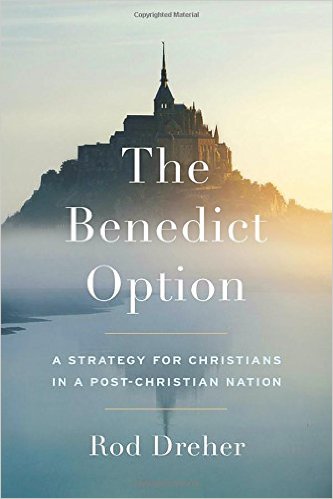 THE BENEDICT OPTION WIDELY DISCUSSED
THE BENEDICT OPTION WIDELY DISCUSSED
I hope you read our last BookNotes newsletter where I explained at least seven things to know about Rod Dreher’s new book, The Benedict Option: A Strategy for Christians in a Post-Christian Nation. I like Rod, appreciate his concerns about the quality and depth of substantive discipleship within our churches although have mixed feelings about his assessment of the culture in these days, in what Charles Taylor calls “a secular age.” As Michael Wear (Reclaiming Hope) said in this panel discussion on the book sponsored by First Things and The Plough it may be that Rod doesn’t adequately grapple with Taylor’s own thesis about the tone of the times (and how it is, oddly, not all utterly secular.) Again, I think James K.A. Smith’s How (Not) to Be Secular is a very helpful, if deep, study of this heady Canadian philosopher and the implications of his work, and Dreher might have pointed readers in his direction.
Further, I have very mixed evaluations of Dreher’s strategy of “limited withdrawal” although (as Andy Crouch very succinctly observed in his “The Benedict Option in Percentages“) too many seem to be obsessed with the “do we head for the hills?” question. There is a whole lot more in the book — both in terms of critical cultural evaluation and in terms of a call for more robust spiritual formation to withstand the pressures of modernity — that deserves our attention. Even (maybe especially) those of us who disagree with his evaluation of the Supreme Court opinion in Obegefell or his proposals about starting alternative classical schools, or even his fretting about cell phones, istuff, on-line culture, and the pace of life these digital days should study his arguments and discern how to respond to his counter-cultural, crunchy con, rallying cry. We have it on sale and can send it right out.
I am sure Rod is heartened by the conversations the book’s release last week has sparked and as an ecumenical bookseller — there’s not that many of us out there, although Rod gives a gloriously nice (and well deserved) shout-out to Warren and his crew at Eighth Day Books in Wichita — I, too, am heartened. To see evangelicals and Episcopalians, Kuyperian Reformed folks and lots of Roman Catholics, reading an Eastern Orthodox lay person talk about The Jesus Prayer and early monasticism and current spiritual formation programs that are more-or-less monastic all to inform how we might think about our public witness is fabulously exciting to me. That the fancy forum in New York (that I linked to above) was sponsored by the rigorously orthodox and socially conservative First Things and the Anabaptist folks from The Bruderhof communities as well as the political journal Rod edits, The American Conservative was just fantastic.
If only Sojourners or Evangelicals for Social Action had been invited. Or somebody like Gary Haugen (Good News About Injustice, Just Courage, The Locust Effect) or Bethany Hanke Hoang (The Justice Calling) or Jena Lee Nardella (One Thousand Wells) or micro-financier Peter Greer (Mission Drift, Entrepreneurship for Human Flourishing, The Spiritual Danger of Doing Good) or urban pastor Mark Gornik (To Live in Peace) or racial reconciliation leader John Perkins (and his brand new book Dream with Me: Race, Love, and the Struggle We Must Win)
or evangelical (and Republican, btw) creation-care activist Mitch Hescox (Caring for Creation) were asked to respond to Rod’s big pitch. Man, I wish they’d have had Lisa Sharon Harper (The Very Good Gospel) talking about what, exactly, is good news. I’d like to hear from these kinds of front line activists who are called to the world in urgent ministries of relief, development, peacemaking and justice. We know (because he says it all the time, in the book and in his talks) that he cares about racial injustice and about concern for the poor; yet, still, his “hunker down” in an “ark” lingo seems not to imply as much. It leads to what I called in my review as a “mixed message.”
Kudos to the First Things/Plough forum for having Jacqueline C. Rivers on the panel; she not only brought the voice of a woman and African American but knows well about street level ministries of social transformation. She and her husband, Eugene Rivers, have done remarkable work with gangs in the harshest urban settings. They also have experimented with intentional community and, influenced by historic black Pentecostalism, know better than most about the power of God in bringing healing and hope to the hurting and marginalized. They have experienced some of the attacks Rod talks about in his book because — despite their radical justice stance and nonviolent work with street gangs — they are, it seems, fairly conventional in their views of sexuality. Alas, their justice work is attacked by the hard left…
But, this is good, having these various views and voices responding to Rod’s important book.
Which, again, is to say that we at Hearts & Minds are thrilled seeing stuff we so deeply care about – ecumenism, spiritual and contemplative formation, cultural analysis, social concern, in intentional community – coming together in the panels and forums and articles and reviews popping up all over around The Benedict Option.
As you might guess, I’ve got a ton of books I want to offer alongside any reading of The Benedict Option or any proposals about the movement the hip ones are calling the BenOp. I snuck plenty of them into my own review last week — mentioning in passing books by Andy Crouch, Steve Garber, Makoto Fujimura, Richard Mouw, Brian Walsh, Jamie Smith, N.T. Wright, Os Guinness, James Davidson Hunter — and I am adamant that books by these authors are simply must-reads in this or any age.
And, I’d also say that if I were to convene a panel or discussion about The Benedict Option book and movement, I’d love to hear how anyone can imagine as faithful even a “limited withdrawal” strategy 

BOOKS ABOUT SPIRITUAL FORMATION AND DEEP HOLINESS
For now, though, it strikes me that it might be more helpful for most BookNotes readers – who know well our advocacy for the aforementioned titles about worldview and culture and social renewal — to list some books about Benedict of Nursia, Benedictine spirituality, and the ways some contemporary authors are inviting us to a neo-monastic lifestyle. This has been a thing for decades, inspired by the likes of Thomas Merton, Henri Nouwen, Richard Foster and, recently, Ruth Haley Barton, and while they may not be the sort Dreher likes, many of us might be happy to know there are books like My Mini-Van is My Monastery. Not driven by a reaction to political pressures, not emerging from anxieties about the culture, these authors – like Dreher’s book at its best – are not giving us tools only to resist the secularization of 21st century life or practices that are weapons to covertly fight some culture wars but are merely saying this is the best way to life the Christian life. We all need a dose spirituality as taught by some monks and religious and we all need a dose of community, accountability, maybe even the habit of submitting to a rule of life.
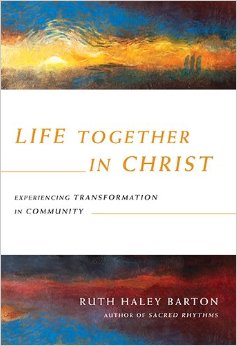
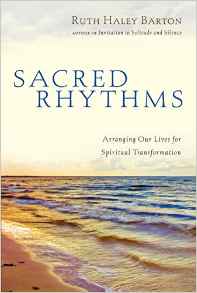 If any of this speaks to you but you’ve not read anything along these lines, I suggest you might start with Sacred Rhythms: Arranging our Lives for Spiritual Transformation by Ruth Haley Barton (IVP; $19.00) and her great book about doing these classic practices in community, with others, Life Together in Christ: Experiencing Transformation in Community (IVP; $18.00.) Or, somewhat deeper, the true classic Celebration of Discipline: The Path to Spiritual Growth by Richard J. Foster (HarperSanFrancisco; $25.99.) Perhaps you could use the marvelously rich and very helpfully arranged and annotated books by Foster Spiritual Classics and/or Devotional Classics (both published by Harper; $17.99 each.) All of these are influenced, naturally, by Benedict, but none are exclusively Benedictine.
If any of this speaks to you but you’ve not read anything along these lines, I suggest you might start with Sacred Rhythms: Arranging our Lives for Spiritual Transformation by Ruth Haley Barton (IVP; $19.00) and her great book about doing these classic practices in community, with others, Life Together in Christ: Experiencing Transformation in Community (IVP; $18.00.) Or, somewhat deeper, the true classic Celebration of Discipline: The Path to Spiritual Growth by Richard J. Foster (HarperSanFrancisco; $25.99.) Perhaps you could use the marvelously rich and very helpfully arranged and annotated books by Foster Spiritual Classics and/or Devotional Classics (both published by Harper; $17.99 each.) All of these are influenced, naturally, by Benedict, but none are exclusively Benedictine.
If Dreher’s BenOp project is not mostly about cultural withdrawal but enriching the depth of spiritual formation to fund authentic Christian living in our secularized world, we could always recommend books such as The Glorious Pursuit: Embracing the Virtues of Christ by Gary Thomas (NavPress; $14.99) 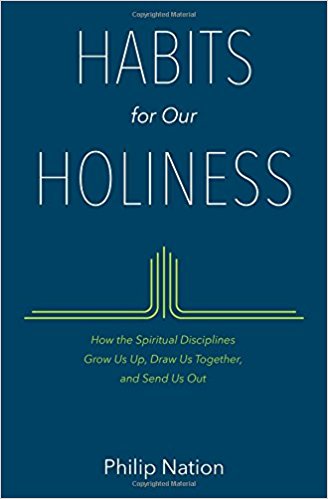
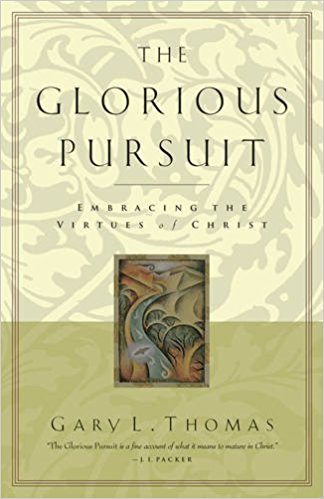 or Habits for Our Holiness: How the Spiritual Disciplines Grow Us Up, Draw Us Together, and Send Us Out by Philip Nation (Moody Press; $14.99.) And we’ve recommended, ad nauseam, you might think, Jamie Smith’s You Are What You Love: The Spiritual Power of Habit (Brazos Press; $19.99.) And Michael Wear, in the link offered above, slide in an excellent reminder about the formative work of Dallas Willard, such as Renovation of the Heart, The Spirit of the Disciplines, or his rather dense The Divine Conspiracy, parts one and two. I hope these kinds of books are the natural next steps for anyone wanting to be more deeply transformed by Christ in order to endure the hardships and quandaries documented in Dreher’s alarming book.
or Habits for Our Holiness: How the Spiritual Disciplines Grow Us Up, Draw Us Together, and Send Us Out by Philip Nation (Moody Press; $14.99.) And we’ve recommended, ad nauseam, you might think, Jamie Smith’s You Are What You Love: The Spiritual Power of Habit (Brazos Press; $19.99.) And Michael Wear, in the link offered above, slide in an excellent reminder about the formative work of Dallas Willard, such as Renovation of the Heart, The Spirit of the Disciplines, or his rather dense The Divine Conspiracy, parts one and two. I hope these kinds of books are the natural next steps for anyone wanting to be more deeply transformed by Christ in order to endure the hardships and quandaries documented in Dreher’s alarming book.
BOOKS ABOUT BENEDICT AND HIS RULE
Here, however, are some books that are not about spiritual formation generally, but specifically about Benedict. If anybody is interested in more of what Rod Dreher is proposing (or perhaps what he ought to be proposing if he is serious about appropriating Benedictine theology and spirituality) these books are worth knowing about. Why don’t you order one or two and commit to reading up? And then find a local monastery and pay them a visit. All are 10% off and you can order them below, or by giving us a call.
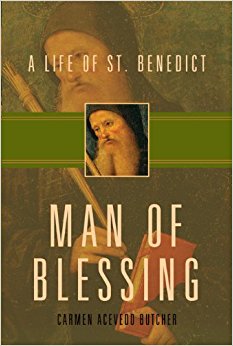 Man of Blessing: A Life of St. Benedict Carmen Acevedo Butcher (Paraclete Press) $21.95 Although not out of print, we have a few of these stellar biographies still in stock. Phyllis Tickle wrote, “Here medievalist Butcher revives the craft of hagiography, but with a twist. Her affection for her subject is as appealing as it is unfailing, but in this gentle retelling of Benedict’s life, it is Butcher’s familiarity with late Roman literature and culture that roots the saint and his miracles in a well-defined time and place.” There was a sixth-century volume called Dialogues about Benedict written by Pope Gregory the Great and this book draws on that, making it an important historical work.
Man of Blessing: A Life of St. Benedict Carmen Acevedo Butcher (Paraclete Press) $21.95 Although not out of print, we have a few of these stellar biographies still in stock. Phyllis Tickle wrote, “Here medievalist Butcher revives the craft of hagiography, but with a twist. Her affection for her subject is as appealing as it is unfailing, but in this gentle retelling of Benedict’s life, it is Butcher’s familiarity with late Roman literature and culture that roots the saint and his miracles in a well-defined time and place.” There was a sixth-century volume called Dialogues about Benedict written by Pope Gregory the Great and this book draws on that, making it an important historical work.
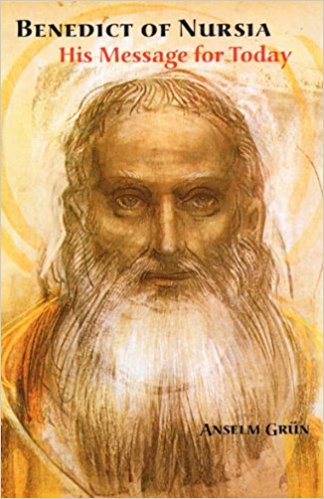 Benedict of Nursia: His Message for Today Anselm Grun (Liturgical Press) $12.95 This is a serious but slim book by one of the great European spiritual writers these days; we carry a number of books, including a few children’s books. This is partially an introductory biography and also a bit of a cultural study suggesting why Benedict’s message resonates so today. He is, by the way, a cellarer, or supplies manager, for his monastery in Germany, so knows much about work, administration, and the like. Maybe he might remind you of Brother Lawrence and his situation, finding God in the kitchen and insisting the pots and pans are holy.
Benedict of Nursia: His Message for Today Anselm Grun (Liturgical Press) $12.95 This is a serious but slim book by one of the great European spiritual writers these days; we carry a number of books, including a few children’s books. This is partially an introductory biography and also a bit of a cultural study suggesting why Benedict’s message resonates so today. He is, by the way, a cellarer, or supplies manager, for his monastery in Germany, so knows much about work, administration, and the like. Maybe he might remind you of Brother Lawrence and his situation, finding God in the kitchen and insisting the pots and pans are holy.
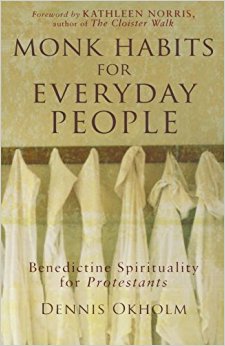 Monk Habits for Everyday People: Benedictine Spirituality for Protestants Dennis Okholm (Brazos Press) $16.00 I am assuming that many who read Rod Dreher’s The Benedict Option
Monk Habits for Everyday People: Benedictine Spirituality for Protestants Dennis Okholm (Brazos Press) $16.00 I am assuming that many who read Rod Dreher’s The Benedict Option
haven’t really studied monastic spirituality all that much; Protestant
or Catholic or Orthodox, we just haven’t taken up these “monk habits”
very carefully, if at all. Of course, the marvelous play on words in
the title of this one tells us much -it isn’t about wearing habits but
about adopting formative practices that Benedictine monks might teach
us. This is a very good book, with a foreword by Kathleen Norris and a
great blurb by historian Mark Noll. This is exactly the sort of thing
Dreher commends and Okholm’s visits have enabled him to interpret
Benedictine spirituality very, very well for those unfamiliar with it.
Okholm was raised as a Pentecostal and Baptist, and now is an
evangelical Presbyterian and a professor of theology. He was deeply
struck the first time he stayed at a Benedictine abbey and found much to
learn for his own personal walk with God, which he has been exploring
for years, now. As it says in the promotional material about the book,
Vital
aspects of devotion, humility, obedience, hospitality, and evangelism
took on new clarity and meaning. Paralleling that experience, Okholm
guides the reader on a focused and instructive journey that can
revitalize the devotional life of any Christian who wants to slow down
and dig deeper.
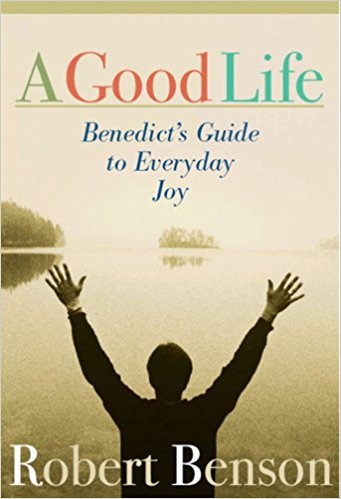 A Good Life: Benedict’s Guide to Everyday Joy Robert
A Good Life: Benedict’s Guide to Everyday Joy Robert
Benson (Paraclete Press) $13.95 I suppose I can’t expect you to
remember the oodles of books we rave about here, but I have, I hope
somebody recalls, often recommended the good work of the eloquent, clear
writer Robert Benson. I have so enjoyed every one of his books, and
commend them all, especially titles like the exquisite Between the Dreaming and the Coming True and Living Prayer and his recent Punching Holes in the Darkness. A Good Life is one we really recommend as maybe the most delightful, short, and wise book about
living well in light of The Rule of Saint Benedict. This is short and sweet, inspiring, ideal for ordinary folks.
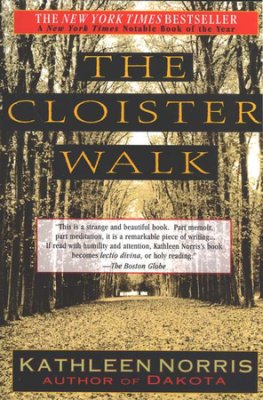 The Cloister Walk Kathleen Norris (Riverhead Books) $16.00 One of the most popular spiritual writers of recent decades, her spiritual memoir, Dakota, capitulated her to fame within mainline denominational circles, especially, but this story of a Presbyterian’s extended stays at a Benedictine monastery is perhaps her best known book. Here, she walks us through what it was like for her, with meditations on the Rule, of course, luminous reflections on the bigger picture of liturgical calendar, but also the ordinary stuff – the monk’s jokes, the food, the sense of time as one is immersed in this alternative world, her love for the liturgy. The Chicago Tribune’s review said, “Norris continues to write plainspoken meditations that expand the purview of non-fiction… She writes about religion with the imagination of a poet…” It is a good read for those who like spiritual autobiography and creative nonfiction, and it’s a very good window into the real world life of a Minnesota Benedictine monastery.
The Cloister Walk Kathleen Norris (Riverhead Books) $16.00 One of the most popular spiritual writers of recent decades, her spiritual memoir, Dakota, capitulated her to fame within mainline denominational circles, especially, but this story of a Presbyterian’s extended stays at a Benedictine monastery is perhaps her best known book. Here, she walks us through what it was like for her, with meditations on the Rule, of course, luminous reflections on the bigger picture of liturgical calendar, but also the ordinary stuff – the monk’s jokes, the food, the sense of time as one is immersed in this alternative world, her love for the liturgy. The Chicago Tribune’s review said, “Norris continues to write plainspoken meditations that expand the purview of non-fiction… She writes about religion with the imagination of a poet…” It is a good read for those who like spiritual autobiography and creative nonfiction, and it’s a very good window into the real world life of a Minnesota Benedictine monastery.
You may want to know that Kathleen Norris partnered with the wonderfully beloved, Catholic, children’s book writer and illustrator Tomie dePaola to do a wonderful children’s picture book called The Holy Twins: Benedict and Scholastica, which is so sadly out of print. Yep, Benedict was a twin and his sister Scholastica is an important figure in her own right.

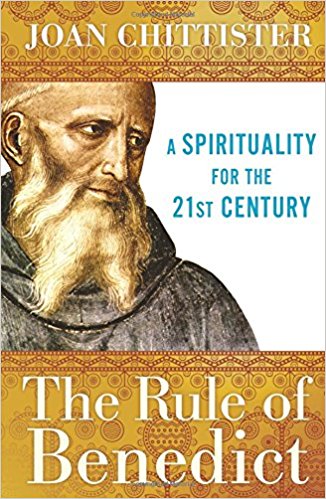 The Rule of Benedict: A Spirituality for the 21st Century Joan Chittister (Crossroad Publishing Co.) $16.95 This is a book that looks very nice, and is nice to use. There are photographs throughout – some rather sepia toned, most full color, but not glitzy – and red ink on the title pages. It’s a nice paperback that comes with a website that allows you to listen to Gregorian chants and other music apparently designed especially for this book. It is a full translation of the rule, and the lovely meditations by Sister Joan on them. It is just over 300 pages, so you get a lot of her ruminations, from the point of view of a pretty activist Catholic nun. She knew Dorothy Day, she has met Oscar Romero, she is a living legend in some circles, so she is worth reading, even if her vision of living the Rule is a bit less strict or stuffy than some…
The Rule of Benedict: A Spirituality for the 21st Century Joan Chittister (Crossroad Publishing Co.) $16.95 This is a book that looks very nice, and is nice to use. There are photographs throughout – some rather sepia toned, most full color, but not glitzy – and red ink on the title pages. It’s a nice paperback that comes with a website that allows you to listen to Gregorian chants and other music apparently designed especially for this book. It is a full translation of the rule, and the lovely meditations by Sister Joan on them. It is just over 300 pages, so you get a lot of her ruminations, from the point of view of a pretty activist Catholic nun. She knew Dorothy Day, she has met Oscar Romero, she is a living legend in some circles, so she is worth reading, even if her vision of living the Rule is a bit less strict or stuffy than some…
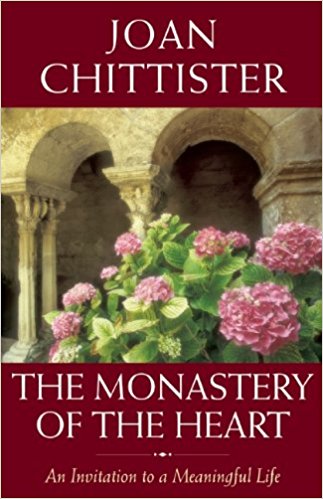 The Monastery of the Heart: An Invitation to a Meaningful Life Joan Chittister (BlueBridge) $13.95 This book is mostly written as loose, poetic reflections and will appeal to those who want a gentle, spiritual reflection. Again, the late Phyllis Tickle wrote, “This marvel of a book sings in the heart and makes the mind quiet with reverence, even as it instructs both with a holy gladness.” Sister Joan has written bunches of books and in this one she poetically reminds us of the central truth that our search for a meaningful life must be connected to this life, our daily life. She evokes Benedict’s Rule as she ruminates on our search, our interior life, our community, our service, our promise, and our spiritual growth. Lovely.
The Monastery of the Heart: An Invitation to a Meaningful Life Joan Chittister (BlueBridge) $13.95 This book is mostly written as loose, poetic reflections and will appeal to those who want a gentle, spiritual reflection. Again, the late Phyllis Tickle wrote, “This marvel of a book sings in the heart and makes the mind quiet with reverence, even as it instructs both with a holy gladness.” Sister Joan has written bunches of books and in this one she poetically reminds us of the central truth that our search for a meaningful life must be connected to this life, our daily life. She evokes Benedict’s Rule as she ruminates on our search, our interior life, our community, our service, our promise, and our spiritual growth. Lovely.
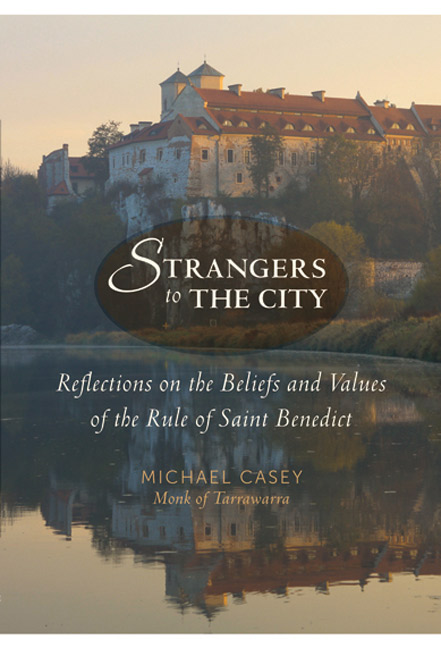 Strangers to the City: Reflections on the Beliefs and Values of the Rule of Saint Benedict Michael Casey (Paraclete Press) $15.95 Casey is a Cistercian Monk of Tarrawarra (in Australia) and has written here an eloquent and incisive overview of the distinctive path of St. Benedict. Casey is one of the leading experts on monastic spirituality (and we have stocked other books of his for years.) This includes thoughtful reflections on the values of asceticism, silence, leisure, reading, chastity, and poverty, “placing each of these ancient beliefs in a vibrant, contemporary context.” This is part of the publisher’s “Voice From the Monastery Series” and it is truly excellent. Highly recommended.
Strangers to the City: Reflections on the Beliefs and Values of the Rule of Saint Benedict Michael Casey (Paraclete Press) $15.95 Casey is a Cistercian Monk of Tarrawarra (in Australia) and has written here an eloquent and incisive overview of the distinctive path of St. Benedict. Casey is one of the leading experts on monastic spirituality (and we have stocked other books of his for years.) This includes thoughtful reflections on the values of asceticism, silence, leisure, reading, chastity, and poverty, “placing each of these ancient beliefs in a vibrant, contemporary context.” This is part of the publisher’s “Voice From the Monastery Series” and it is truly excellent. Highly recommended.
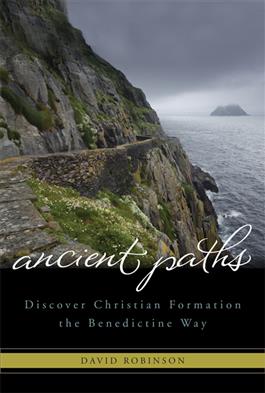 Ancient Paths: Discover Christian Formation the Benediction Way David Robinson (Paraclete Press) $16.99 I reviewed this wonderful book when it first came out, saying it was the best book on Benedict that I ever read. Robinson has advanced theological degrees from Fuller and is a Presbyterian pastor in Oregon. He is a Benedictine oblate of Mount Angel Abbey. Maybe it is Presbyterian impulses, but he helps everyone apply Benedict’s spirituality in their own setting.
Ancient Paths: Discover Christian Formation the Benediction Way David Robinson (Paraclete Press) $16.99 I reviewed this wonderful book when it first came out, saying it was the best book on Benedict that I ever read. Robinson has advanced theological degrees from Fuller and is a Presbyterian pastor in Oregon. He is a Benedictine oblate of Mount Angel Abbey. Maybe it is Presbyterian impulses, but he helps everyone apply Benedict’s spirituality in their own setting.
Brother Benet Tvedten, a Benedictine, and author of the delightful How to Be a Monastic and Not Leave your Day Job, writes of it:
Whether you are engaged in public office or business or a member of AA or a local parish, Ancient Paths applies the values of St. Benedict’s sixth-century monastic Rule to your circumstances in modern life. This author is a pathfinder.
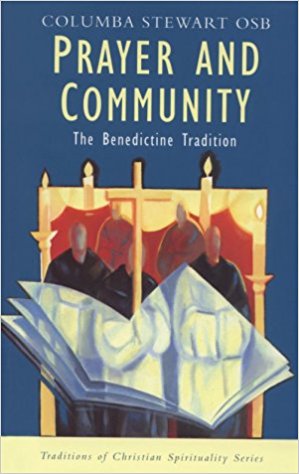 Prayer and Community: The Benedictine Tradition Columba Stewart, OSB (Orbis Press) $18.00 Orbis Press has done a remarkable job offering a major set of books that summarize, clarify, and teach about various religious traditions within the big Body of Christ. From Pentecostals to Quakers, Cistercians to Anglicans, Reformed to Salesian, Wesleyan to Franciscan, this series of books provides a great way to dip in to the broader streams of Christian faith, learning a bit about others we may hear of but not quite understand their distinctives. The large series is edited by the excellent and insightful Phillip Sheldrake; this one is written by a Benedictine monk of St. John’s Abbey who teaches Monastic Studies at St. John’s University in Collegeville, Minnesota. (Stewart, by the way, has a major work on the monk Cassian and another on the desert fathers.) Brief and useful.
Prayer and Community: The Benedictine Tradition Columba Stewart, OSB (Orbis Press) $18.00 Orbis Press has done a remarkable job offering a major set of books that summarize, clarify, and teach about various religious traditions within the big Body of Christ. From Pentecostals to Quakers, Cistercians to Anglicans, Reformed to Salesian, Wesleyan to Franciscan, this series of books provides a great way to dip in to the broader streams of Christian faith, learning a bit about others we may hear of but not quite understand their distinctives. The large series is edited by the excellent and insightful Phillip Sheldrake; this one is written by a Benedictine monk of St. John’s Abbey who teaches Monastic Studies at St. John’s University in Collegeville, Minnesota. (Stewart, by the way, has a major work on the monk Cassian and another on the desert fathers.) Brief and useful.
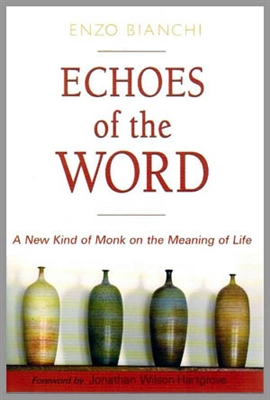 Echoes of the Word: A New Kind of Monk on the Meaning of Life Enzo Bianchi (Paraclete Press) $15.99 Enzo Bianchi was a young Catholic layperson when he founded an ecumenical monastery in Italy called the Bose Community in 1965. He is still the prior there and his books have been translated into many languages. Jonathan Wilson-Hartgove (a Baptist who has written widely about Benedict and his Rule of Life) says:
Echoes of the Word: A New Kind of Monk on the Meaning of Life Enzo Bianchi (Paraclete Press) $15.99 Enzo Bianchi was a young Catholic layperson when he founded an ecumenical monastery in Italy called the Bose Community in 1965. He is still the prior there and his books have been translated into many languages. Jonathan Wilson-Hartgove (a Baptist who has written widely about Benedict and his Rule of Life) says:
This is a different kind of spiritual book… reading this book has felt to me like visiting my dear amma just days before her death. I feel like I’m listening to someone who knows me in my innermost parts. I feel like I’m in the presence of someone who is really alive. And it makes me want to go deeper — to tap into the same living water from which this abba drinks.
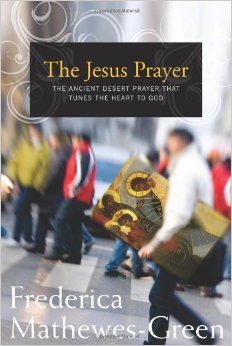 The Jesus Prayer: The Ancient Desert Prayer That Tunes the Heart to God Frederica Mathewes-Green (Paraclete Pres) $18.99 We had the great joy of hearing Frederica again last week at an event at the Roman Catholic Diocese offices in Harrisburg (thanks Fresh Expressions) and we were reminded how much we appreciate her clear, sensible writing. The Jesus Prayer is not particularly Benedictine (having its origins much earlier) but Rod mentions it from time to time, even in his wonderful memoir How Dante Saved My Life. His Orthodox pastor had him learn to recite this prayer and you may have heard Dreher mention this in one of the discussion questions at the Trinity Forum presentation to which we had linked on Facebook. Anyway, this is a good overview of this most mysterious, simple prayer of Eastern Christianity. A conversational question-and-answer format takes the reader through practical steps for adopting this profound practice in everyday life.
The Jesus Prayer: The Ancient Desert Prayer That Tunes the Heart to God Frederica Mathewes-Green (Paraclete Pres) $18.99 We had the great joy of hearing Frederica again last week at an event at the Roman Catholic Diocese offices in Harrisburg (thanks Fresh Expressions) and we were reminded how much we appreciate her clear, sensible writing. The Jesus Prayer is not particularly Benedictine (having its origins much earlier) but Rod mentions it from time to time, even in his wonderful memoir How Dante Saved My Life. His Orthodox pastor had him learn to recite this prayer and you may have heard Dreher mention this in one of the discussion questions at the Trinity Forum presentation to which we had linked on Facebook. Anyway, this is a good overview of this most mysterious, simple prayer of Eastern Christianity. A conversational question-and-answer format takes the reader through practical steps for adopting this profound practice in everyday life.
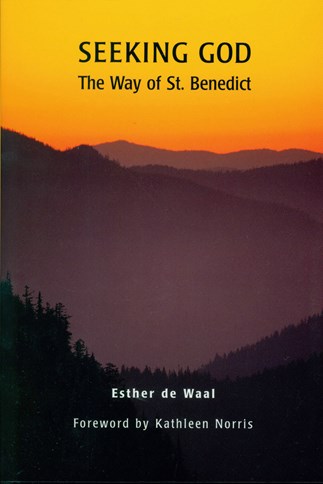 Seeking God: The Way of St. Benedict Esther de Waal (Liturgical Press) $14.99 Esther de Waal is widely recognized as one of the wise, gentle writers about Benedict and we stock many of her books. One reviewer says that she was “one of the pioneers in applying Benedictine spirituality to life outside of the monasteries. She herself is an “Anglican lay woman, married with four sons and a number of grandchildren. She lives on the Welsh Borders where she grew up and spends her time gardening, writing, traveling, and taking retreats. She became interested in Benedictine monasticism as a result of living for ten years in Canterbury and has written several books on the Rule… She holds a PhD. from Cambridge and was given an honorary doctorate from St. John’s University for her contribution to Benedictine studies and for her ecumenical work. She was awarded the Templeton Prize for having started the Benedictine Experience weeks which are now widely held throughout America and England.” This second edition, by the way, has a very supportive and eloquent foreword by Kathleen Norris, author of, among other wonderful memoirs, The Cloister Walk.
Seeking God: The Way of St. Benedict Esther de Waal (Liturgical Press) $14.99 Esther de Waal is widely recognized as one of the wise, gentle writers about Benedict and we stock many of her books. One reviewer says that she was “one of the pioneers in applying Benedictine spirituality to life outside of the monasteries. She herself is an “Anglican lay woman, married with four sons and a number of grandchildren. She lives on the Welsh Borders where she grew up and spends her time gardening, writing, traveling, and taking retreats. She became interested in Benedictine monasticism as a result of living for ten years in Canterbury and has written several books on the Rule… She holds a PhD. from Cambridge and was given an honorary doctorate from St. John’s University for her contribution to Benedictine studies and for her ecumenical work. She was awarded the Templeton Prize for having started the Benedictine Experience weeks which are now widely held throughout America and England.” This second edition, by the way, has a very supportive and eloquent foreword by Kathleen Norris, author of, among other wonderful memoirs, The Cloister Walk.
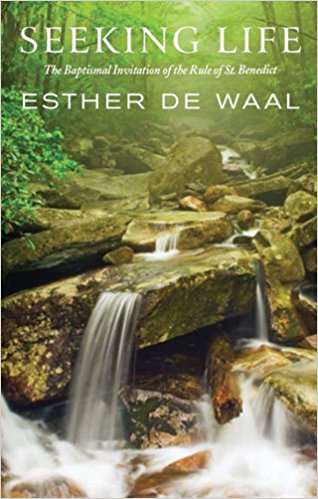 Seeking Life: The Baptismal Invitation of the Rule of St. Benedict Esther de Waal (Liturgical Press) $19.95 This is a very nice book, a small, handsome hardback, that focuses on the prologue to the Rule of Saint Benedict, explaining how it contains “the clues we need to both understand and live by the vows made at our baptism.” Parts of the Rule are actually believed to be based on addresses given to those about to be – or maybe who had recently been – baptized; they are a practical guide to “choosing the road that leads to life.” There’s a lovely long endorsement on the back by Alan Jones. Very impressive.
Seeking Life: The Baptismal Invitation of the Rule of St. Benedict Esther de Waal (Liturgical Press) $19.95 This is a very nice book, a small, handsome hardback, that focuses on the prologue to the Rule of Saint Benedict, explaining how it contains “the clues we need to both understand and live by the vows made at our baptism.” Parts of the Rule are actually believed to be based on addresses given to those about to be – or maybe who had recently been – baptized; they are a practical guide to “choosing the road that leads to life.” There’s a lovely long endorsement on the back by Alan Jones. Very impressive.
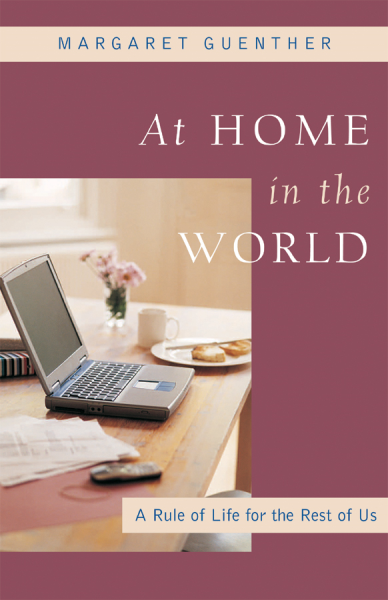 At Home in the World: A Rule of Life for the Rest of Us Margaret Guenther (Seabury Books) $16.00 Anyone familiar with the literature of spiritual formation will know Guenther’s name -her Holy Listening is ca classic. This includes ancient and contemporary takes on the classic monastic vows of poverty, chastity and obedience (in the first half of the book) which is then followed up with a series of shorter essays on “the essentials” for devising a rule of life of your own. This is informed by Benedict’s rule but she isn’t attempting to cling to it, but draw on a variety of monastic rules, insights from various disciplines, encouraging us to find some guidelines for helping us navigate our lives well. Although Guenther visits monasteries often and is a sought after spiritual retreat leader, she writes also as a wife, mother, grandmother, professor, mentor and Episcopal priest.
At Home in the World: A Rule of Life for the Rest of Us Margaret Guenther (Seabury Books) $16.00 Anyone familiar with the literature of spiritual formation will know Guenther’s name -her Holy Listening is ca classic. This includes ancient and contemporary takes on the classic monastic vows of poverty, chastity and obedience (in the first half of the book) which is then followed up with a series of shorter essays on “the essentials” for devising a rule of life of your own. This is informed by Benedict’s rule but she isn’t attempting to cling to it, but draw on a variety of monastic rules, insights from various disciplines, encouraging us to find some guidelines for helping us navigate our lives well. Although Guenther visits monasteries often and is a sought after spiritual retreat leader, she writes also as a wife, mother, grandmother, professor, mentor and Episcopal priest.
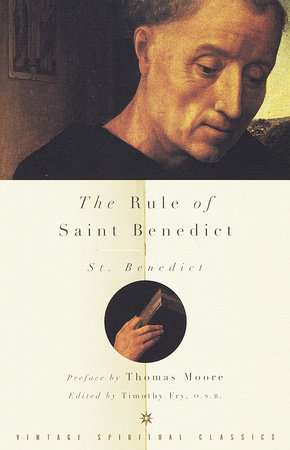 The Rule of Saint Benedict St. Benedict of Nursia (Vintage) $13.95 I don’t know anything about the translation from the original Latin but this seems to be a very reliable edition, the one most people enjoy, with a cool, classy cover. It was edited by Timothy Fry (who translated the famous RB1980) and there is an interesting foreword by Thomas Moore. Highly recommended. By the way, there are bunches in this “Vintage Spiritual Classics” series with uniform covers, from Augustine to the Desert Fathers to Francis to Calvin and Luther. Nicely done.
The Rule of Saint Benedict St. Benedict of Nursia (Vintage) $13.95 I don’t know anything about the translation from the original Latin but this seems to be a very reliable edition, the one most people enjoy, with a cool, classy cover. It was edited by Timothy Fry (who translated the famous RB1980) and there is an interesting foreword by Thomas Moore. Highly recommended. By the way, there are bunches in this “Vintage Spiritual Classics” series with uniform covers, from Augustine to the Desert Fathers to Francis to Calvin and Luther. Nicely done.
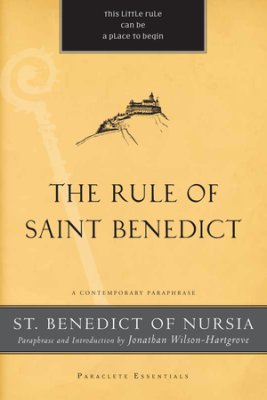 The Rule of Saint Benedict: A Contemporary Paraphrase St. Benedict of Nursia; paraphrased and introduced by Jonathan Wilson-Hartgrove (Paraclete Press) $13.99 This slim volume is in the publishers’ “Paraclete Essentials” series which offers nice paraphrases of classic texts coupled with extensive notes and advise about contemporary application. Jonathan Wilson-Hartgrove graduated from Eastern University where he was pals with Shane Claiborne; he and his wife started Rutba House, one of a network of intentional communities committed to sharing life with those on the margins of society and forming folks able to be involved in peace and justice work. He is an associate minister at St. John’s Baptist Church in Durham. Perhaps you know Jonathan’s co-authored prayer book Common Prayer: A Liturgy for Ordinary Radicals or his lovely The Wisdom of Stability which draws on Benedictine spirituality quite nicely. Highly recommended.
The Rule of Saint Benedict: A Contemporary Paraphrase St. Benedict of Nursia; paraphrased and introduced by Jonathan Wilson-Hartgrove (Paraclete Press) $13.99 This slim volume is in the publishers’ “Paraclete Essentials” series which offers nice paraphrases of classic texts coupled with extensive notes and advise about contemporary application. Jonathan Wilson-Hartgrove graduated from Eastern University where he was pals with Shane Claiborne; he and his wife started Rutba House, one of a network of intentional communities committed to sharing life with those on the margins of society and forming folks able to be involved in peace and justice work. He is an associate minister at St. John’s Baptist Church in Durham. Perhaps you know Jonathan’s co-authored prayer book Common Prayer: A Liturgy for Ordinary Radicals or his lovely The Wisdom of Stability which draws on Benedictine spirituality quite nicely. Highly recommended.
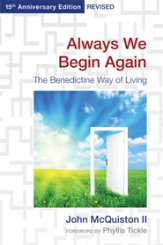 Always We Begin Again: The Benedictine Way of Living John McQuiston (Morehouse) $10.00 This little book is tiny, like a shirt-pocket sized. But it is such a treasure that we sometimes have people buy a bunch to give away. McQuiston has written other nice books on the spirituality of the ordinary, taking a mystical posture into the workworld and finding God in the everyday; here he does a simple paraphase and application of the insights of The Rule. This simple book is described like this: “This book holds timeless appeal for readers who hunger
Always We Begin Again: The Benedictine Way of Living John McQuiston (Morehouse) $10.00 This little book is tiny, like a shirt-pocket sized. But it is such a treasure that we sometimes have people buy a bunch to give away. McQuiston has written other nice books on the spirituality of the ordinary, taking a mystical posture into the workworld and finding God in the everyday; here he does a simple paraphase and application of the insights of The Rule. This simple book is described like this: “This book holds timeless appeal for readers who hunger
for a meaningful and creatively balanced framework for life. It offers a
simple blueprint, based on the Rule of St. Benedict, to order ones time
and create physical and inner space, to step back from the demands and
pressures of the moment, and to step into a place of peace.” Simple, profound, very nice. Released in a 15th anniversary edition a few years back, it now includes a nice little foreword by Phyllis Tickle.
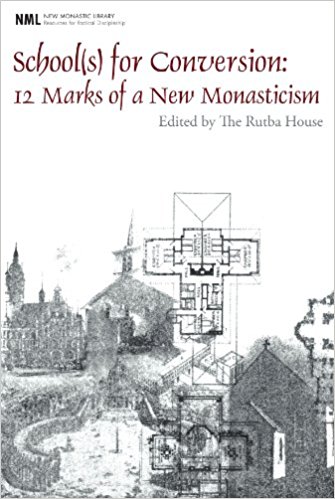 School(s) for Conversion: 12 Marks of a New Monasticism edited by Rutba House (Cascade Books) $24.00 I must restrain myself from saying too much as this may get us a bit farther afield than I want for this post; in a way, this is a lefty/progressive sort of Benedict Option, a call offered a decade ago in this much-discussed manifesto that has generated a handful of intentional communities living together in a world falling apart, serving the poor, standing for justice, and living a deeper spirituality together informed by a Rule of Life. Chapters included pieces by Jonathan Wilson-Hartgrove, Shane Claiborne and others; endorsements are from Berrigan-esque peace activists like Jim Douglas, evangelical mustard seed-sower Tom Sine, Christine Pohl (who wrote Making Room about radical hospitality) and this, from Duke prof Stanley Hauerwas:
School(s) for Conversion: 12 Marks of a New Monasticism edited by Rutba House (Cascade Books) $24.00 I must restrain myself from saying too much as this may get us a bit farther afield than I want for this post; in a way, this is a lefty/progressive sort of Benedict Option, a call offered a decade ago in this much-discussed manifesto that has generated a handful of intentional communities living together in a world falling apart, serving the poor, standing for justice, and living a deeper spirituality together informed by a Rule of Life. Chapters included pieces by Jonathan Wilson-Hartgrove, Shane Claiborne and others; endorsements are from Berrigan-esque peace activists like Jim Douglas, evangelical mustard seed-sower Tom Sine, Christine Pohl (who wrote Making Room about radical hospitality) and this, from Duke prof Stanley Hauerwas:
Whatever future God has for the church, I am convinced the essays in this remarkable book will help us discern that future. Monasticism has always been one of the main means God has used to renew the church. Through some strange miracle God now seems to be calling Protestants to consider what it might mean for them to live in communities that might look very much like monastic communities. Such a call might tempt many toward some kind of romanticism, but one of the remarkable things about these essays is their stark realism. Such a realism is unavoidable not only because of the challenges facing those who are about the formation of communities faithful to God but also because they have lived with one another enough to know this is not going to be easy. So these essays are full of good sense and they help us see the potential of this extraordinary movement. Moreover, each essayist never forgets to remind us that when it’s all said and done, it’s about God who makes it possible for us to live patiently and nonviolently in a world of impatience and violence.
It isn’t exactly Benedictine, but I had to list it… we have each of the several books in the New Monastic Library series.
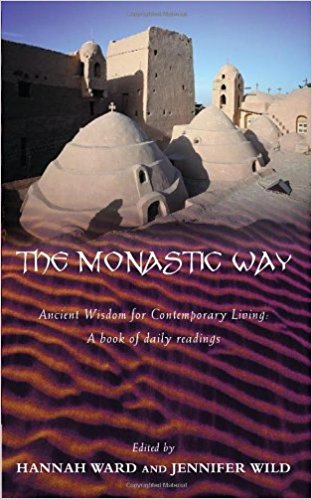 The Monastic Way: Ancient Wisdom for Contemporary Living: A Book of Daily Readings edited by Hannah Ward & Jennifer Wild (Eerdmans) $20.00 First published in the UK and picked by Eerdmans years ago, this book of daily readings brings together short pieces from monks and nuns from a wide variety of Christian spiritual traditions, both Eastern Orthodox and Western. The practicality of this spiritual wisdom shows that the writings of the cloistered are nonetheless nearly universal, writing about things like learning to live with our own and others’ idiosyncrasies or how to cultivate a healthy view of money and possessions or how to find a life-giving balance between work and other sides of life and how to love well. One reviewer said this is “at once practical and sublime.” The two authors have spent part of their lives as members of Anglican religious orders. This is a sturdy, wonderful resource, loaded with words from authors both famous and old monks and ascetics you’ve never heard of.
The Monastic Way: Ancient Wisdom for Contemporary Living: A Book of Daily Readings edited by Hannah Ward & Jennifer Wild (Eerdmans) $20.00 First published in the UK and picked by Eerdmans years ago, this book of daily readings brings together short pieces from monks and nuns from a wide variety of Christian spiritual traditions, both Eastern Orthodox and Western. The practicality of this spiritual wisdom shows that the writings of the cloistered are nonetheless nearly universal, writing about things like learning to live with our own and others’ idiosyncrasies or how to cultivate a healthy view of money and possessions or how to find a life-giving balance between work and other sides of life and how to love well. One reviewer said this is “at once practical and sublime.” The two authors have spent part of their lives as members of Anglican religious orders. This is a sturdy, wonderful resource, loaded with words from authors both famous and old monks and ascetics you’ve never heard of.

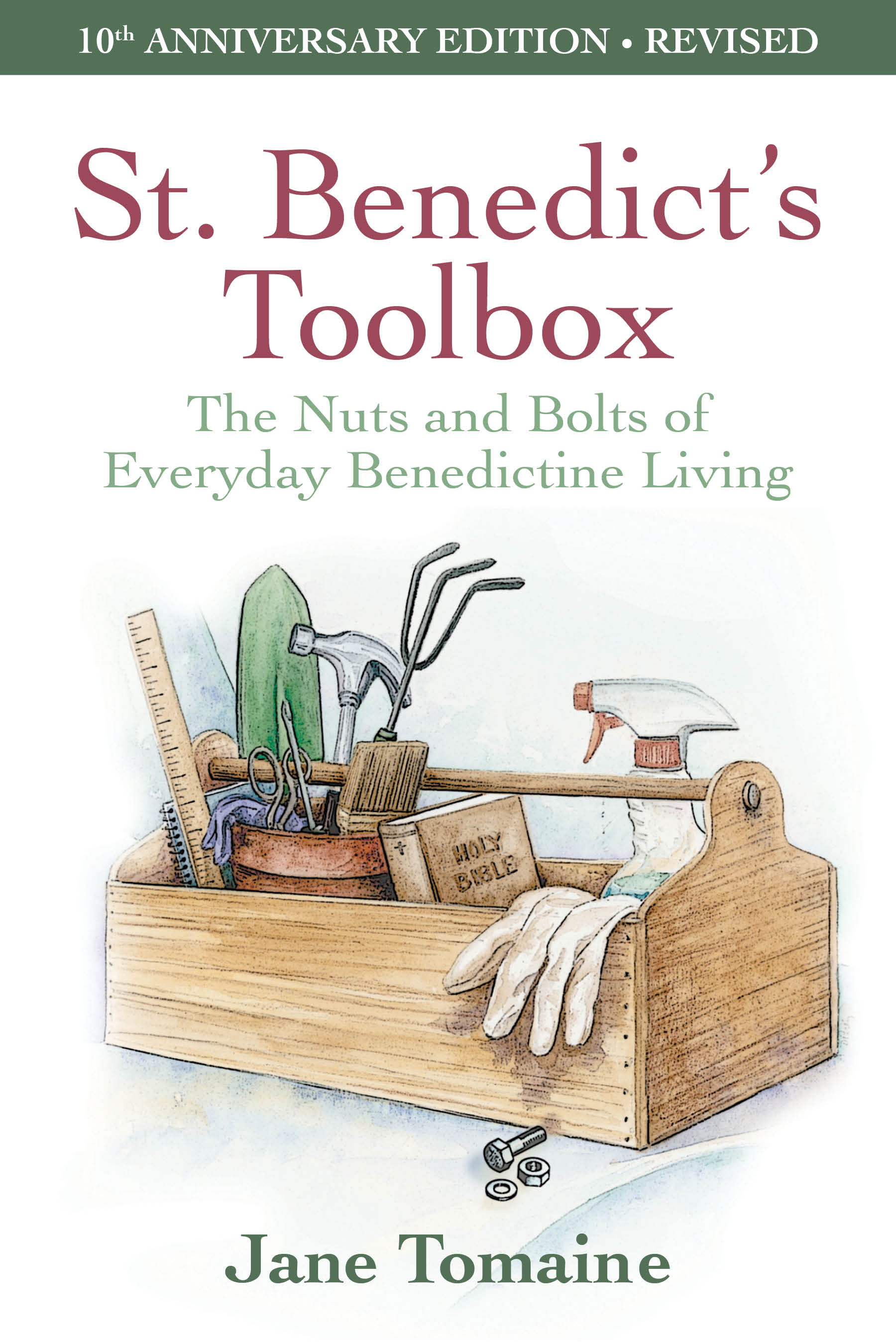 St. Benedict’s Toolbox: The Nuts and Bolts of Everyday Benedictine Living Jane Tomaine (Morehouse Publishing) $24.00 A few years ago this Episcopalian publisher re-issued this in a special “10th anniversary edition” indicating it’s lasting presence; what a lovely, useful books. It’s one of the best introductions we have to the spirit of St. Benedict, helping us all explore how our local congregations and our ordinary lives can be shaped by essential Benedictine ideas.
St. Benedict’s Toolbox: The Nuts and Bolts of Everyday Benedictine Living Jane Tomaine (Morehouse Publishing) $24.00 A few years ago this Episcopalian publisher re-issued this in a special “10th anniversary edition” indicating it’s lasting presence; what a lovely, useful books. It’s one of the best introductions we have to the spirit of St. Benedict, helping us all explore how our local congregations and our ordinary lives can be shaped by essential Benedictine ideas.
We always like the good writing of the popular Barbara Crafton so she is worth hearing; she writes:
Benedict continues to inform Christian life and work; his rule is as fresh and useful for us as it was fifteen hundred years ago. It is not only monks and nuns who benefit from meditating on the Rule — all of us can. Here is an example of such meditation in the truest Benedictine way: practical, realistic, compassionate, and confident in the power of divine love to draw us near.
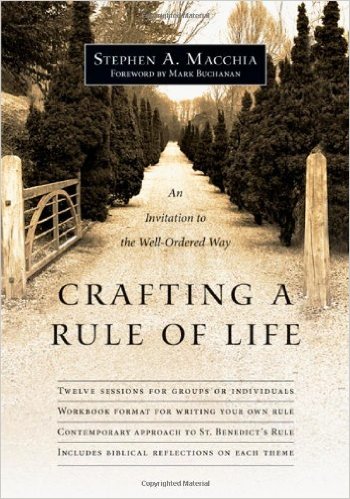 Crafting a Rule of Life: An Invitation to the Well-Ordered Way Stephen A. Macchia (InterVarsity Press) $17.00 This workbook walks us through the reasons for having a personalized “rule of life” and although it is inspired by the Benedictine Rule it isn’t exactly or only about that. It really is a wise workbook for you to consider, work through, interact with, and as you process the material, craft your own rule for your own spiritual benefit. You learn much about the Rule of Saint Benedict but you also are invited to spend time in prayer, reflection on Scripture, and much discernment in order to live out what God is calling you to be and do. Of course, he explores how this can be done in community since we aren’t in this alone. There is a nice foreword by an author I love, Mark Buchanan.
Crafting a Rule of Life: An Invitation to the Well-Ordered Way Stephen A. Macchia (InterVarsity Press) $17.00 This workbook walks us through the reasons for having a personalized “rule of life” and although it is inspired by the Benedictine Rule it isn’t exactly or only about that. It really is a wise workbook for you to consider, work through, interact with, and as you process the material, craft your own rule for your own spiritual benefit. You learn much about the Rule of Saint Benedict but you also are invited to spend time in prayer, reflection on Scripture, and much discernment in order to live out what God is calling you to be and do. Of course, he explores how this can be done in community since we aren’t in this alone. There is a nice foreword by an author I love, Mark Buchanan.
It can be used, by the way, as a 12-week study for a group, or as a personal resource for your own determination of applying St. Benedite’s rule for your own life. Kudos to IVP for bringing this useful tool to us all.
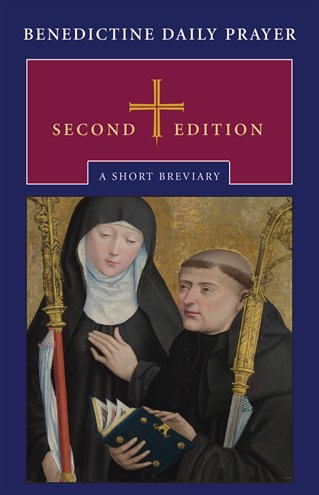 Benedictine Daily Prayer: A Short Breviary compiled and edited by Maxwell Johnson (Liturgical Press) $49.95 This is funny that they call this a “short breviary” as it is over two thousand pages; it is the definitive guide to the prayer practices of Benedictines, using Psalms and hymns and patristic readings. There’s a good guide to it all, six ribbon markers (which you will need) because there are seven daily offices and a lot of page turning. It is considered more “user friendly” than older edition and was compiled by a Lutheran scholar! Just wanted to list this for the record. We, of course, can send it to you or a loved one who wants a very special gift. It comes in a rich leatherflex in a deep burgundy and a beautiful tan.
Benedictine Daily Prayer: A Short Breviary compiled and edited by Maxwell Johnson (Liturgical Press) $49.95 This is funny that they call this a “short breviary” as it is over two thousand pages; it is the definitive guide to the prayer practices of Benedictines, using Psalms and hymns and patristic readings. There’s a good guide to it all, six ribbon markers (which you will need) because there are seven daily offices and a lot of page turning. It is considered more “user friendly” than older edition and was compiled by a Lutheran scholar! Just wanted to list this for the record. We, of course, can send it to you or a loved one who wants a very special gift. It comes in a rich leatherflex in a deep burgundy and a beautiful tan.
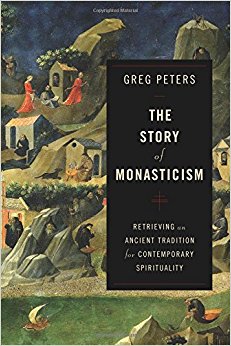 The Story of Monasticism: Retrieving an Ancient Tradition for Contemporary Spirituality Greg Peters (Baker Academic) $22.99 There are several major works tracing the history of various sorts of monasticism within church history and this is doubtlessly the best. Fr. Abbot Denis Farkasfalvy (abbot emeritus of the Cistercian Abbey of Our Lady of Dallas) says, “I have never met a Protestant theologian – evangelical or mainline – who speaks about monastics with as much competence and easy as Greg Peters…” He calls it “an exceptional book and will be an eye-openers for both Protestants and Catholics, laity and clergy alike.”
The Story of Monasticism: Retrieving an Ancient Tradition for Contemporary Spirituality Greg Peters (Baker Academic) $22.99 There are several major works tracing the history of various sorts of monasticism within church history and this is doubtlessly the best. Fr. Abbot Denis Farkasfalvy (abbot emeritus of the Cistercian Abbey of Our Lady of Dallas) says, “I have never met a Protestant theologian – evangelical or mainline – who speaks about monastics with as much competence and easy as Greg Peters…” He calls it “an exceptional book and will be an eye-openers for both Protestants and Catholics, laity and clergy alike.”
It narrates the history of monasticism with verve and clarity, even though this is a massive and sweeping project. There are several chapters under each era, which are broken up into Antony to Benedict, Benedict to Bernard, Bernard to Luther, and, in Part IV, Luther to Merton. There is a fine Epilogue called “Monasticism Today and Tomorrow.” Peters earned his PhD at the University of St. Michael’s College in Toronto, is an Anglican priest and Benedictine oblate and a professor at both the Torrey Honors Institute at Biola and adjunct at St. John’s School of Theology in Minnesota and at Nashotah House Theological Seminary in Wisconsin. Thanks be to God!
BookNotes
DISCOUNT
ANY ITEM MENTIONED
10% off
order here
takes you to the secure Hearts & Minds order form page
just tell us what you want
inquire here
if you have questions or need more information
just ask us what you want to know
Hearts & Minds 234 East Main Street Dallastown, PA 17313
717-246-3333

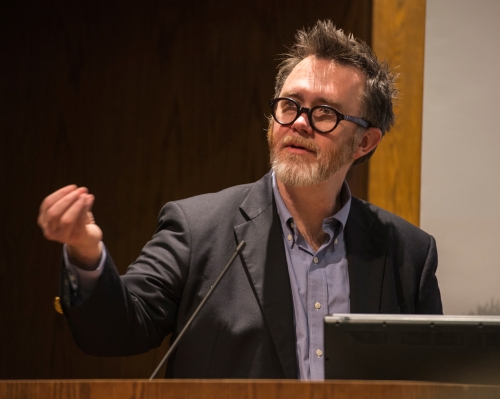 And, for the record, my wife and I met Rod and his wife at a conference book signing a few years ago and had a blast. We laughed and talked and truly enjoyed them a lot. I hope we cross paths again.
And, for the record, my wife and I met Rod and his wife at a conference book signing a few years ago and had a blast. We laughed and talked and truly enjoyed them a lot. I hope we cross paths again.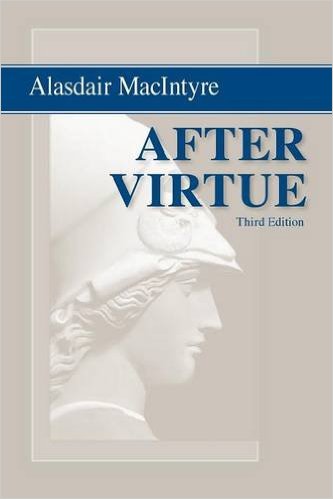 important philosophy books of the last 50 years: After Virtue: A Study in Moral Theology, published by the University of Notre Dame Press.
important philosophy books of the last 50 years: After Virtue: A Study in Moral Theology, published by the University of Notre Dame Press.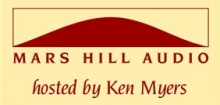

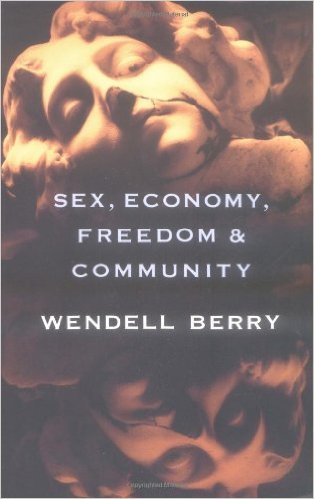 By the way, I have to say in passing that although Rod quotes Wendell several times in The Benedict Option it is selective. He nicely cites Berry’s comments about stability and family and fairly traditional views of sexual fidelity. (In one brilliant essay in Berry’s Sex, Economy, Freedom & Community: Eight Essays – which Lauren Winner so beautifully describes in her book Real Sex: The Hidden Truth about Chastity — Berry explains how consumerism shapes us to want stuff for ourselves, which has less than subtly deformed our views of sexual desire; Ms. Winner says maybe the thing to do to resist her lust and help her learn sexual chastity is to quit going to the mall to buy more sweaters. Learning to say no to American capitalism’s reductionism and deforming of our desires might be a deeper, better practice to help us think differently about a theology of the body and a wholesome view of sex., more serious and radical than evangelicalism’s penchant for morality pledges and purity rings.)
By the way, I have to say in passing that although Rod quotes Wendell several times in The Benedict Option it is selective. He nicely cites Berry’s comments about stability and family and fairly traditional views of sexual fidelity. (In one brilliant essay in Berry’s Sex, Economy, Freedom & Community: Eight Essays – which Lauren Winner so beautifully describes in her book Real Sex: The Hidden Truth about Chastity — Berry explains how consumerism shapes us to want stuff for ourselves, which has less than subtly deformed our views of sexual desire; Ms. Winner says maybe the thing to do to resist her lust and help her learn sexual chastity is to quit going to the mall to buy more sweaters. Learning to say no to American capitalism’s reductionism and deforming of our desires might be a deeper, better practice to help us think differently about a theology of the body and a wholesome view of sex., more serious and radical than evangelicalism’s penchant for morality pledges and purity rings.)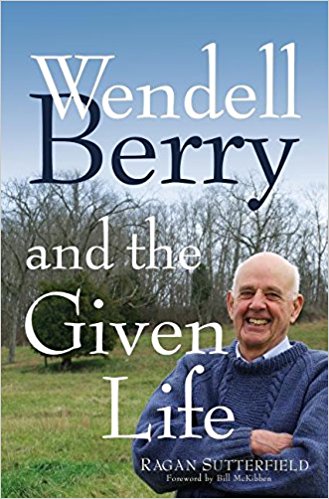
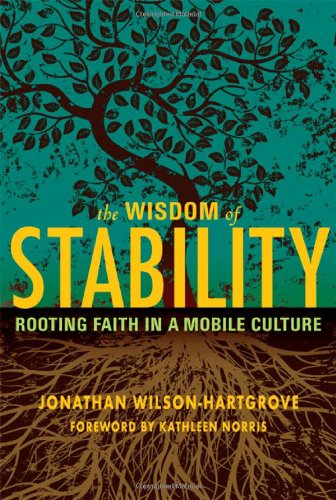
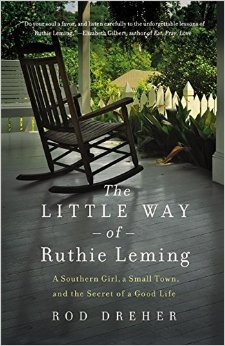
 rulings in favor of marriage equality in our pluralistic society and disagree with him that this is disastrous for Christian discipleship; my own discipleship hasn’t become any more difficult since Obergefell v Hodges; really it hasn’t. I’m still too much of a jerk and always in need of God’s grace, but the Supreme Court ruling didn’t change that one bit. (I found it nearly surreal reading some astonishingly outlandish statements insisting that we can’t even be Christian with such a ruling as Obergefell in our background. This really is a driving force for him; it is, he insists, about “order.” And that’s a theological notion that needs to be more carefully explored, I’d suggest. We know what happens when a movement makes too much of a fetish out of order and fears “disorder.” I’m not suggesting we take lightly dis-order and certainly agree with Rod in his desire to resist whatever the Bible calls sin. But his fear and anxiety about the shift away from order is notable.)
rulings in favor of marriage equality in our pluralistic society and disagree with him that this is disastrous for Christian discipleship; my own discipleship hasn’t become any more difficult since Obergefell v Hodges; really it hasn’t. I’m still too much of a jerk and always in need of God’s grace, but the Supreme Court ruling didn’t change that one bit. (I found it nearly surreal reading some astonishingly outlandish statements insisting that we can’t even be Christian with such a ruling as Obergefell in our background. This really is a driving force for him; it is, he insists, about “order.” And that’s a theological notion that needs to be more carefully explored, I’d suggest. We know what happens when a movement makes too much of a fetish out of order and fears “disorder.” I’m not suggesting we take lightly dis-order and certainly agree with Rod in his desire to resist whatever the Bible calls sin. But his fear and anxiety about the shift away from order is notable.)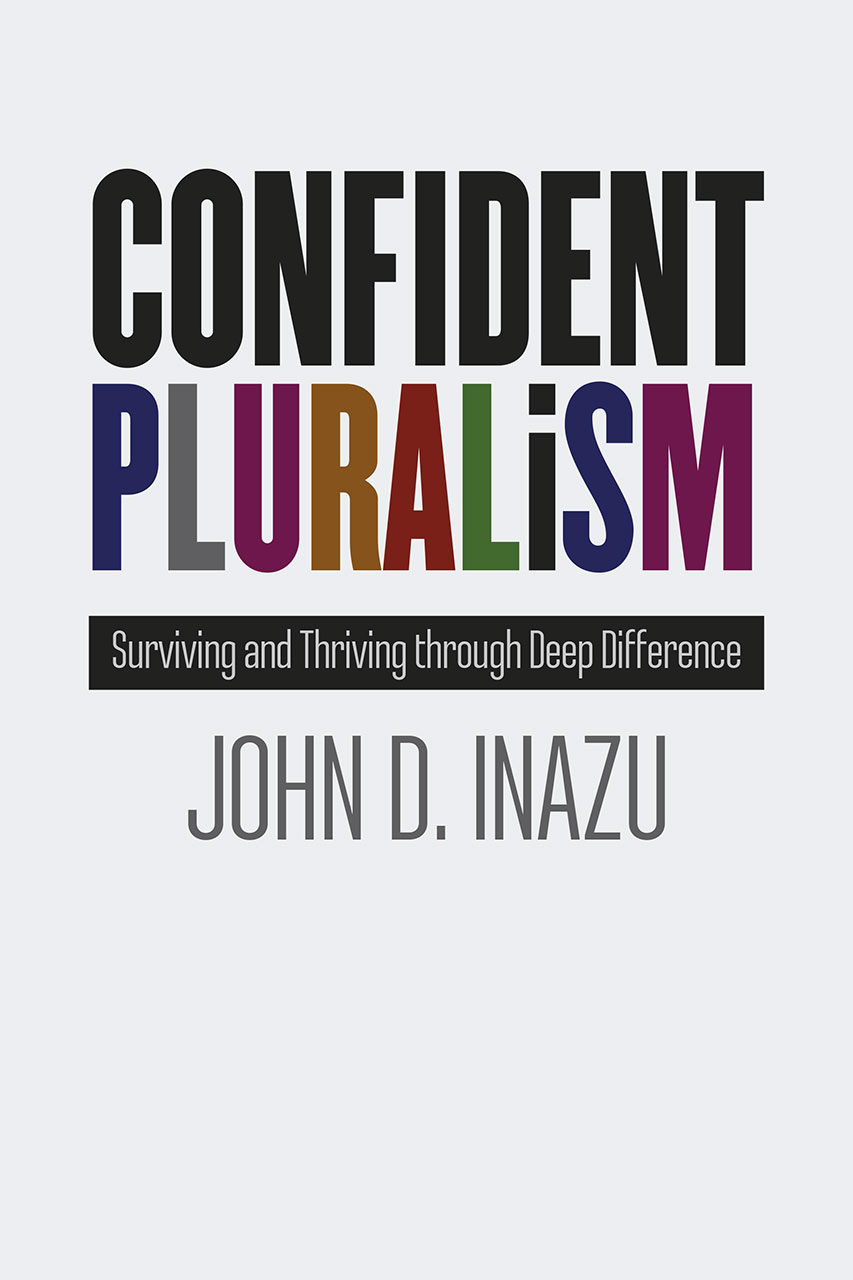
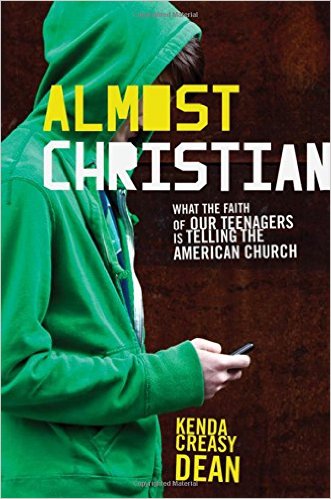 ago, he tells a story about middle school kids watching hard core porn on their cell phones. He laments the number of young women pregnant without the father intending to be involved in the lives of their children. He mentions the unusually high number of middle school girls who announce confidently that they are bi. He describes the shallow sort of religion found in many churches, drawing on the significant work of sociologist Christian Smith (see Soul Searching: The Religious and Spiritual Lives of American Teenagers and Lost in Transition: The Dark Side of Emerging Adulthood, or the very important popularization of that work found in Kenda Creasy Dean’s Almost Christian or even David Kinnaman’s You Lost Me.)
ago, he tells a story about middle school kids watching hard core porn on their cell phones. He laments the number of young women pregnant without the father intending to be involved in the lives of their children. He mentions the unusually high number of middle school girls who announce confidently that they are bi. He describes the shallow sort of religion found in many churches, drawing on the significant work of sociologist Christian Smith (see Soul Searching: The Religious and Spiritual Lives of American Teenagers and Lost in Transition: The Dark Side of Emerging Adulthood, or the very important popularization of that work found in Kenda Creasy Dean’s Almost Christian or even David Kinnaman’s You Lost Me.)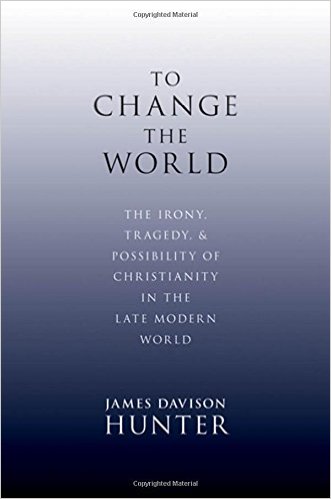 formulations of sexuality and his almost overstated call to “order.” Since he is writing to conservatives to sway them away from culture wars — perhaps almost in the tradition of To Change the World: The Irony, Tragedy, and Possibility of Christianity in the Late Modern World the Oxford University Press book by James Davison Hunter, but with less “in” and more “not of” the world — I get that he doesn’t use the Bible to explain his assumptions. He is not particularly evangelical and makes it clear he is writing firstly as a conservative, albeit a Christian one.
formulations of sexuality and his almost overstated call to “order.” Since he is writing to conservatives to sway them away from culture wars — perhaps almost in the tradition of To Change the World: The Irony, Tragedy, and Possibility of Christianity in the Late Modern World the Oxford University Press book by James Davison Hunter, but with less “in” and more “not of” the world — I get that he doesn’t use the Bible to explain his assumptions. He is not particularly evangelical and makes it clear he is writing firstly as a conservative, albeit a Christian one. 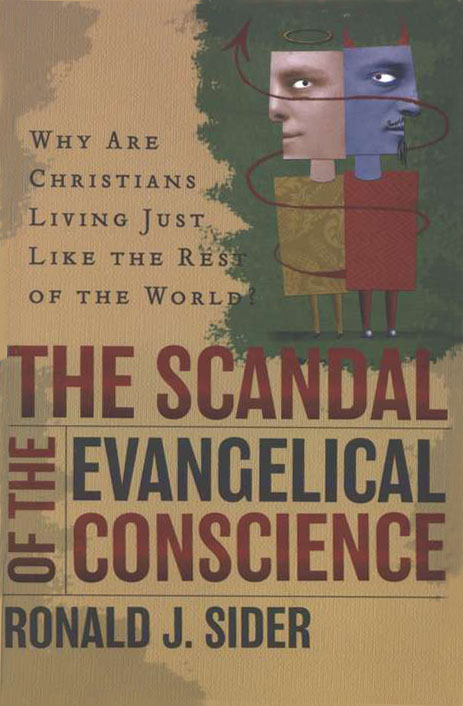
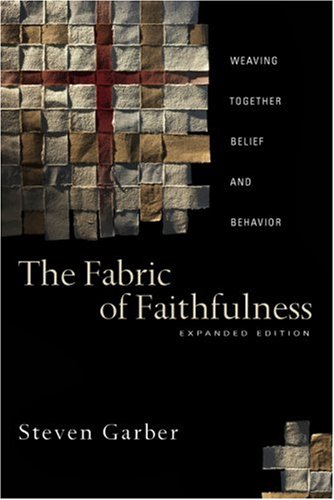
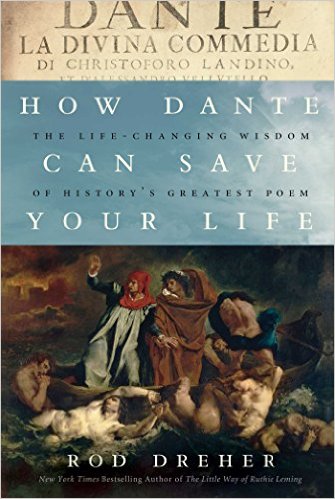 The Benedict Option shows us how to draw on ancient asceticism as a tool to help us keep our digital and media influences at bay. It insists on more active involvement in local churches to keep our spirits alive. Dreher asks us to consider starting alternative study groups, book clubs, young adult discipleship houses, even study centers, to study classical literature, history, poetry, and to allow deep truth to influence our hearts and minds. (He knows how this works somewhat and tells us all about it in the magnificent memoir of how he was somewhat healed of a bad relationship with his father and extended family and moved out of serious depression by reading “The Divine Comedy called How Dante Can Save Your Life which I hope you have ordered from us.)
The Benedict Option shows us how to draw on ancient asceticism as a tool to help us keep our digital and media influences at bay. It insists on more active involvement in local churches to keep our spirits alive. Dreher asks us to consider starting alternative study groups, book clubs, young adult discipleship houses, even study centers, to study classical literature, history, poetry, and to allow deep truth to influence our hearts and minds. (He knows how this works somewhat and tells us all about it in the magnificent memoir of how he was somewhat healed of a bad relationship with his father and extended family and moved out of serious depression by reading “The Divine Comedy called How Dante Can Save Your Life which I hope you have ordered from us.)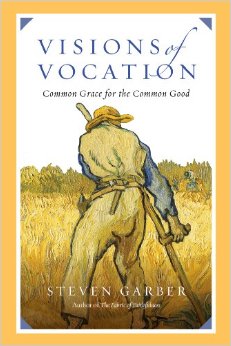
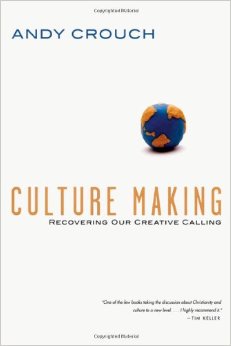
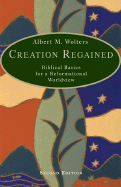
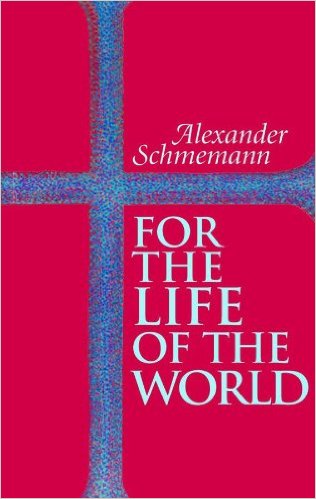
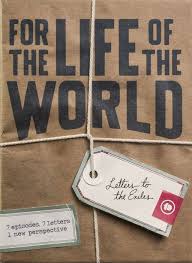
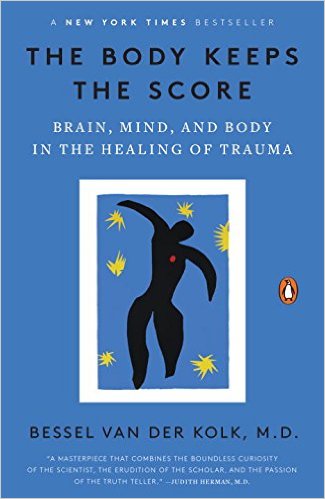 The Body Keeps the Score: Brain, Mind and Body in the Healing of Trauma Bessel Van Der Kolk (Penguin) $18.00 A wondrous, remarkable book by a leading expert on trauma who has pioneered new ways to treat PTSD (including sand trays in children’s therapy) and has helped us all realize new things about the human mind, memory, neuroscience, and pathways to recovery. For anyone concerned about the toll of the cycle of trauma and violence in our society – and about how relationships can be hurtful but also healing — this intense but beautiful book is a must.
The Body Keeps the Score: Brain, Mind and Body in the Healing of Trauma Bessel Van Der Kolk (Penguin) $18.00 A wondrous, remarkable book by a leading expert on trauma who has pioneered new ways to treat PTSD (including sand trays in children’s therapy) and has helped us all realize new things about the human mind, memory, neuroscience, and pathways to recovery. For anyone concerned about the toll of the cycle of trauma and violence in our society – and about how relationships can be hurtful but also healing — this intense but beautiful book is a must. 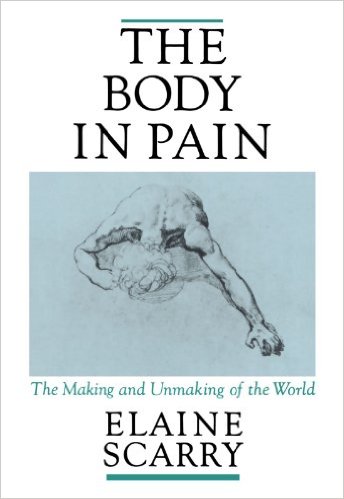 The Body in Pain: The Making and Unmaking of the World Elaine Scarry (Oxford University Press) $19.95 I know more than one person who has recently raved to me about how important this book was for them; it is a dense and complex read, studying chronic pain, trauma, including a major report on research Scarry did in the 1980s (in cooperation with Amnesty International, I believe) on the impact of torture. As a literary critic (a recent book was on the Shakespeare sonnets) she is known for close readings, for good listening, for rich and moving meditations. Susan Sontag calls this “large-spirited, heroically truthful, a necessary book.” Is pain inexpressible? Can it destroy a sufferers language? How do political regimes “unmake” an individual’s world in their exercise of power? And how do we then re-make the world (through act is of creativity that produce language and culture and hope? If you want a book that is perhaps a bit more accessible and not as long, see her beloved work about aesthetics and public justice on Princeton University Press called Beauty and Being Just. That’s a good read any time.
The Body in Pain: The Making and Unmaking of the World Elaine Scarry (Oxford University Press) $19.95 I know more than one person who has recently raved to me about how important this book was for them; it is a dense and complex read, studying chronic pain, trauma, including a major report on research Scarry did in the 1980s (in cooperation with Amnesty International, I believe) on the impact of torture. As a literary critic (a recent book was on the Shakespeare sonnets) she is known for close readings, for good listening, for rich and moving meditations. Susan Sontag calls this “large-spirited, heroically truthful, a necessary book.” Is pain inexpressible? Can it destroy a sufferers language? How do political regimes “unmake” an individual’s world in their exercise of power? And how do we then re-make the world (through act is of creativity that produce language and culture and hope? If you want a book that is perhaps a bit more accessible and not as long, see her beloved work about aesthetics and public justice on Princeton University Press called Beauty and Being Just. That’s a good read any time.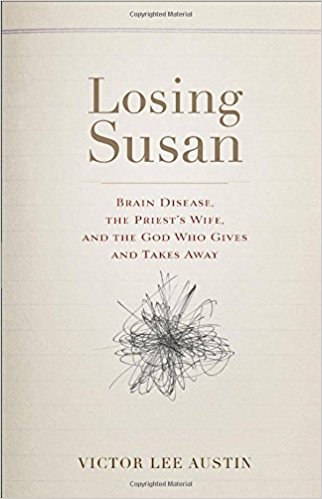 Losing Susan: Brain Disease, The Priest’s Life, and the God Who Gives and Takes Away Victor Lee Austin (Brazos Press) $19.99 We discovered the serious work of this Episcopal priest and social critic when we read Up With Authority, a book about authority structures in society. In this moving, powerful story, the theologian gets personal, telling of his love for his wife, Susan, as he cared for her during her long struggle with brain cancer – and the aftereffects which brought him more “face to face with God” and allowed him to re-evaluate his own faith. Endorsements are from other deep, thoughtful, pastoral theologians such as Robert Jensen and Sam Wells and others who have written about suffering, such as Stanley Hauerwas and Tobias Winright who teaches Health Care Ethics at Saint Louis University who calls it “a moving work, carefully crafted and thoughtfully honest.”
Losing Susan: Brain Disease, The Priest’s Life, and the God Who Gives and Takes Away Victor Lee Austin (Brazos Press) $19.99 We discovered the serious work of this Episcopal priest and social critic when we read Up With Authority, a book about authority structures in society. In this moving, powerful story, the theologian gets personal, telling of his love for his wife, Susan, as he cared for her during her long struggle with brain cancer – and the aftereffects which brought him more “face to face with God” and allowed him to re-evaluate his own faith. Endorsements are from other deep, thoughtful, pastoral theologians such as Robert Jensen and Sam Wells and others who have written about suffering, such as Stanley Hauerwas and Tobias Winright who teaches Health Care Ethics at Saint Louis University who calls it “a moving work, carefully crafted and thoughtfully honest.”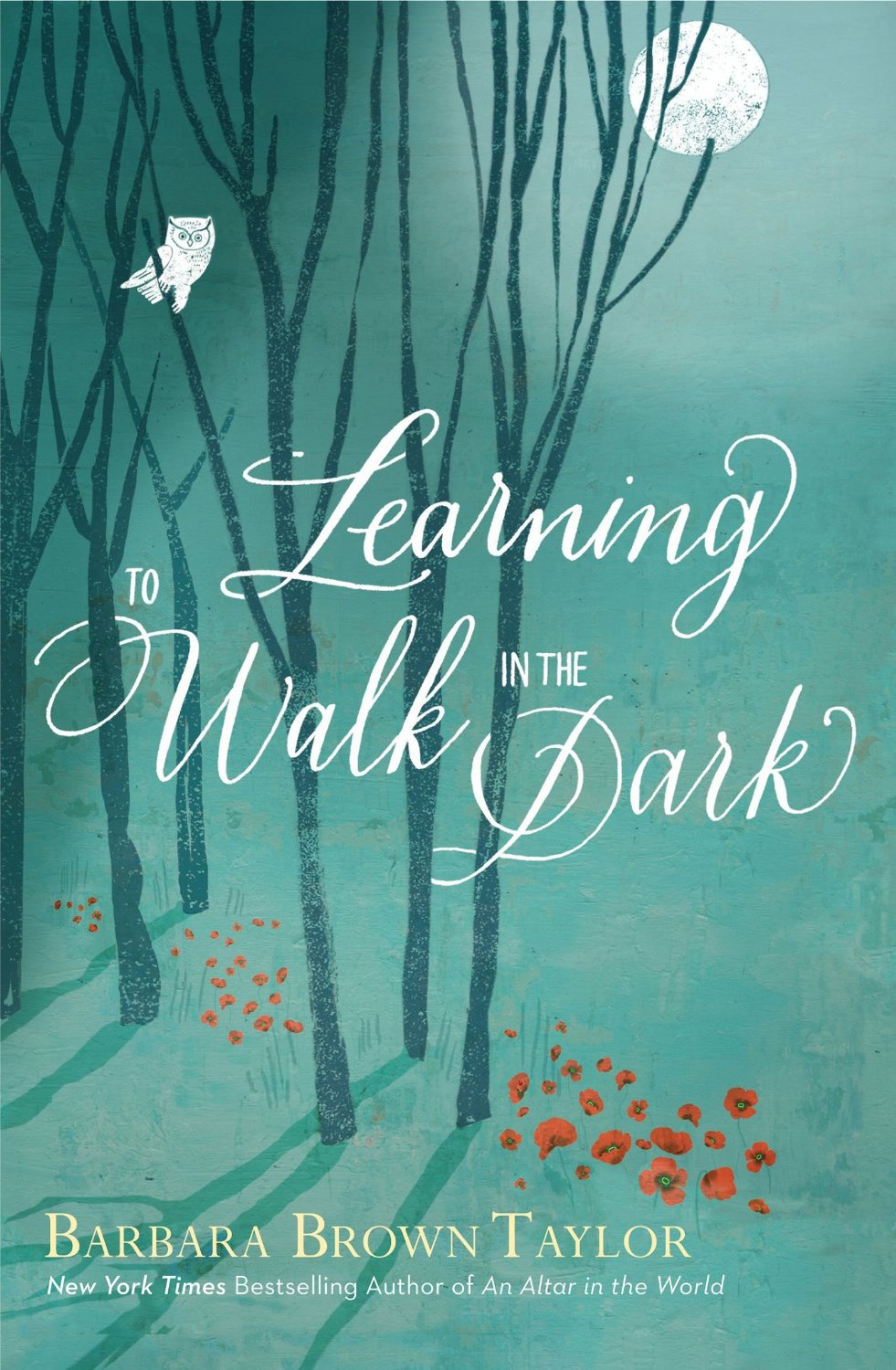 Learning to Walk in the Dark Barbara Brown Taylor (HarperOne) $14.99 It is rare to find someone who doesn’t appreciate Barbara Brown Taylor’s rich prose, her wonderful use of words, her charming tone, even in serious sermons. One of my own all-time favorite books is her brief memoir of coming to Christian faith and discerning a call to the ministry called The Preaching Life (which concludes with some sample sermons, themselves always worth reading. Let us know if you want to make our day by ordering one from us.) But this, her most recent book, is a study of darkness in our lives, literal and metaphorical, explored in the entertaining form of story and memoir, how she came to embrace doubt and darkness, which, in her estimation, isn’t at all a bad thing. From sitting in an utterly dark cave to camping out in the deepest night to attending to some perplexities and pain in her own life, she invites us all to explore this side of life, literally darkness and the “dark night of the soul.”. I loved this book and its quiet blend of charm and provocation and commend it to you during these weeks of Lent.
Learning to Walk in the Dark Barbara Brown Taylor (HarperOne) $14.99 It is rare to find someone who doesn’t appreciate Barbara Brown Taylor’s rich prose, her wonderful use of words, her charming tone, even in serious sermons. One of my own all-time favorite books is her brief memoir of coming to Christian faith and discerning a call to the ministry called The Preaching Life (which concludes with some sample sermons, themselves always worth reading. Let us know if you want to make our day by ordering one from us.) But this, her most recent book, is a study of darkness in our lives, literal and metaphorical, explored in the entertaining form of story and memoir, how she came to embrace doubt and darkness, which, in her estimation, isn’t at all a bad thing. From sitting in an utterly dark cave to camping out in the deepest night to attending to some perplexities and pain in her own life, she invites us all to explore this side of life, literally darkness and the “dark night of the soul.”. I loved this book and its quiet blend of charm and provocation and commend it to you during these weeks of Lent.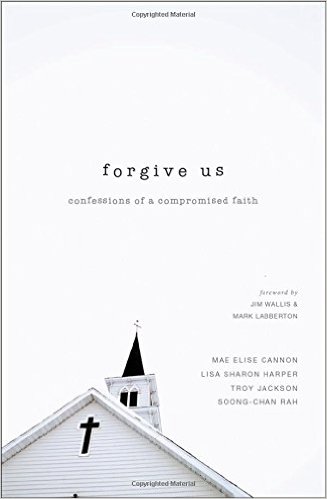 Forgive Us: Confessions of a Compromised Faith Mae Elise Cannon, Lisa Sharon Harper, Troy Jackson, Soong-Chan Rah (Zondervan) $22.99 I have raved about this book since before it came out (indeed have a long blurb on the inside, alongside many, many pastors, authors, activists, leaders that I so admire and respect, from Anthony Bradley to John Perkins to Virgilio Elizondo and more.) We’ve mentioned it often, insisting that reading such an overview of many of the sins against others in which the church has been complicit, is good for the soul, important for our witness to the world, and an important aspect of any serious transformation for the sake of God’s Kingdom. This well-informed survey has chapters on how the Christian religion was too often used to harm indigenous peoples, blacks and other people of color, immigrants, women, gays and lesbians, the poor, the Earth itself. There are prayers included to help us learn the art of public confession and wise, pastoral invitations to lament, to show remorse, to change and to grow. Margot Starbuck says reading Forgive Us “was an experience I’d never had with any other book…” Now might be a good time for some of our readers to order it and spend some time in prayerful reflection about its hard truths. Such is the path of holiness and true liberation, I am convinced. Please consider this…
Forgive Us: Confessions of a Compromised Faith Mae Elise Cannon, Lisa Sharon Harper, Troy Jackson, Soong-Chan Rah (Zondervan) $22.99 I have raved about this book since before it came out (indeed have a long blurb on the inside, alongside many, many pastors, authors, activists, leaders that I so admire and respect, from Anthony Bradley to John Perkins to Virgilio Elizondo and more.) We’ve mentioned it often, insisting that reading such an overview of many of the sins against others in which the church has been complicit, is good for the soul, important for our witness to the world, and an important aspect of any serious transformation for the sake of God’s Kingdom. This well-informed survey has chapters on how the Christian religion was too often used to harm indigenous peoples, blacks and other people of color, immigrants, women, gays and lesbians, the poor, the Earth itself. There are prayers included to help us learn the art of public confession and wise, pastoral invitations to lament, to show remorse, to change and to grow. Margot Starbuck says reading Forgive Us “was an experience I’d never had with any other book…” Now might be a good time for some of our readers to order it and spend some time in prayerful reflection about its hard truths. Such is the path of holiness and true liberation, I am convinced. Please consider this…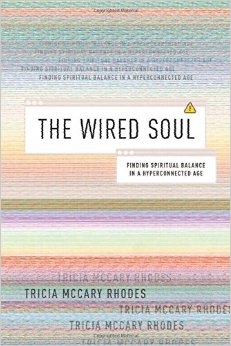 The Wired Soul: Finding Spiritual Balance in a Hyperconnected Age Tricia McCary Rhodes (NavPress) $14.99 I’ve told you about this book before, so will be brief: it is a beautifully written book ruminating on spiritual formation in the digital age. Do we have to give up technology and social media to earn quiet and solitude? Do our habits of the heart and mind, informed as they are by the fast-paced (or slow if you’ve got my computer) pixels and images of the internets, need to be re-calibrated if we are going to be attentive to the things of God? This book reintroduces us to the classic disciplines of Scripture reading, meditation, prayer and contemplation, but not describing them just as “technologies to aid our faith” but as tools to keep us mindful and focused in an increasingly disoriented digital age. What does it mean to ‘be still and know that I am God’ in these times? A very nice book.
The Wired Soul: Finding Spiritual Balance in a Hyperconnected Age Tricia McCary Rhodes (NavPress) $14.99 I’ve told you about this book before, so will be brief: it is a beautifully written book ruminating on spiritual formation in the digital age. Do we have to give up technology and social media to earn quiet and solitude? Do our habits of the heart and mind, informed as they are by the fast-paced (or slow if you’ve got my computer) pixels and images of the internets, need to be re-calibrated if we are going to be attentive to the things of God? This book reintroduces us to the classic disciplines of Scripture reading, meditation, prayer and contemplation, but not describing them just as “technologies to aid our faith” but as tools to keep us mindful and focused in an increasingly disoriented digital age. What does it mean to ‘be still and know that I am God’ in these times? A very nice book. The Desire: Satisfying the Heart James M. Houston (Victor) $16.99 The remarkably profound scholar and teacher and spiritual leader, James Houston, who founded Regent College in British Columbia, is known for his mastery of medieval and other spiritual writers and remains a like-minded colleague with authors such as J.I. Packer, Marva Dawn, Eugene Peterson. A small evangelical publisher rather oddly published three magisterial books of his years ago and they went out of print. This was one of those and we have a few that we’ve been holding for ages. Given the popularity of thinking about desire (see books just as David Naugle’s excellent Reordered Loves Reordered Lives, Jen Pollock Michel’s splendid Teach Us to Want, and of course Jamie Smith’s must-read You Are What You Love ) we wanted to highlight this now, and make our few available, while our supplies last. The Desire explores the very nature of the human heart and how longings for the eternal play out in our daily lives, even as we discern false desires (which can become addictions and dysfunctions.) A remarkable book, especially in this season where we seek, as this book offers, “a more substantial and satisfying life.”
The Desire: Satisfying the Heart James M. Houston (Victor) $16.99 The remarkably profound scholar and teacher and spiritual leader, James Houston, who founded Regent College in British Columbia, is known for his mastery of medieval and other spiritual writers and remains a like-minded colleague with authors such as J.I. Packer, Marva Dawn, Eugene Peterson. A small evangelical publisher rather oddly published three magisterial books of his years ago and they went out of print. This was one of those and we have a few that we’ve been holding for ages. Given the popularity of thinking about desire (see books just as David Naugle’s excellent Reordered Loves Reordered Lives, Jen Pollock Michel’s splendid Teach Us to Want, and of course Jamie Smith’s must-read You Are What You Love ) we wanted to highlight this now, and make our few available, while our supplies last. The Desire explores the very nature of the human heart and how longings for the eternal play out in our daily lives, even as we discern false desires (which can become addictions and dysfunctions.) A remarkable book, especially in this season where we seek, as this book offers, “a more substantial and satisfying life.”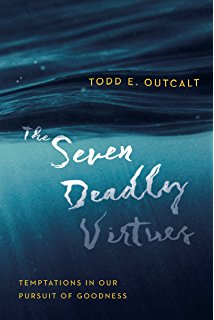 The Seven Deadly Virtues: Temptations in Our Pursuit of Goodness Todd E. Outcalt (IVP) $16.00 There have been a small spate of books along these lines – we like The Danger of Doing Good by Peter Greer and the very useful and wise Doing Good Without Giving Up: Sustaining Social Action in a World That’s Hard to Change by Ben Lowe — but this one is more literary, more deeply theological, wonderfully written, drawing on thoughtful sources from the Ante-Nicene Fathers to Kierkegaard to Pope John Paul. The author is a United Methodist pastor and popular author. This looks tremendous and feels like a good book to read during Lent, even though it isn’t exactly a Lenten book. Check it out and you may be surprised how insightful it may be for you.
The Seven Deadly Virtues: Temptations in Our Pursuit of Goodness Todd E. Outcalt (IVP) $16.00 There have been a small spate of books along these lines – we like The Danger of Doing Good by Peter Greer and the very useful and wise Doing Good Without Giving Up: Sustaining Social Action in a World That’s Hard to Change by Ben Lowe — but this one is more literary, more deeply theological, wonderfully written, drawing on thoughtful sources from the Ante-Nicene Fathers to Kierkegaard to Pope John Paul. The author is a United Methodist pastor and popular author. This looks tremendous and feels like a good book to read during Lent, even though it isn’t exactly a Lenten book. Check it out and you may be surprised how insightful it may be for you.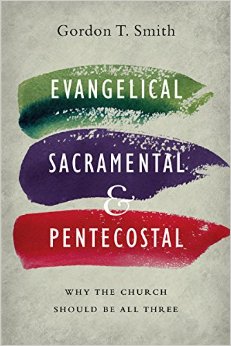 Evangelical, Sacramental & Pentecostal: Why the Church Should Be All Three Gordon T. Smith (IVP Academic) $17.00 This slim book just came and it looks like it is worth its weight in gold. I recommend every single book Gordon Smith has written, and highly esteem his ecumenical perspective, his contemplative tone, his good vision to integrate varying traditions within the broader church. (I’m a fan of Richard Foster’s Streams of Living Water as well, which is a broader study than Smith’s new one.) Glen Scorgie of Bethel Seminary (in San Diego) says “This is a provocative call for a fresh ecumenical synergy – for weaving all these elements together into something stronger and better than the older, isolating silos were able by themselves to deliver.” Wow – if in this season you are eager for more fullness of life, deeper reality, a wider connection to others in other faith traditions within the church, this corrective will pull you happily into other “means of grace.” I cannot wait to read this, and hope many Hearts & Minds friends, too, will be eager to spread the word about this approach. By the way, it would certainly be fitting during this season of deeper reflection and repentance and intentionality about Christian growth to work through his major volume Called to Be Saints.
Evangelical, Sacramental & Pentecostal: Why the Church Should Be All Three Gordon T. Smith (IVP Academic) $17.00 This slim book just came and it looks like it is worth its weight in gold. I recommend every single book Gordon Smith has written, and highly esteem his ecumenical perspective, his contemplative tone, his good vision to integrate varying traditions within the broader church. (I’m a fan of Richard Foster’s Streams of Living Water as well, which is a broader study than Smith’s new one.) Glen Scorgie of Bethel Seminary (in San Diego) says “This is a provocative call for a fresh ecumenical synergy – for weaving all these elements together into something stronger and better than the older, isolating silos were able by themselves to deliver.” Wow – if in this season you are eager for more fullness of life, deeper reality, a wider connection to others in other faith traditions within the church, this corrective will pull you happily into other “means of grace.” I cannot wait to read this, and hope many Hearts & Minds friends, too, will be eager to spread the word about this approach. By the way, it would certainly be fitting during this season of deeper reflection and repentance and intentionality about Christian growth to work through his major volume Called to Be Saints. 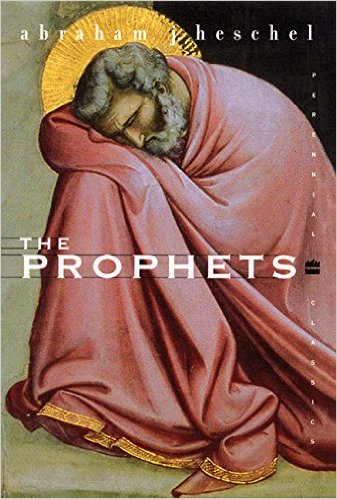
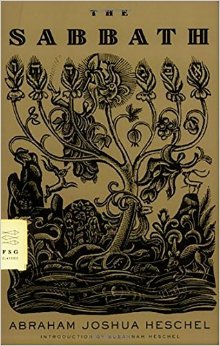 The Prophets Abraham Joshua Heschel (Harper Perennial) $19.99 You may have been meaning to read this large, serious work for years, now, or maybe you’ve only recently heard of this passionate mid-twentieth century Rabbi/scholar/activist. (You will see his white hair and beard in many old pictures of Dr. King and the civil rights marches.) First published in 1962 The Prophets has been considered a classic ever since, plumbing as it does, the pathos of the Hebrew prophets. Perhaps now is a time to start it. For a less daunting, but equally rich, very rewarding read, consider Rabbi Heschel’s wonderful and important work The Sabbath (Farrar Straus Giroux; $14.00.) It was released, I think, in 1951 and remains a standard in any discussion of Jewish spirituality. I think I first learned of it, or was challenged to read it, by Marva Dawn or maybe Eugene Peterson, who often recommends it. You really should have both of these…
The Prophets Abraham Joshua Heschel (Harper Perennial) $19.99 You may have been meaning to read this large, serious work for years, now, or maybe you’ve only recently heard of this passionate mid-twentieth century Rabbi/scholar/activist. (You will see his white hair and beard in many old pictures of Dr. King and the civil rights marches.) First published in 1962 The Prophets has been considered a classic ever since, plumbing as it does, the pathos of the Hebrew prophets. Perhaps now is a time to start it. For a less daunting, but equally rich, very rewarding read, consider Rabbi Heschel’s wonderful and important work The Sabbath (Farrar Straus Giroux; $14.00.) It was released, I think, in 1951 and remains a standard in any discussion of Jewish spirituality. I think I first learned of it, or was challenged to read it, by Marva Dawn or maybe Eugene Peterson, who often recommends it. You really should have both of these…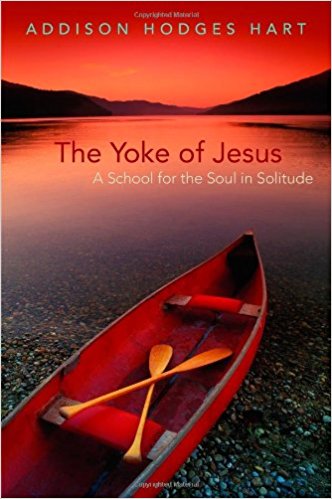 The Yoke of Jesus: A School for the Soul in Solitude Addison Hodges Hart (Eerdmans) $14.00 This compact sized paperback is so beautifully written, so warm, so insightful, that I wanted to list it here. He is a Catholic priest and college chaplain – his books are oddly winsome even as they tackle some tough stuff. (See, for instance, his book Knowing Darkness: On Skepticism, Melancholy, Friendship and God.) This gracious volume invites us to silence and solitude, to care about our souls by attending to ordinary practices, bringing together dogma and belief (on one hand) but linking it to true knowledge of God and earnest love for God. What is the role of stillness in Christian discipleship, and how have the ancient writers (and the Bible itself) taught us about deeper prayer through nurturing habits of solitude?
The Yoke of Jesus: A School for the Soul in Solitude Addison Hodges Hart (Eerdmans) $14.00 This compact sized paperback is so beautifully written, so warm, so insightful, that I wanted to list it here. He is a Catholic priest and college chaplain – his books are oddly winsome even as they tackle some tough stuff. (See, for instance, his book Knowing Darkness: On Skepticism, Melancholy, Friendship and God.) This gracious volume invites us to silence and solitude, to care about our souls by attending to ordinary practices, bringing together dogma and belief (on one hand) but linking it to true knowledge of God and earnest love for God. What is the role of stillness in Christian discipleship, and how have the ancient writers (and the Bible itself) taught us about deeper prayer through nurturing habits of solitude? 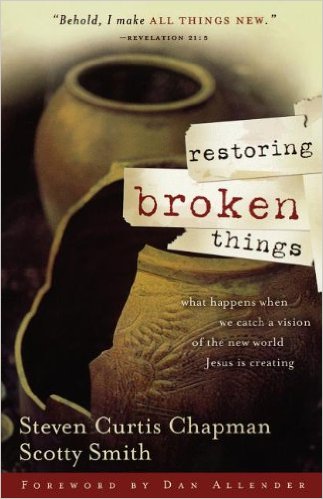 Restoring Broken Things Steven Curtis Chapman & Scotty Smith (Thomas Nelson) $14.99 Maybe you’ve heard that there is a brand new memoir by CCM singer Steven Curtis Chapman (Between Heaven and the Real World: My Story) or maybe you’ve read some of pastor Scotty Smith’s powerful, serious books of prayers. They are both men who have suffered, men who are attentive to the fallen nature of our hurting world, and who are firm in the hope that the gospel is, in fact, a restoration of creation. This old book (which I featured at Jubilee this year on Saturday morning as we studied the fall, injustice, and brokenness) tells the big gospel story — creation/fall/redemption — and invites us to see “what happens when we catch a vision of the new world Jesus is creating.” This is good, accessible, Biblical theology, offering varying ways to tell the story of the gospel, to help us see our own role in the fresh start of new creation that God is bringing to bear in our lives and in all of creation. Dan Allender wrote a lovely, passionate forward. This is a great book to read anytime, and certainly a good one for now, here in the midst of the Lenten season when we ponder broken things, and yearn for authenticity about that, and yet hope for greater comfort and healing and restoration. I’m a big fan of this book and commend it to you.
Restoring Broken Things Steven Curtis Chapman & Scotty Smith (Thomas Nelson) $14.99 Maybe you’ve heard that there is a brand new memoir by CCM singer Steven Curtis Chapman (Between Heaven and the Real World: My Story) or maybe you’ve read some of pastor Scotty Smith’s powerful, serious books of prayers. They are both men who have suffered, men who are attentive to the fallen nature of our hurting world, and who are firm in the hope that the gospel is, in fact, a restoration of creation. This old book (which I featured at Jubilee this year on Saturday morning as we studied the fall, injustice, and brokenness) tells the big gospel story — creation/fall/redemption — and invites us to see “what happens when we catch a vision of the new world Jesus is creating.” This is good, accessible, Biblical theology, offering varying ways to tell the story of the gospel, to help us see our own role in the fresh start of new creation that God is bringing to bear in our lives and in all of creation. Dan Allender wrote a lovely, passionate forward. This is a great book to read anytime, and certainly a good one for now, here in the midst of the Lenten season when we ponder broken things, and yearn for authenticity about that, and yet hope for greater comfort and healing and restoration. I’m a big fan of this book and commend it to you.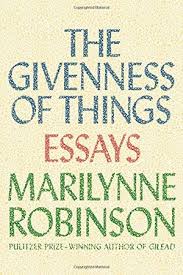 The Givenness of Things: Essays Marilynne Robinson (Picador) $16.00 This paperback is worth every dime – loaded, as it is, with ponderings deep and delicious, thoughtful and interesting, glorious, even. Granted, she is writing deeply, as a literary essayist here — you may only know her Pulitzer-Prize winning novels such as Gildead, Homecoming, or Lila — but if you are a serious thinker or wanting to be aware of the major public intellectuals of our day, you could hardly do better than to spend time with these remarkable, heady essays. Her intellectual prowess is well-respected (The Christian Science Monitor mentioned her “formidable intellect” and The New Republic said her handiwork is “capacious and serious, but also mysterious and wondrous.”) The Givenness of Things was named as Time’s top ten nonfiction books when it came out in hardcover and now, in this nice paperback, there is added a two-part interview between her and then-President Barack Obama that first appeared in the New York Review of Books. The New York Times Book Review, by the way, said her “heroic lamentation is magnificent… timely and important.” That she is a John Calvin scholar, too, makes her just a fascinating, tremendously interesting figure. Until her next novel comes, read this.
The Givenness of Things: Essays Marilynne Robinson (Picador) $16.00 This paperback is worth every dime – loaded, as it is, with ponderings deep and delicious, thoughtful and interesting, glorious, even. Granted, she is writing deeply, as a literary essayist here — you may only know her Pulitzer-Prize winning novels such as Gildead, Homecoming, or Lila — but if you are a serious thinker or wanting to be aware of the major public intellectuals of our day, you could hardly do better than to spend time with these remarkable, heady essays. Her intellectual prowess is well-respected (The Christian Science Monitor mentioned her “formidable intellect” and The New Republic said her handiwork is “capacious and serious, but also mysterious and wondrous.”) The Givenness of Things was named as Time’s top ten nonfiction books when it came out in hardcover and now, in this nice paperback, there is added a two-part interview between her and then-President Barack Obama that first appeared in the New York Review of Books. The New York Times Book Review, by the way, said her “heroic lamentation is magnificent… timely and important.” That she is a John Calvin scholar, too, makes her just a fascinating, tremendously interesting figure. Until her next novel comes, read this.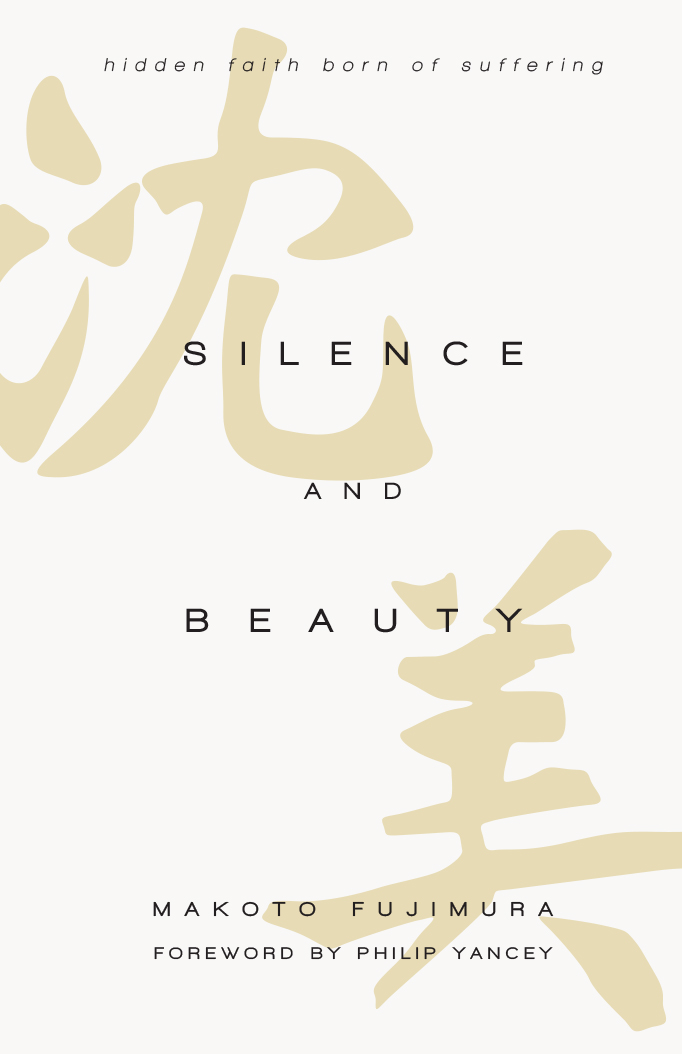 Silence and Beauty: Hidden Faith Born of Suffering Makoto Fujimura (IVP) $26.00 Well, if you haven’t gotten this yet, might I suggest you do so now? I am not always this “pushy” but I am confident that this marvelous reflection on the relationship of art and creativity and beauty and suffering — and what all that tells us about God and the hope of redemption in the sufferings of Jesus — is a perfect book to take up as we move towards Good Friday. You know we respect Mr. Fujimura (what a thrill it was to have me introduced at Grove City College last week and having it said that the next speaker in their series of which I was a part, was painter and essayist Makoto Fujimura!) This is not only a survey of good thinking about faith and art and suffering but it is, quite specifically, a conversation with Japanese novelist Shusaku Endo and his stunning story Silence. And, also, tangentially, about Mako’s friend Martin Scorcese and his making of a film based on this 1960s novel. The novel (about the persecution of Christian missionaries in Seventeenth Century Japan) was influential in Mako’s own journey to Christ and his Christian witness today in the world of the arts and letters is somewhat indebted to Endo’s novel. It all comes full circle in Silence and Beauty — Mako, Endo, Japan, art, film, pain and redemption, goodness and life, the gospel and cultural renewal, faith and mystery. What a book! Very highly recommended!
Silence and Beauty: Hidden Faith Born of Suffering Makoto Fujimura (IVP) $26.00 Well, if you haven’t gotten this yet, might I suggest you do so now? I am not always this “pushy” but I am confident that this marvelous reflection on the relationship of art and creativity and beauty and suffering — and what all that tells us about God and the hope of redemption in the sufferings of Jesus — is a perfect book to take up as we move towards Good Friday. You know we respect Mr. Fujimura (what a thrill it was to have me introduced at Grove City College last week and having it said that the next speaker in their series of which I was a part, was painter and essayist Makoto Fujimura!) This is not only a survey of good thinking about faith and art and suffering but it is, quite specifically, a conversation with Japanese novelist Shusaku Endo and his stunning story Silence. And, also, tangentially, about Mako’s friend Martin Scorcese and his making of a film based on this 1960s novel. The novel (about the persecution of Christian missionaries in Seventeenth Century Japan) was influential in Mako’s own journey to Christ and his Christian witness today in the world of the arts and letters is somewhat indebted to Endo’s novel. It all comes full circle in Silence and Beauty — Mako, Endo, Japan, art, film, pain and redemption, goodness and life, the gospel and cultural renewal, faith and mystery. What a book! Very highly recommended!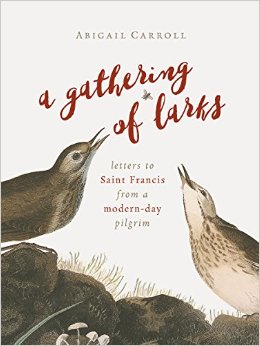 A Gathering of Larks: Letters to Saint Francis from a Modern-Day Pilgrim Abigail Carroll (Eerdmans) $12.99 Oh my, what an interesting book this is, not the easiest to describe, but simple to explain. This is a luminous set of poems written to, yep, Saint Francis. Consequently, this becomes what creative writing guru Brian Doyle calls “a most refreshing, eloquent, wonderfully unassuming, gentle inquiry into the actual Saint Francis and the song of his awed life” and Carroll’s own awed life as well. Mystic Richard Rohr says these lyrical letters “court wonder, inviting the reader on a pilgrimage to the heart.”
A Gathering of Larks: Letters to Saint Francis from a Modern-Day Pilgrim Abigail Carroll (Eerdmans) $12.99 Oh my, what an interesting book this is, not the easiest to describe, but simple to explain. This is a luminous set of poems written to, yep, Saint Francis. Consequently, this becomes what creative writing guru Brian Doyle calls “a most refreshing, eloquent, wonderfully unassuming, gentle inquiry into the actual Saint Francis and the song of his awed life” and Carroll’s own awed life as well. Mystic Richard Rohr says these lyrical letters “court wonder, inviting the reader on a pilgrimage to the heart.”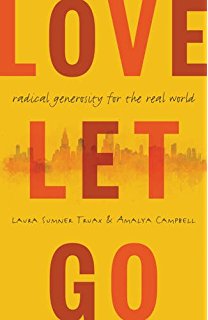 Love Let Go: Radical Generosity for the Real World Laura Sumner Truax & Amalya Campbell (Eerdmans) $21.99 A few years ago I was blown away by the raw and revealing memoir by Laura Truax called Undone: When Coming Apart Puts You Back Together. She is the passionate pastor of the storied faith community in urban Chicago called LaSalle Street Church and in this new book she and a congregation member who taught stewardship classes there (and herself has an MBA from Harvard Business School), tell of something amazing that transpired in that place. A smaller version of this has been used as sermon illustrations and youth talks for years, but this is the real thing: a major donor gave the church a ton of money. They concluded they didn’t want it – itself a story worth writing a book about! – but they decided to give each member $500 and instructed them to go out and do good in the world. This is, on the surface, the stories of what happened as radical generosity became even more of a way of life for this congregation. This is more than fun tales of giving and sharing and helping, it is what Publisher’s Weekly has called “a well-wrought book, of interest to anyone interested in community building or philanthropy.” It is what McLaren calls “a powerful alternative message (to greed)” and “the transformative power of generosity.” This is a counter-cultural story that needs to be known, but it is also a rich study of the psychology of giving, the nature of living abundant lives within a culture that promotes scarcity, and the plausibility of being Christ-like in a world like ours. One of the best books of the year, I’m sure.
Love Let Go: Radical Generosity for the Real World Laura Sumner Truax & Amalya Campbell (Eerdmans) $21.99 A few years ago I was blown away by the raw and revealing memoir by Laura Truax called Undone: When Coming Apart Puts You Back Together. She is the passionate pastor of the storied faith community in urban Chicago called LaSalle Street Church and in this new book she and a congregation member who taught stewardship classes there (and herself has an MBA from Harvard Business School), tell of something amazing that transpired in that place. A smaller version of this has been used as sermon illustrations and youth talks for years, but this is the real thing: a major donor gave the church a ton of money. They concluded they didn’t want it – itself a story worth writing a book about! – but they decided to give each member $500 and instructed them to go out and do good in the world. This is, on the surface, the stories of what happened as radical generosity became even more of a way of life for this congregation. This is more than fun tales of giving and sharing and helping, it is what Publisher’s Weekly has called “a well-wrought book, of interest to anyone interested in community building or philanthropy.” It is what McLaren calls “a powerful alternative message (to greed)” and “the transformative power of generosity.” This is a counter-cultural story that needs to be known, but it is also a rich study of the psychology of giving, the nature of living abundant lives within a culture that promotes scarcity, and the plausibility of being Christ-like in a world like ours. One of the best books of the year, I’m sure.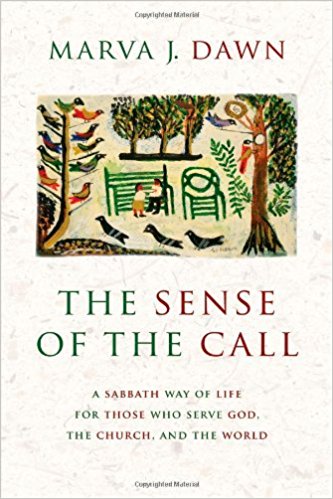 The Sense of the Call: A Sabbath Way of Life for Those Who Serve God, the Church, and the World Marva Dawn (Eerdmans) $18.00 One of the great books of our time, and one that we continue to carry with us whenever we sell books off site, if it is remotely appropriate, is Marva Dawn’s Keeping the Sabbath Wholly. (It is a book that would be wonderful to read during this time of the church season, by the way, learning to build some rest and discipline into your schedule.) In that remarkable and influential volume she delightfully unpacks four aspects of Sabbath keeping: resting, ceasing, feasting, and embracing. That’s a lot, but not too much, and it clarified a lot for many of us about the restorative, beautiful gift of Sabbath time. Of course, it isn’t easy to enter in to that sort of counter-cultural practice, and it is even harder for those who are in leadership within the local church where much work is done on Sunday. Anyway, in this book (for church leaders, yes, but, truly, for anyone and everyone) Marva spells out how those four movements of the Sabbath day’s rest can actually be woven into daily living the other six days of the week. In this powerful work she revisits those same four life-giving aspects from her Sabbath book, turning them into a “Sabbath way of life” and shows how we all can be formed in these helpful way, through these historic disciplines and practices, dispositions and attitudes. It is a remarkable, rich, rewarding, good read , just over 300 pages. As Eugene Peterson says, “there is not a trivial or superfluous word in this book.”
The Sense of the Call: A Sabbath Way of Life for Those Who Serve God, the Church, and the World Marva Dawn (Eerdmans) $18.00 One of the great books of our time, and one that we continue to carry with us whenever we sell books off site, if it is remotely appropriate, is Marva Dawn’s Keeping the Sabbath Wholly. (It is a book that would be wonderful to read during this time of the church season, by the way, learning to build some rest and discipline into your schedule.) In that remarkable and influential volume she delightfully unpacks four aspects of Sabbath keeping: resting, ceasing, feasting, and embracing. That’s a lot, but not too much, and it clarified a lot for many of us about the restorative, beautiful gift of Sabbath time. Of course, it isn’t easy to enter in to that sort of counter-cultural practice, and it is even harder for those who are in leadership within the local church where much work is done on Sunday. Anyway, in this book (for church leaders, yes, but, truly, for anyone and everyone) Marva spells out how those four movements of the Sabbath day’s rest can actually be woven into daily living the other six days of the week. In this powerful work she revisits those same four life-giving aspects from her Sabbath book, turning them into a “Sabbath way of life” and shows how we all can be formed in these helpful way, through these historic disciplines and practices, dispositions and attitudes. It is a remarkable, rich, rewarding, good read , just over 300 pages. As Eugene Peterson says, “there is not a trivial or superfluous word in this book.”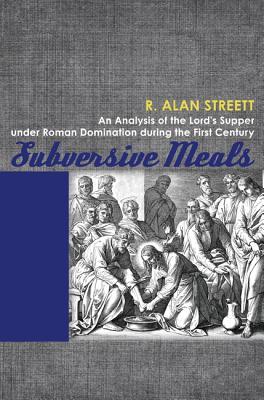 Subversive Meals: An Analysis of the Lord’s Supper Under Roman Domination During the First Century R. Alan Streett (Pickwick Publications) $37.00 A hefty academic monograph, this may be of great interest to some of our readers who want to explore how ancient Christian practices had at their roots anti-empire connotations and nearly revolutionary impact. Endorsements on this lively book are from Richard Horsley and Warrant Carter (who have long written about this counter-cultural hermeneutic that explores the radical socio-political themes embedded but often missed in Biblical teaching and practice.) Interestingly, Street teaches Biblical Exegesis at the ultra-conservative Criswell College in Texas. Joel Green, an esteemed evangelical scholar (formerly of Asbury, now at Fuller) says that Streett “demonstrates the surprisingly political significance of the Lord’s Supper” and that his book is “historically important and theological challenging” which “participates in the ongoing destruction of the walls that separate theology and practices, worship and politics.”
Subversive Meals: An Analysis of the Lord’s Supper Under Roman Domination During the First Century R. Alan Streett (Pickwick Publications) $37.00 A hefty academic monograph, this may be of great interest to some of our readers who want to explore how ancient Christian practices had at their roots anti-empire connotations and nearly revolutionary impact. Endorsements on this lively book are from Richard Horsley and Warrant Carter (who have long written about this counter-cultural hermeneutic that explores the radical socio-political themes embedded but often missed in Biblical teaching and practice.) Interestingly, Street teaches Biblical Exegesis at the ultra-conservative Criswell College in Texas. Joel Green, an esteemed evangelical scholar (formerly of Asbury, now at Fuller) says that Streett “demonstrates the surprisingly political significance of the Lord’s Supper” and that his book is “historically important and theological challenging” which “participates in the ongoing destruction of the walls that separate theology and practices, worship and politics.” 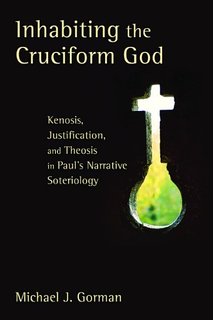
 Cruciformity: Paul’s Narrative Spirituality of the Cross Michael J. Gorman (Eerdmans) $38.00
Cruciformity: Paul’s Narrative Spirituality of the Cross Michael J. Gorman (Eerdmans) $38.00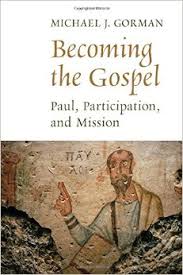 too, and could be read in ways that are helpful, illuminating, challenging, informative and – the author hopes – transformative. Some have of called these a “tour de force” and “superb and groundbreaking” etcetera. He is an author you should know – in league with and quoted by nearly everyone serious in New Testament studies these days (from N.T. Wright to Richard Hays to Fleming Rutledge and other world class authors.) Lent seems like a good time to take up his challenge to “participate” in God’s own mission, as explained by Paul, as embodied by the sacrificial suffering of the Lamb of God, Christ Himself. This is heady scholarship but always with a view of how local churches live out the call to costly discipleship. Wow.
too, and could be read in ways that are helpful, illuminating, challenging, informative and – the author hopes – transformative. Some have of called these a “tour de force” and “superb and groundbreaking” etcetera. He is an author you should know – in league with and quoted by nearly everyone serious in New Testament studies these days (from N.T. Wright to Richard Hays to Fleming Rutledge and other world class authors.) Lent seems like a good time to take up his challenge to “participate” in God’s own mission, as explained by Paul, as embodied by the sacrificial suffering of the Lamb of God, Christ Himself. This is heady scholarship but always with a view of how local churches live out the call to costly discipleship. Wow.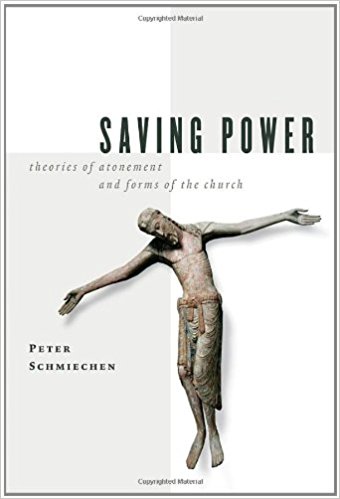 Saving Power: Theories of Atonement and Forms of the Church Peter Schmiechen (Eerdmans) $39.95 Peter was former President of Lancaster Theological Seminary and for one so situated within UCC higher education it may surprise some to know of his orthodox passions. (He is involved in the rather conservative Mercersburg Society that applies Schaff and Nevin to today’s ecumenical challenges; indeed, his new book is about Eucharistic theology written with what seems to be a Mercersburg accent.) Endorsements of this almost 400 page study are from Walter Brueggemann, Sally Brown (of Princeton) and S. Mark Heim (of Andover Newton, a “nonviolent atonement” voice) and evangelically Reformed Hans Boersma of Regent College, affirming the book’s scholarly clarity (it studies 10 different models) and congeniality, notes “even when he feels the need to express his strong reservations, Schmiechen treads carefully, respectfully, and yet frankly.”
Saving Power: Theories of Atonement and Forms of the Church Peter Schmiechen (Eerdmans) $39.95 Peter was former President of Lancaster Theological Seminary and for one so situated within UCC higher education it may surprise some to know of his orthodox passions. (He is involved in the rather conservative Mercersburg Society that applies Schaff and Nevin to today’s ecumenical challenges; indeed, his new book is about Eucharistic theology written with what seems to be a Mercersburg accent.) Endorsements of this almost 400 page study are from Walter Brueggemann, Sally Brown (of Princeton) and S. Mark Heim (of Andover Newton, a “nonviolent atonement” voice) and evangelically Reformed Hans Boersma of Regent College, affirming the book’s scholarly clarity (it studies 10 different models) and congeniality, notes “even when he feels the need to express his strong reservations, Schmiechen treads carefully, respectfully, and yet frankly.” 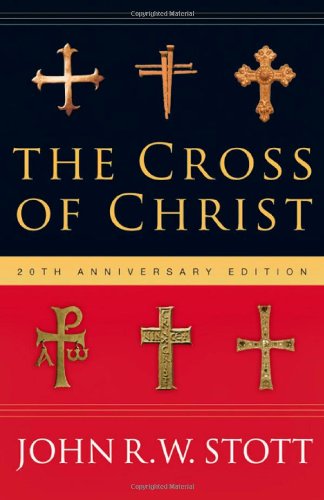
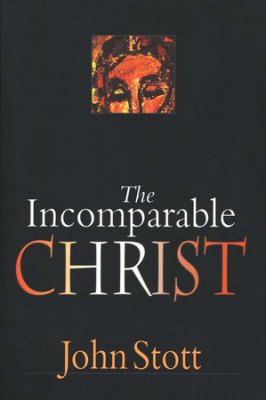 The Cross of Christ John R.W. Stott (IVP Academic) $28.00 I seem to recommend this every year at this time, in part because it has meant so much to me, advancing a mature, winsome, if seriously evangelical view of the nature of the work of the cross. Granted, other authors push in fresh, new directions, but this is the best overview of the conventional position that we know of.
The Cross of Christ John R.W. Stott (IVP Academic) $28.00 I seem to recommend this every year at this time, in part because it has meant so much to me, advancing a mature, winsome, if seriously evangelical view of the nature of the work of the cross. Granted, other authors push in fresh, new directions, but this is the best overview of the conventional position that we know of.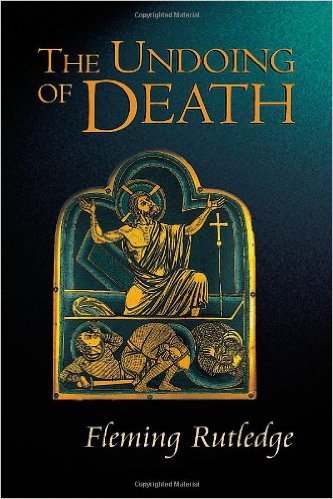
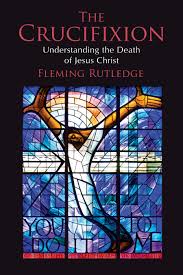 The Undoing of Death: Sermons for Holy Week and Easter Fleming Rutledge (Eerdmans) $24.00 This is another that, while not technically a Lenten devotional, is, in fact, a collection of sermons preached over a lifetime by the eloquent Episcopal pastor and scholar. Her words are powerful, her studies extraordinary, and this book deserves being read and re-read. I hope you own it. If not, it would be our great pleasure to send one soon.
The Undoing of Death: Sermons for Holy Week and Easter Fleming Rutledge (Eerdmans) $24.00 This is another that, while not technically a Lenten devotional, is, in fact, a collection of sermons preached over a lifetime by the eloquent Episcopal pastor and scholar. Her words are powerful, her studies extraordinary, and this book deserves being read and re-read. I hope you own it. If not, it would be our great pleasure to send one soon. 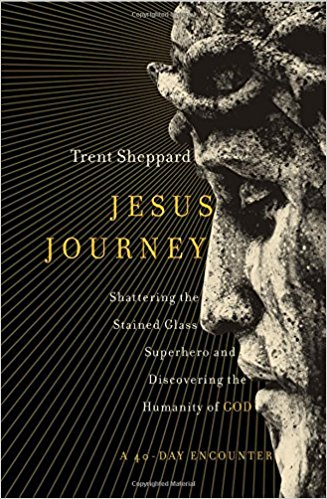 Jesus Journey: Shattering the Stained Glass Superhero and Discovering the Humanity of God – a 40 Day Encounter Trent Shepard (Zondervan) $16.99 I am sometimes a bit weary of uber-cool authors whose bios tell you snarky stuff about their favorite lattes and pastors who look like they play in an emo band, with churches with stages that look like hip malls or the local rock arena. I dunno, maybe I’m getting old. There are a lot of books that are just a little too familiar, and little too casual, trying sooo hard to be cool. So when a book comes out saying it’s going to overturn our stuffy attitudes about Jesus and religion, well, I sometimes just roll my eyes. It’s useful, especially for millennials, I suppose, to hear somebody that at least appears edgy with an out-side-the-box message, helping them appreciate faith in their own vernacular. My faith in my youthful years was impacted by bell-bottom wearing, long-haired, Jesus Freaks. (And, later, I met Terry Thomas who in those years looked liked David Crosby, but I digress.) So I get it. But I’m still a little tired of the marketing schtick.
Jesus Journey: Shattering the Stained Glass Superhero and Discovering the Humanity of God – a 40 Day Encounter Trent Shepard (Zondervan) $16.99 I am sometimes a bit weary of uber-cool authors whose bios tell you snarky stuff about their favorite lattes and pastors who look like they play in an emo band, with churches with stages that look like hip malls or the local rock arena. I dunno, maybe I’m getting old. There are a lot of books that are just a little too familiar, and little too casual, trying sooo hard to be cool. So when a book comes out saying it’s going to overturn our stuffy attitudes about Jesus and religion, well, I sometimes just roll my eyes. It’s useful, especially for millennials, I suppose, to hear somebody that at least appears edgy with an out-side-the-box message, helping them appreciate faith in their own vernacular. My faith in my youthful years was impacted by bell-bottom wearing, long-haired, Jesus Freaks. (And, later, I met Terry Thomas who in those years looked liked David Crosby, but I digress.) So I get it. But I’m still a little tired of the marketing schtick.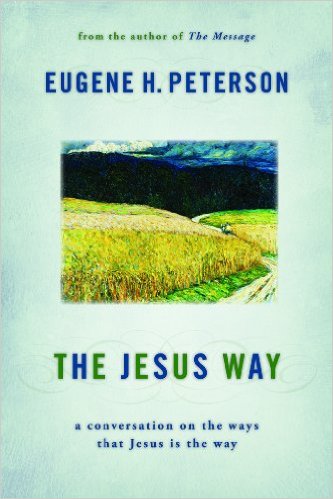 The Jesus Way: A Conversation on the Ways That Jesus is the Way Eugene Peterson (Eerdmans) $17.00 I suppose you know all five of these remarkable, mostly big, somewhat dense books that Peterson saw as his most important contribution. It is called “spiritual theology” that is more than only spirituality, more than systematic theology, more than Bible study, but a rich and rewarding combination, by a scholar/pastor. I agree with Scot McKnight who said once that “no one simply reads, or worse, skims Peterson. One ponders Peterson, as Peterson ponders the Bible.” Yes, and more. I’ve been working on these five volumes, on and off, for years, and I cannot tell you how important they are. This third one in the series – following Christ Plays in Ten Thousand Places and Eat This Book and Tell It Slant offers profound insight into how others in the Bible anticipated His coming and shows how the ways of those who came before Christ – specifically Abraham, Moses, David, Elijah, and Isaiah — “revealed and prepared the ‘way of the Lord’ that became incarnate and complete in Jesus.”
The Jesus Way: A Conversation on the Ways That Jesus is the Way Eugene Peterson (Eerdmans) $17.00 I suppose you know all five of these remarkable, mostly big, somewhat dense books that Peterson saw as his most important contribution. It is called “spiritual theology” that is more than only spirituality, more than systematic theology, more than Bible study, but a rich and rewarding combination, by a scholar/pastor. I agree with Scot McKnight who said once that “no one simply reads, or worse, skims Peterson. One ponders Peterson, as Peterson ponders the Bible.” Yes, and more. I’ve been working on these five volumes, on and off, for years, and I cannot tell you how important they are. This third one in the series – following Christ Plays in Ten Thousand Places and Eat This Book and Tell It Slant offers profound insight into how others in the Bible anticipated His coming and shows how the ways of those who came before Christ – specifically Abraham, Moses, David, Elijah, and Isaiah — “revealed and prepared the ‘way of the Lord’ that became incarnate and complete in Jesus.”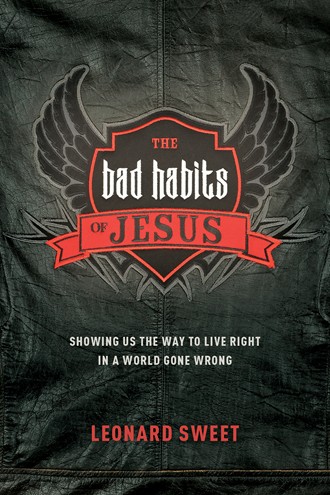 The Bad Habits of Jesus: Showing Us the Way to Live Right in a World Gone Wrong Leonard Sweet (Tyndale) $14.99 I am convinced that there is always more going on in a Len Sweet book than most of us realize. Just his footnotes alone are an education, better than browsing through a big Barnes & Noble or meandering through your local college library. He brings remarkable learning, a fertile curiosity, and a breath-taking — even for some, exasperating — use of wordplay and wit to whatever project he takes up. Such is one way to read his new one — it can be skimmed quickly as any collection of sermons or Bible lessons might be, getting the gist, taking in the many ideas, applauding the keen cleverness that would find all this “bad” stuff Jesus did, the rules he broke, the manners he seems to avoid, the trouble he caused. I suppose much of this has been said before but, to be honest, I can’t think of a better intro to this line of thought for ordinary folks: Jesus did have some “bad habits” did he not? He’d disappear when people needed him most, he’d refuse to answer questions directly, he’d offend people, especially important religious folks. He was late. He spit. He spent time with unproductive children. He was at times wasteful. He told stories that didn’t make a lot of sense. What’s with this “rebellious rabbi” and is there a method to his madness? The Bad Habits of Jesus is a lot of fun, a good intro to the life and teaching of Jesus and a surprisingly powerful little book.
The Bad Habits of Jesus: Showing Us the Way to Live Right in a World Gone Wrong Leonard Sweet (Tyndale) $14.99 I am convinced that there is always more going on in a Len Sweet book than most of us realize. Just his footnotes alone are an education, better than browsing through a big Barnes & Noble or meandering through your local college library. He brings remarkable learning, a fertile curiosity, and a breath-taking — even for some, exasperating — use of wordplay and wit to whatever project he takes up. Such is one way to read his new one — it can be skimmed quickly as any collection of sermons or Bible lessons might be, getting the gist, taking in the many ideas, applauding the keen cleverness that would find all this “bad” stuff Jesus did, the rules he broke, the manners he seems to avoid, the trouble he caused. I suppose much of this has been said before but, to be honest, I can’t think of a better intro to this line of thought for ordinary folks: Jesus did have some “bad habits” did he not? He’d disappear when people needed him most, he’d refuse to answer questions directly, he’d offend people, especially important religious folks. He was late. He spit. He spent time with unproductive children. He was at times wasteful. He told stories that didn’t make a lot of sense. What’s with this “rebellious rabbi” and is there a method to his madness? The Bad Habits of Jesus is a lot of fun, a good intro to the life and teaching of Jesus and a surprisingly powerful little book.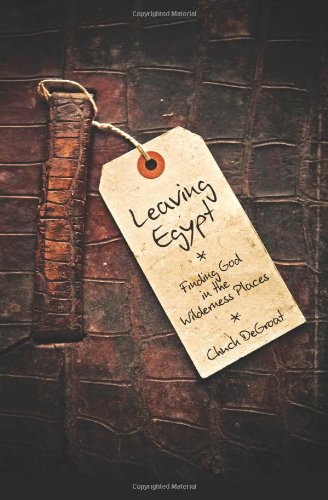 Leaving Egypt: Finding God in the Wilderness Places Chuck DeGroat (Square Inch) $15.99 I have talked about this book before, and tried to encourage many to read DeGroat’s other good books. (For instance, this time of year — or any time, really — many of us need his powerful book called Wholeheartedness: Busyness, Exhaustion, and Healing the Divided Self.) This first one of his, though, always is a delight to explain; I even love the suitcase-motif on the very cool cover design. This is the best book I know of that accessibly uses the wilderness wonderings (of the Hebrew people after they were liberated from Pharaoh’s Egypt) for any who are themselves in a time of wondering, wandering, or in transition. If you feel trapped and know there’s something better, says Steve Brown, “this book will change your life.” If you are a Bible study geek and want another voice in conversation with DeGroat’s why not pair it with Walt Brueggemann’s Keeping Sabbath As Resistance which invites us to say “no” to consumerism and be set free from the compulsions of our times; in a way, that book, too, explores what happens when we are set free, and how to find our way out of Egypt.
Leaving Egypt: Finding God in the Wilderness Places Chuck DeGroat (Square Inch) $15.99 I have talked about this book before, and tried to encourage many to read DeGroat’s other good books. (For instance, this time of year — or any time, really — many of us need his powerful book called Wholeheartedness: Busyness, Exhaustion, and Healing the Divided Self.) This first one of his, though, always is a delight to explain; I even love the suitcase-motif on the very cool cover design. This is the best book I know of that accessibly uses the wilderness wonderings (of the Hebrew people after they were liberated from Pharaoh’s Egypt) for any who are themselves in a time of wondering, wandering, or in transition. If you feel trapped and know there’s something better, says Steve Brown, “this book will change your life.” If you are a Bible study geek and want another voice in conversation with DeGroat’s why not pair it with Walt Brueggemann’s Keeping Sabbath As Resistance which invites us to say “no” to consumerism and be set free from the compulsions of our times; in a way, that book, too, explores what happens when we are set free, and how to find our way out of Egypt. 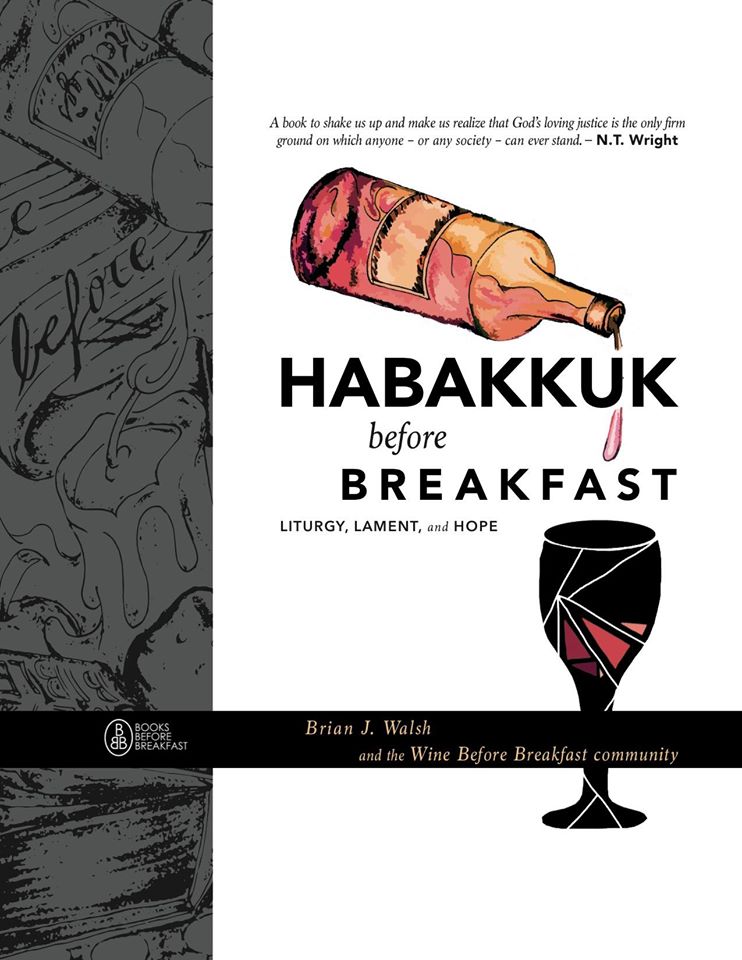 Habakkuk Before Breakfast: Liturgy, Lament, Hope Brian J. Walsh and the Wine Before Breakfast Community (Books Before Breakfast) $14.00 Again, this was a favorite last year, one I was honored to offer an endorsing blurb on (next to Karen Pascal, the Director of the Henri Nouwen Society and Tom Wright, Walsh’s old friend, who says that “Habakkuk Before Breakfast is like no other book on the prophet.”
Habakkuk Before Breakfast: Liturgy, Lament, Hope Brian J. Walsh and the Wine Before Breakfast Community (Books Before Breakfast) $14.00 Again, this was a favorite last year, one I was honored to offer an endorsing blurb on (next to Karen Pascal, the Director of the Henri Nouwen Society and Tom Wright, Walsh’s old friend, who says that “Habakkuk Before Breakfast is like no other book on the prophet.”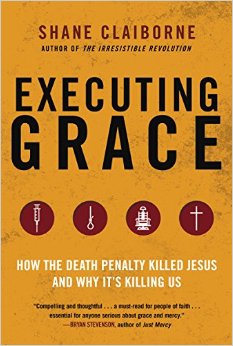 Executing Grace: How the Death Penalty Killed Jesus and Why It’s Killing Us Shane Claiborne (HarperOne) $17.99 Not long ago I had a long conversation with a gentleman who had been in solitary confinement for years. Beth and I had participated earlier this year in a conference organizing faith-motivated folks to think and act justly about this whole topic of mass incarceration, prison reform, solitary confinement — which is a much worse topic than you may know, unbelievably bad and in urgent need of reform — and, of course, the topic that we sometimes call “capital punishment.” Agree or not with Shane’s gospel-centered, grace-filled, Christ-like view (there are Biblical texts he avoids and arguments he doesn’t adequately grapple with) I think reading about those who are incarcerated and on Death Row is a necessary component of our own calling as Christians, mandated, as we are, at least, to “visit the prisoner.” Most of us don’t do that, so at least we can be advocates, prayer partners, citizens working for better policies for our imprisoned fellows. I think this is a very good book to enter into this conversation. There are important endorsements here from the likes of Philip Yancey and John Perkins (and Bob Goff who says “you’ll finish the last page and not just know more, but you’ll want to do more.”) Desmond Tutu raves, and Bryan Stevenson (author of the must-read Just Mercy) says “Compelling and thoughtful… a must-read for people of faith, essential for anyone serious about grace and mercy.” Well. Maybe this season you will be drawn to this kind of topic. I know it is a lot to ask, but we’d invite you to consider ordering this from us today.
Executing Grace: How the Death Penalty Killed Jesus and Why It’s Killing Us Shane Claiborne (HarperOne) $17.99 Not long ago I had a long conversation with a gentleman who had been in solitary confinement for years. Beth and I had participated earlier this year in a conference organizing faith-motivated folks to think and act justly about this whole topic of mass incarceration, prison reform, solitary confinement — which is a much worse topic than you may know, unbelievably bad and in urgent need of reform — and, of course, the topic that we sometimes call “capital punishment.” Agree or not with Shane’s gospel-centered, grace-filled, Christ-like view (there are Biblical texts he avoids and arguments he doesn’t adequately grapple with) I think reading about those who are incarcerated and on Death Row is a necessary component of our own calling as Christians, mandated, as we are, at least, to “visit the prisoner.” Most of us don’t do that, so at least we can be advocates, prayer partners, citizens working for better policies for our imprisoned fellows. I think this is a very good book to enter into this conversation. There are important endorsements here from the likes of Philip Yancey and John Perkins (and Bob Goff who says “you’ll finish the last page and not just know more, but you’ll want to do more.”) Desmond Tutu raves, and Bryan Stevenson (author of the must-read Just Mercy) says “Compelling and thoughtful… a must-read for people of faith, essential for anyone serious about grace and mercy.” Well. Maybe this season you will be drawn to this kind of topic. I know it is a lot to ask, but we’d invite you to consider ordering this from us today. 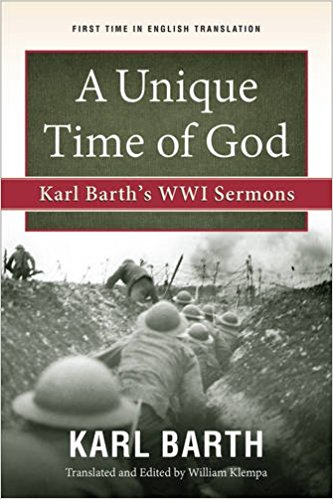 A Unique Time of God: Karl Barth’s WW I Sermons Karl Barth (Westminster/John Knox) $35.00 My theologically conservative friends, of course, think Barth is way too goofy and my progressive friends think he is mired in old-school stuff. I think he is well worth reading, and people I most respect commend his important work. This is a new collection previously never translated or compiled. The Great War, we are told, changed Barth forever. (See Joseph Loconte’s informative and very moving A Hobbit, A Wardrobe and a Great War for how the trauma of the war effected Tolkien and Lewis and how they “rediscovered faith, friendship, and heroism in the cataclysm of 1914-1918.) These thirteen hefty sermons offer not only the young Karl Barth’s unique view on war, but, particularly, the “unique time of God” which he discerned was God’s own judgement on the idolatry of militarism. We’re told in the excellent introduction that this era “demonstrates a decisive shift in Barth’s early theology” so is “essential for anyone who wishes to understand the twentieth-century’s greatest theologian.” And, we can hope, it might help us all reflect more conscientiously about God’s Word as it stands over what the old hymn called “our warring madness.”
A Unique Time of God: Karl Barth’s WW I Sermons Karl Barth (Westminster/John Knox) $35.00 My theologically conservative friends, of course, think Barth is way too goofy and my progressive friends think he is mired in old-school stuff. I think he is well worth reading, and people I most respect commend his important work. This is a new collection previously never translated or compiled. The Great War, we are told, changed Barth forever. (See Joseph Loconte’s informative and very moving A Hobbit, A Wardrobe and a Great War for how the trauma of the war effected Tolkien and Lewis and how they “rediscovered faith, friendship, and heroism in the cataclysm of 1914-1918.) These thirteen hefty sermons offer not only the young Karl Barth’s unique view on war, but, particularly, the “unique time of God” which he discerned was God’s own judgement on the idolatry of militarism. We’re told in the excellent introduction that this era “demonstrates a decisive shift in Barth’s early theology” so is “essential for anyone who wishes to understand the twentieth-century’s greatest theologian.” And, we can hope, it might help us all reflect more conscientiously about God’s Word as it stands over what the old hymn called “our warring madness.”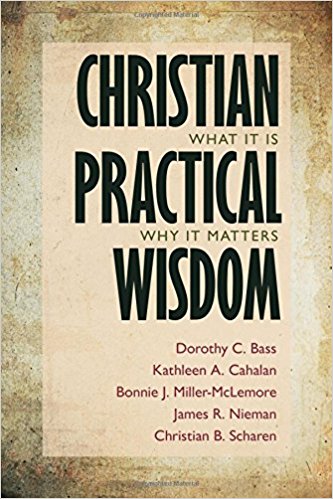 Christian Practical Wisdom: What It Is, Why It Matters Dorothy Bass, Kathleen Cahalan, Bonnie J. Miller-McLemore, James Nieman, Christian Scharen (Eerdmans) $30.00 I hope you know some of these five distinguished scholars, some who have written wonderful books of their own. And I hope you value, as I do, collaborative works of this sort. These colorful chapters are not an anthology from a conference (although I like random essays, too) but have been woven together beautifully, exploring (as the subtitle says) what wisdom is and why we need more of it. The chapters are creatively construed – with pieces on dancing and imagining and collaborating and how these actual practices can help us “gain a heart of wisdom” within what Charles Taylor calls a “secular age.” Blurbs on the back are all thoughtful, in-depth, and raving; philosopher Rebecca Konynkyk DeYoung of Calvin College and Mary Boys from Union Seminary and Stephanie Paulsell from Harvard Divinity School all agree that this profound yet winsome book helps move theological education into the pews, deep stuff into our lives, bringing academic expertise to ordinary folks who want to live a good life. Can we ponder more deeply, live with greater intentionality? Can we be “attuned to the presence of God and the needs of neighbors?” This is a tremendous book, well worth having, well worth working through its 350 pages with care. You will be delighted and challenged and glad. Wisdom is, as I’m sure you know, a major theme in the Bible and yet hardly examined beyond platitudes and moralism. This is the most significant book on this topic I’ve ever seen.
Christian Practical Wisdom: What It Is, Why It Matters Dorothy Bass, Kathleen Cahalan, Bonnie J. Miller-McLemore, James Nieman, Christian Scharen (Eerdmans) $30.00 I hope you know some of these five distinguished scholars, some who have written wonderful books of their own. And I hope you value, as I do, collaborative works of this sort. These colorful chapters are not an anthology from a conference (although I like random essays, too) but have been woven together beautifully, exploring (as the subtitle says) what wisdom is and why we need more of it. The chapters are creatively construed – with pieces on dancing and imagining and collaborating and how these actual practices can help us “gain a heart of wisdom” within what Charles Taylor calls a “secular age.” Blurbs on the back are all thoughtful, in-depth, and raving; philosopher Rebecca Konynkyk DeYoung of Calvin College and Mary Boys from Union Seminary and Stephanie Paulsell from Harvard Divinity School all agree that this profound yet winsome book helps move theological education into the pews, deep stuff into our lives, bringing academic expertise to ordinary folks who want to live a good life. Can we ponder more deeply, live with greater intentionality? Can we be “attuned to the presence of God and the needs of neighbors?” This is a tremendous book, well worth having, well worth working through its 350 pages with care. You will be delighted and challenged and glad. Wisdom is, as I’m sure you know, a major theme in the Bible and yet hardly examined beyond platitudes and moralism. This is the most significant book on this topic I’ve ever seen.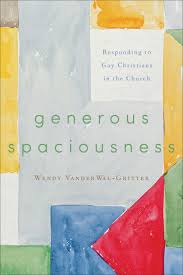 Generous Spaciousness: Responding to Gay Christians in the Church Wendy VanderWal-Gritter (Brazos Press) $19.99 I have raved about this book before, quietly (and, more often, loudly)encouraged people to read it as it tells the remarkable story of this woman’s deep engagement with several sides and groups within the conversation about same sex relations and marriage equality and “gays in the church.” It goes without saying that this remains a controversial matter in nearly every denomination and, as Brian Walsh says in a powerful endorsement on the back, “I can’t imagine a more timely book.” He continues, “Modeling the very ‘generous spaciousness’ that she advocates, VanderWal-Gritter’s heart is on every page.” There are many books inviting us to think of our LGTBQ friends and neighbors as – in the words of the new book Preston Sprinkle’s – as “people to be loved.” Certainly. But VanderWal-Gritter suggests that those with whom we disagree about Biblical interpretation and sexual ethics are also people to be loved and we must all work hard to listen well to one another, to figure out how to “transform controversy into community” with space for all.
Generous Spaciousness: Responding to Gay Christians in the Church Wendy VanderWal-Gritter (Brazos Press) $19.99 I have raved about this book before, quietly (and, more often, loudly)encouraged people to read it as it tells the remarkable story of this woman’s deep engagement with several sides and groups within the conversation about same sex relations and marriage equality and “gays in the church.” It goes without saying that this remains a controversial matter in nearly every denomination and, as Brian Walsh says in a powerful endorsement on the back, “I can’t imagine a more timely book.” He continues, “Modeling the very ‘generous spaciousness’ that she advocates, VanderWal-Gritter’s heart is on every page.” There are many books inviting us to think of our LGTBQ friends and neighbors as – in the words of the new book Preston Sprinkle’s – as “people to be loved.” Certainly. But VanderWal-Gritter suggests that those with whom we disagree about Biblical interpretation and sexual ethics are also people to be loved and we must all work hard to listen well to one another, to figure out how to “transform controversy into community” with space for all.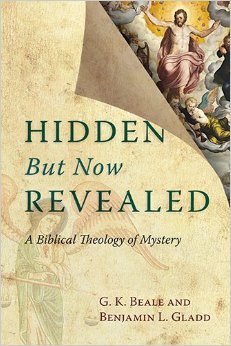 Hidden But Now Revealed: A Biblical Theology of Mystery G.K. Beale and Benjamin L. Gladd (IVP Academic) $27.00 Beale is a rigorous New Testament scholar (PhD from the University of Cambridge) who now teaches NT and Biblical Theology at Westminster Theological Seminary. His work is without doubt some of the most brilliant evangelical scholarship being done in our time; his commentary on Revelation in the New International Greek Testament Commentary series I’m told is extraordinary (not knowing Greek, I wouldn’t know.) I found his book We Become What We Worship an excellent resource and his somewhat more accessible commentary on Revelation to be demanding but important. This recent volume, co-authored, is intriguing, one I’ve been wishing to get to; we hear about “mystery” a lot, but few detail what we mean by that mysterious word and how the major works of God and the essential claims of Christ were often missed — if not hidden! — from the Biblical characters involved. It seems impossible to ignore this troubling fact and here these authors explore the things that are “partially hidden revelation” that are more fully revealed subsequently. It is a close reading of times the word mystery is used in the New Testament, which, they argue, is almost always drawing on the book of Daniel. So this ends up, in some regards, being a book about prophecy. Whew.
Hidden But Now Revealed: A Biblical Theology of Mystery G.K. Beale and Benjamin L. Gladd (IVP Academic) $27.00 Beale is a rigorous New Testament scholar (PhD from the University of Cambridge) who now teaches NT and Biblical Theology at Westminster Theological Seminary. His work is without doubt some of the most brilliant evangelical scholarship being done in our time; his commentary on Revelation in the New International Greek Testament Commentary series I’m told is extraordinary (not knowing Greek, I wouldn’t know.) I found his book We Become What We Worship an excellent resource and his somewhat more accessible commentary on Revelation to be demanding but important. This recent volume, co-authored, is intriguing, one I’ve been wishing to get to; we hear about “mystery” a lot, but few detail what we mean by that mysterious word and how the major works of God and the essential claims of Christ were often missed — if not hidden! — from the Biblical characters involved. It seems impossible to ignore this troubling fact and here these authors explore the things that are “partially hidden revelation” that are more fully revealed subsequently. It is a close reading of times the word mystery is used in the New Testament, which, they argue, is almost always drawing on the book of Daniel. So this ends up, in some regards, being a book about prophecy. Whew.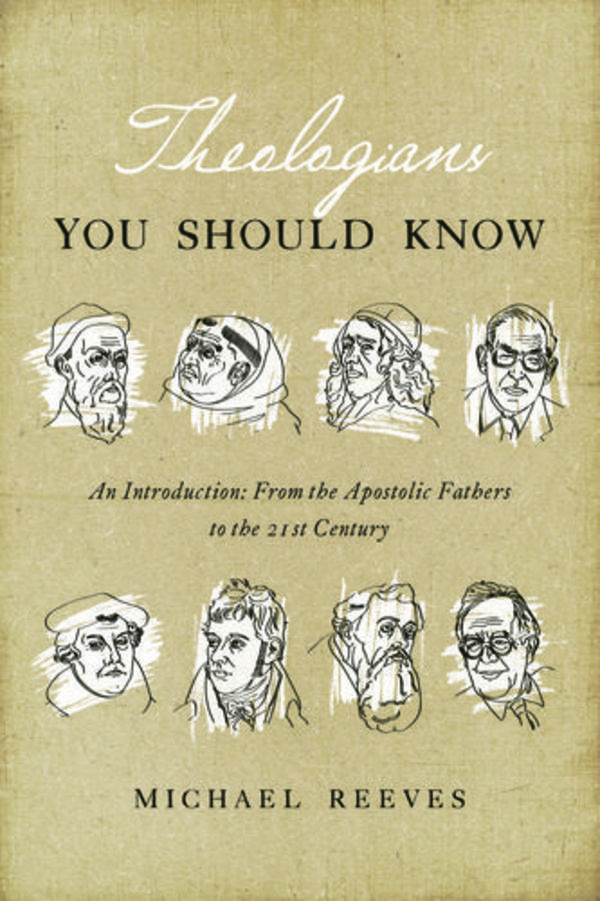 Theologians You Should Know: An Introduction from the Apostolic Fathers to the 21
Theologians You Should Know: An Introduction from the Apostolic Fathers to the 21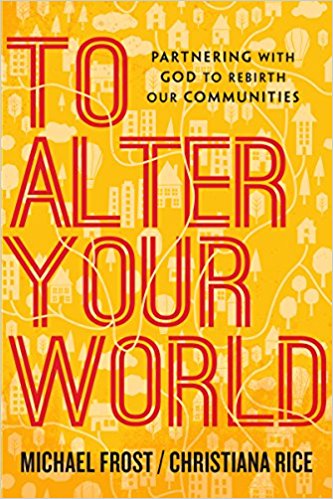 To Alter Your World: Partnering with God to Rebirth Our Communities Michael Frost & Christiana Rice (Forge America/IVP Praxis) $17.00 I suppose you know that we stock oodles of books about the missional church and, in more recent years, those who have taken missional church insights and applied them to daily discipleship. Michael Frost has given us great books both for congregations and for persons committed to robust, missional visions of vocation in the world but not of it. Wow, I love his stuff. But one sometimes wonders when an author has said most of what he or she has got within them to say. I rolled my eyes (sorry, Michael) when I heard there was yet another book by this prolific author. And then I started this, skimming the table of contents, dipping in here and there, looking at the always intriguing footnotes. And I was quickly hooked–from the evocative imagery of midwifery (okay, he had me at the quote by British home birth advocate Sheila Kitzinger) and birthing the new creation among us, I think this wonderful book reminds us yet again that we can truly partner with God, that we become agents of Christ’s own work in the world, that there is much required, even though it is all gift. Romans 8 uses this “all creation groaning” language and directly links it to childbirth.
To Alter Your World: Partnering with God to Rebirth Our Communities Michael Frost & Christiana Rice (Forge America/IVP Praxis) $17.00 I suppose you know that we stock oodles of books about the missional church and, in more recent years, those who have taken missional church insights and applied them to daily discipleship. Michael Frost has given us great books both for congregations and for persons committed to robust, missional visions of vocation in the world but not of it. Wow, I love his stuff. But one sometimes wonders when an author has said most of what he or she has got within them to say. I rolled my eyes (sorry, Michael) when I heard there was yet another book by this prolific author. And then I started this, skimming the table of contents, dipping in here and there, looking at the always intriguing footnotes. And I was quickly hooked–from the evocative imagery of midwifery (okay, he had me at the quote by British home birth advocate Sheila Kitzinger) and birthing the new creation among us, I think this wonderful book reminds us yet again that we can truly partner with God, that we become agents of Christ’s own work in the world, that there is much required, even though it is all gift. Romans 8 uses this “all creation groaning” language and directly links it to childbirth.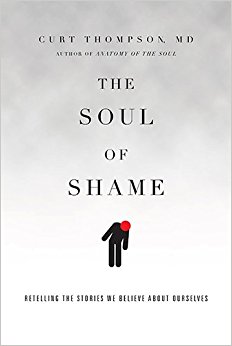 The Soul of Shame: Retelling the Stories We Believe About Ourselves Curt Thompson (IVP) $22.00 This splendid hardback could be a life-line for some of us who struggle with shame or recovering from some sense that we are not enough, not lovable, inadequate. In this sense, Thompson asserts, ” we are all infected with a spiritual disease. Its name is shame.”
The Soul of Shame: Retelling the Stories We Believe About Ourselves Curt Thompson (IVP) $22.00 This splendid hardback could be a life-line for some of us who struggle with shame or recovering from some sense that we are not enough, not lovable, inadequate. In this sense, Thompson asserts, ” we are all infected with a spiritual disease. Its name is shame.”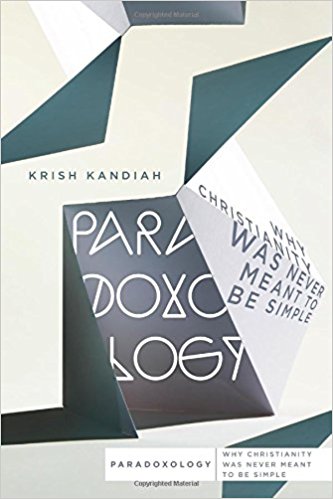 Paradoxology: Why Christianity Was Never Meant To Be Simple Krish Kandiah (IVP) $17.00 Okay, I have to say I haven’t looked at this much, but it is new and I’m so intrigued by it. People I respect – Scot McKnight, Jo Saxton, Eugene Cho — all endorse it with gusto. He starts with a wordy little joke in the first paragraph and says that if you get that paradox, there’s hope you’ll enjoy this book. Yep, there are a lot of paradoxes in the Bible and in Christian faith and this isn’t a book trying to “answer” them or explain them away. He invites us to live into the mystery, to embrace the seeming contradictions, to have a faith that is paradoxical. Every chapter is on a different part of the Bible or character, with titles like “The Abraham Paradox: The God Who Needs Nothing But Asks for Everything” or “The Job Paradox: The God Who Is Actively Inactive” or, from Esther, “The God Who Speaks Silently” or, from – hold on – one he calls “The Judas Paradox:The God Who Determines Our Free Will.” The ones about Jesus are not unfamiliar (being “Divinely Human”) and the one about the cross, while common place, I bet will be fabulous in Kandiah’s hands: “The God Who Wins as He Loses.” There’s more, but you get the drift. If this is your cup of tea, give us a call asap. I think you’ll want to read this in this upside down season.
Paradoxology: Why Christianity Was Never Meant To Be Simple Krish Kandiah (IVP) $17.00 Okay, I have to say I haven’t looked at this much, but it is new and I’m so intrigued by it. People I respect – Scot McKnight, Jo Saxton, Eugene Cho — all endorse it with gusto. He starts with a wordy little joke in the first paragraph and says that if you get that paradox, there’s hope you’ll enjoy this book. Yep, there are a lot of paradoxes in the Bible and in Christian faith and this isn’t a book trying to “answer” them or explain them away. He invites us to live into the mystery, to embrace the seeming contradictions, to have a faith that is paradoxical. Every chapter is on a different part of the Bible or character, with titles like “The Abraham Paradox: The God Who Needs Nothing But Asks for Everything” or “The Job Paradox: The God Who Is Actively Inactive” or, from Esther, “The God Who Speaks Silently” or, from – hold on – one he calls “The Judas Paradox:The God Who Determines Our Free Will.” The ones about Jesus are not unfamiliar (being “Divinely Human”) and the one about the cross, while common place, I bet will be fabulous in Kandiah’s hands: “The God Who Wins as He Loses.” There’s more, but you get the drift. If this is your cup of tea, give us a call asap. I think you’ll want to read this in this upside down season.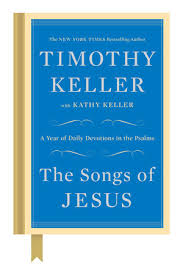 The Songs of Jesus: A Year of Daily Devotions in the Psalms Timothy & Kathy Keller (Viking) $19.95 Okay, I said this was a list for those who don’t want to read little Lenten devotionals, or books directly about the season of Lent. Fair enough. But this guide to the Psalms just seemed right to mention. The Songs of Jesus is a year’s worth of very short daily devotions, handsomely done with two color ink, gold-edged pages, a ribbon marker. But what should appeal is that these reflections and prayers are on the Psalms, by a serious, fine writer, and although you may resist a regimented devotional reading schedule, or maybe you already pray the hours with some daily office, this short collection of reflections on the church’s prayer book and the songbook of the ages, could be beneficial to many. I’m using it among other resources as I begin a class I’m teaching on the Psalms and wanted to commend it here.
The Songs of Jesus: A Year of Daily Devotions in the Psalms Timothy & Kathy Keller (Viking) $19.95 Okay, I said this was a list for those who don’t want to read little Lenten devotionals, or books directly about the season of Lent. Fair enough. But this guide to the Psalms just seemed right to mention. The Songs of Jesus is a year’s worth of very short daily devotions, handsomely done with two color ink, gold-edged pages, a ribbon marker. But what should appeal is that these reflections and prayers are on the Psalms, by a serious, fine writer, and although you may resist a regimented devotional reading schedule, or maybe you already pray the hours with some daily office, this short collection of reflections on the church’s prayer book and the songbook of the ages, could be beneficial to many. I’m using it among other resources as I begin a class I’m teaching on the Psalms and wanted to commend it here. 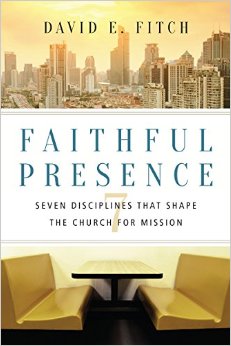 Faithful Presence: Seven Disciplines That Shape the Church for Mission David E. Fitch (Missio Alliance/IVP/Praxis) $17.00 This profound and important book deserves more than a shout out here in my list of suggested books for this month. I can tell you this much: Fitch starts off with a fine and generous overview of the much-discussed Oxford University Press book by UVA scholar James Davison Hunter, To Change the World. Many weighed in on that provocative book, but most agreed that he was right to say that the far left and the far right had similar weaknesses and that serious Christian reflection on impacting the culture should be a lot less ideological, a bit less idealistic, and much more attentive to how change actually transpires within late modernity. Fair enough.
Faithful Presence: Seven Disciplines That Shape the Church for Mission David E. Fitch (Missio Alliance/IVP/Praxis) $17.00 This profound and important book deserves more than a shout out here in my list of suggested books for this month. I can tell you this much: Fitch starts off with a fine and generous overview of the much-discussed Oxford University Press book by UVA scholar James Davison Hunter, To Change the World. Many weighed in on that provocative book, but most agreed that he was right to say that the far left and the far right had similar weaknesses and that serious Christian reflection on impacting the culture should be a lot less ideological, a bit less idealistic, and much more attentive to how change actually transpires within late modernity. Fair enough.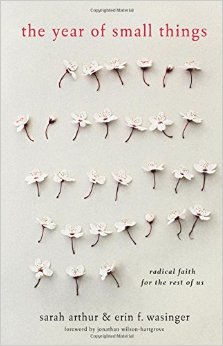 The Year of Small Things: Radical Faith for the Rest of Us Sarah Arthur & Erin F. Wasinger (Brazos Press) $17.99 I mentioned this new release a time or two before but have to tell you again that this is a perfect book to dip into during Lent. It isn’t a Lenten book, or even a devotional, but a set of memoir-like stories, a narrative that is beautifully-written, wonderfully-crafted, and powerfully told, as two women share how they and their families pledged to each other to take “baby steps” towards more faithful, radical, Christian discipleship. From Shane Claiborne and others we’ve heard in recent years about radical faith, missional living, alternative community, and how to serve the poor and marginalized. “Small things with great love” Mother Teresa advised, and so they try it, taking a year to move increasingly towards the things they most deeply want to do. How many of us live lives of “quiet desperation” as Thoreau put it, because we haven’t been intentional, don’t have the friends and support, can’t quite figure out how to take the time and energy to move towards living out our deepest convictions? This book will inspire you, help you, maybe be a companion and guide as these very literate and delightful women tell their own story. Leslie Leyland Fields calls is a “beautiful book that offers a mini-revolution that could shake up the world, or at least your neighborhood – and doesn’t require growing kale or living in a hut.” Ha. Unless you need to move into a hut or give away all your wealth this Lent, this book would be a fine way to spend some of your reading time this season. Take up The Year of Small Things and you will be glad you did.
The Year of Small Things: Radical Faith for the Rest of Us Sarah Arthur & Erin F. Wasinger (Brazos Press) $17.99 I mentioned this new release a time or two before but have to tell you again that this is a perfect book to dip into during Lent. It isn’t a Lenten book, or even a devotional, but a set of memoir-like stories, a narrative that is beautifully-written, wonderfully-crafted, and powerfully told, as two women share how they and their families pledged to each other to take “baby steps” towards more faithful, radical, Christian discipleship. From Shane Claiborne and others we’ve heard in recent years about radical faith, missional living, alternative community, and how to serve the poor and marginalized. “Small things with great love” Mother Teresa advised, and so they try it, taking a year to move increasingly towards the things they most deeply want to do. How many of us live lives of “quiet desperation” as Thoreau put it, because we haven’t been intentional, don’t have the friends and support, can’t quite figure out how to take the time and energy to move towards living out our deepest convictions? This book will inspire you, help you, maybe be a companion and guide as these very literate and delightful women tell their own story. Leslie Leyland Fields calls is a “beautiful book that offers a mini-revolution that could shake up the world, or at least your neighborhood – and doesn’t require growing kale or living in a hut.” Ha. Unless you need to move into a hut or give away all your wealth this Lent, this book would be a fine way to spend some of your reading time this season. Take up The Year of Small Things and you will be glad you did.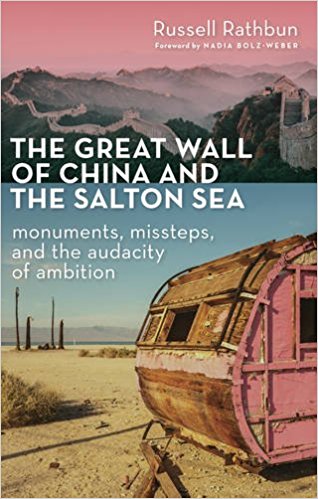 The Great Wall of China and the Salton Sea: Monuments, Missteps, and the Audacity of Ambition Russell Rathbun (Eerdmans) $21.99 Oh, man-o-man, this deserves a longer review and I hope I can get back to this to tell you even more about how I liked it so. I’ve been pondering this since I lost a bit too much sleep staying up reading (you’ve heard that phrase “I couldn’t put it down,” right?) This is an odd book, about an odd topic, and it is hard to say if it is creative nonfiction, a memoir of sorts, a travelogue, a family history, or some crazy-eyed, made-up novel. I say this mostly because a book he wrote a decade ago, a kind of novel called Post Rapture Radio, was so genre bending and spectacular (don’t get me started on how that wonderfully messed with my mind.) Since that dive into the deep end of the creative waters, Rathbun remains a pastor at the non-traditional House of Mercy (serving along side the excellent wordsmith and preacher herself, Debbie Blue) in Saint Paul, MN. That dear Nadia Bolz-Weber wrote a great introduction to this makes sense. She’s a fine, rather non-conventional pastor of a church for the “accidental saints” and other assorted odd-ball, unchurched, so a soul-mate of RR, I suppose, and a great storyteller. So she gets him.
The Great Wall of China and the Salton Sea: Monuments, Missteps, and the Audacity of Ambition Russell Rathbun (Eerdmans) $21.99 Oh, man-o-man, this deserves a longer review and I hope I can get back to this to tell you even more about how I liked it so. I’ve been pondering this since I lost a bit too much sleep staying up reading (you’ve heard that phrase “I couldn’t put it down,” right?) This is an odd book, about an odd topic, and it is hard to say if it is creative nonfiction, a memoir of sorts, a travelogue, a family history, or some crazy-eyed, made-up novel. I say this mostly because a book he wrote a decade ago, a kind of novel called Post Rapture Radio, was so genre bending and spectacular (don’t get me started on how that wonderfully messed with my mind.) Since that dive into the deep end of the creative waters, Rathbun remains a pastor at the non-traditional House of Mercy (serving along side the excellent wordsmith and preacher herself, Debbie Blue) in Saint Paul, MN. That dear Nadia Bolz-Weber wrote a great introduction to this makes sense. She’s a fine, rather non-conventional pastor of a church for the “accidental saints” and other assorted odd-ball, unchurched, so a soul-mate of RR, I suppose, and a great storyteller. So she gets him.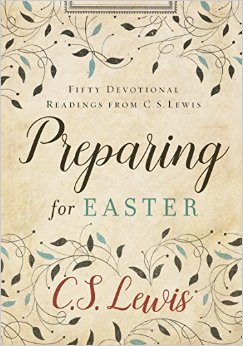 Preparing for Easter: FIfty Devotional Readings from C.S. Lewis C.S. Lewis (HarperOne) $17.99 My goodness, I could hardly believe it that no one had thought of compiling a book like this before: truly, this is almost like a brand new Lewis book. It deftly puts together fifty excerpts of great Lewis reflections, each germane in its own way, to our own journey towards the cross and the vindicating victory of Easter. Senior Vice President and Executive Editor of HarperOne Michael Maudlin has a very nice introduction that I’ve already read twice. This book is the embodiment of a splendid idea, a handsome, compact volume, offering seven readings a week for seven weeks (and an extra for Easter Day.) Excerpts are from an array of sources, of course from Mere Christianity and The Weight of Glory and Screwtape Letters and God in the Dock but also from some of the Narnia books, the science fiction “Space” trilogy, from his personal letters, from his own Bible studies (such as Reflections on the Psalms) and even a few poems. Lewis, you know, called the resurrection the “grand miracle.” Enjoy reading all about it in this lovely, lovely, new volume.
Preparing for Easter: FIfty Devotional Readings from C.S. Lewis C.S. Lewis (HarperOne) $17.99 My goodness, I could hardly believe it that no one had thought of compiling a book like this before: truly, this is almost like a brand new Lewis book. It deftly puts together fifty excerpts of great Lewis reflections, each germane in its own way, to our own journey towards the cross and the vindicating victory of Easter. Senior Vice President and Executive Editor of HarperOne Michael Maudlin has a very nice introduction that I’ve already read twice. This book is the embodiment of a splendid idea, a handsome, compact volume, offering seven readings a week for seven weeks (and an extra for Easter Day.) Excerpts are from an array of sources, of course from Mere Christianity and The Weight of Glory and Screwtape Letters and God in the Dock but also from some of the Narnia books, the science fiction “Space” trilogy, from his personal letters, from his own Bible studies (such as Reflections on the Psalms) and even a few poems. Lewis, you know, called the resurrection the “grand miracle.” Enjoy reading all about it in this lovely, lovely, new volume.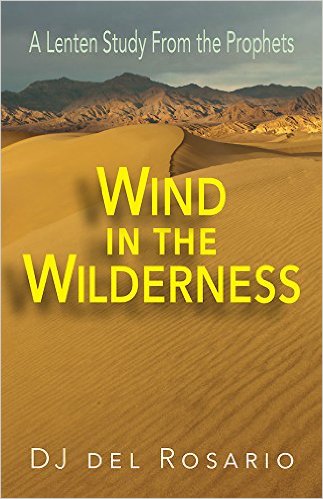 Wind in the Wilderness: A Lenten Study from the Prophets DJ del Rosario (Abingdon Press) $12.99 Each year the United Methodist publisher, Abingdon Press, does two 7 week Lenten Bible study guides for small group or Sunday school class use. One is always themed (while the other is a study book for the given Lectionary texts for Lent.) This one is the themed one this year drawing on the prophets and what it means to live into God’s vision of justice. DJ del Rosario is an energetic pastor of a UMC in the Pacific Northwest and works with a project he founded that resources those who work with young adults called Spark12.
Wind in the Wilderness: A Lenten Study from the Prophets DJ del Rosario (Abingdon Press) $12.99 Each year the United Methodist publisher, Abingdon Press, does two 7 week Lenten Bible study guides for small group or Sunday school class use. One is always themed (while the other is a study book for the given Lectionary texts for Lent.) This one is the themed one this year drawing on the prophets and what it means to live into God’s vision of justice. DJ del Rosario is an energetic pastor of a UMC in the Pacific Northwest and works with a project he founded that resources those who work with young adults called Spark12.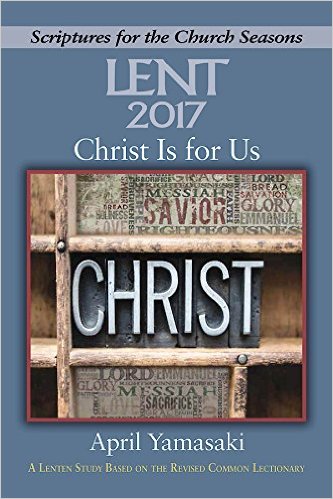 Lent 2017 Christ Is For Us: A Lenten Study Based on the Revised Common Lectionary April Yamasaki (Abingdon Press) $12.99 Just like they do at Advent, Abingdon releases not only a themed Bible study guide but a small group resource allowing classes or groups to reflect on the Sunday lectionary texts for the upcoming Lenten season. Yamasaki is the pastor of Emmanuel Mennonite Church in Abbotsford, British Columbia, and has written good stuff on creativity (Spark) and one called Sacred Pause, on spiritual formation and personal renewal. Here she offers 7 studies on the upcoming Lectionary texts, offering a few pages of insight, side bars, background, and good discussion questions about how to live in this season which focuses on Christ’s commitment to us, in His grace. Very nicely done.
Lent 2017 Christ Is For Us: A Lenten Study Based on the Revised Common Lectionary April Yamasaki (Abingdon Press) $12.99 Just like they do at Advent, Abingdon releases not only a themed Bible study guide but a small group resource allowing classes or groups to reflect on the Sunday lectionary texts for the upcoming Lenten season. Yamasaki is the pastor of Emmanuel Mennonite Church in Abbotsford, British Columbia, and has written good stuff on creativity (Spark) and one called Sacred Pause, on spiritual formation and personal renewal. Here she offers 7 studies on the upcoming Lectionary texts, offering a few pages of insight, side bars, background, and good discussion questions about how to live in this season which focuses on Christ’s commitment to us, in His grace. Very nicely done.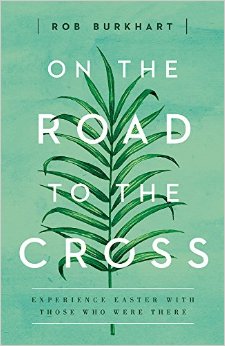 On the Road to the Cross: Experience Easter With Those Who Were There Rob Burkhart (Abingdon) $16.99 This is not only a useful study of the (shall we say) minor characters who witnessed Christ’s last week (and there are a lot of them — from Simon the Leper to Malchus, from Nicodemus to Simon of Cyrene, to Mary Magdalene, of course) but offers us a creative way to enter into the story: before each set of meditations there is a fiction-like dramatization of the encounter being explored, each offering their own unique perspective. Anybody who appreciates the art of “Biblical storytelling” or creative writing will enjoy this.
On the Road to the Cross: Experience Easter With Those Who Were There Rob Burkhart (Abingdon) $16.99 This is not only a useful study of the (shall we say) minor characters who witnessed Christ’s last week (and there are a lot of them — from Simon the Leper to Malchus, from Nicodemus to Simon of Cyrene, to Mary Magdalene, of course) but offers us a creative way to enter into the story: before each set of meditations there is a fiction-like dramatization of the encounter being explored, each offering their own unique perspective. Anybody who appreciates the art of “Biblical storytelling” or creative writing will enjoy this.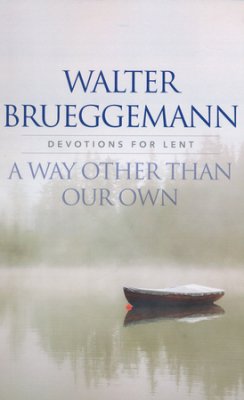 A Way Other Than Our Own: Devotions for Lent Walter Brueggemann (WJK) $13.00 “We begin our Lenten journey,” Brueggemann reminds us, “addressed by the remarkable assurance that the God who summons us is the God who goes along with us.” If Lent recalls times of wilderness and wandering (from newly freed Hebrew slaves in exile to Jesus’ temptation in the desert) this book will help us explore our journey into uncomfortable places revealing paths we ourselves might not have chosen. And leave it to Walt to help evoke within us a fresh imagination of what that may entail.
A Way Other Than Our Own: Devotions for Lent Walter Brueggemann (WJK) $13.00 “We begin our Lenten journey,” Brueggemann reminds us, “addressed by the remarkable assurance that the God who summons us is the God who goes along with us.” If Lent recalls times of wilderness and wandering (from newly freed Hebrew slaves in exile to Jesus’ temptation in the desert) this book will help us explore our journey into uncomfortable places revealing paths we ourselves might not have chosen. And leave it to Walt to help evoke within us a fresh imagination of what that may entail.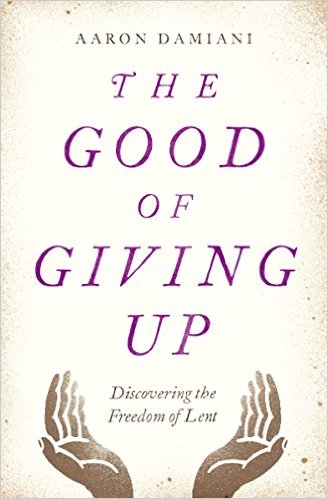 The Good of Giving Up: Discovering the Freedom of Lent Aaron Damiani (Moody Press) $12.66 Although this seems to be designed for those who are not used to the customers of practicing Lent, or who may even be suspicious of such practices, it is ideal not just for beginners but for anyone; I think it is a fantastic read. The author is the lead pastor of Immanuel Anglican Church in Chicago’s Uptown neighborhood (and has degrees from Moody Bible Institute and the evangelically-minded Wheaton College.) I love the silk-screened hands on the cover, the hint of purple ink on many pages, the lovely feel of this good paperback. But the big picture it offers — a “mercifully short” history of Lent, some of the basic reasons for honoring this season of the church calendar, some replies to some objections to the traditions — really does provide a “case for Lent” which will be inspiring for us all.
The Good of Giving Up: Discovering the Freedom of Lent Aaron Damiani (Moody Press) $12.66 Although this seems to be designed for those who are not used to the customers of practicing Lent, or who may even be suspicious of such practices, it is ideal not just for beginners but for anyone; I think it is a fantastic read. The author is the lead pastor of Immanuel Anglican Church in Chicago’s Uptown neighborhood (and has degrees from Moody Bible Institute and the evangelically-minded Wheaton College.) I love the silk-screened hands on the cover, the hint of purple ink on many pages, the lovely feel of this good paperback. But the big picture it offers — a “mercifully short” history of Lent, some of the basic reasons for honoring this season of the church calendar, some replies to some objections to the traditions — really does provide a “case for Lent” which will be inspiring for us all. Journey to the Cross: Devotions for Lent Will Walker & Kendal Haug (New Growth Press) $15.99 New Growth Press is known for their “gospel centered life” curriculum (which Will Walker co-wrote) and for books that often help us apply the powerful gift of God’s grace to our own inner foibles and conundrums. That is, they consistently teach not only that God offers saving grace through His mercy, but that this same gospel transforms us, over time, from the inside out, as we cling increasingly to His promises. Nearly all of their many books remind me of that verse that promises that God who began a good work in us will bring it to completion, in Christ. Here, they bring that gospel-centered emphasis on the very good news to this season designed to re-focus our faith, allow God to re-calibrate our hearts, and move us closer to the heart of Easter. This is a forty-day devotional in which Dan Doriani (Professor and Vice President of Covenant Theological Seminary) calls “a wise, pastoral, and Christ-centered approach to Lent. It focuses on Jesus’ journey to the cross. It points to Jesus’ love, devotion, and sacrifice, and so enriches our preparation to receive his gracious redemption.” Pastor Scotty Smith (who has written marvelous book of prose and of prayers) says Journey to the Cross is “the finest devotional resource in my library for the season of Lent.”
Journey to the Cross: Devotions for Lent Will Walker & Kendal Haug (New Growth Press) $15.99 New Growth Press is known for their “gospel centered life” curriculum (which Will Walker co-wrote) and for books that often help us apply the powerful gift of God’s grace to our own inner foibles and conundrums. That is, they consistently teach not only that God offers saving grace through His mercy, but that this same gospel transforms us, over time, from the inside out, as we cling increasingly to His promises. Nearly all of their many books remind me of that verse that promises that God who began a good work in us will bring it to completion, in Christ. Here, they bring that gospel-centered emphasis on the very good news to this season designed to re-focus our faith, allow God to re-calibrate our hearts, and move us closer to the heart of Easter. This is a forty-day devotional in which Dan Doriani (Professor and Vice President of Covenant Theological Seminary) calls “a wise, pastoral, and Christ-centered approach to Lent. It focuses on Jesus’ journey to the cross. It points to Jesus’ love, devotion, and sacrifice, and so enriches our preparation to receive his gracious redemption.” Pastor Scotty Smith (who has written marvelous book of prose and of prayers) says Journey to the Cross is “the finest devotional resource in my library for the season of Lent.” 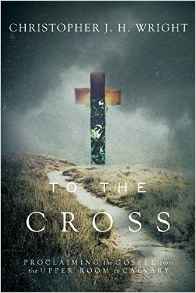 To the Cross: Proclaiming the Gospel from the Upper Room to Calvary Christopher J.H. Wright (IVP) $16.00 Wright is an Old Testament scholar, author of numerous expert books on the unfolding drama of the Old Testament story (The Mission of God and Old Testament Ethics for the People of God are both nothing short of magisterial.) He’s a name you should know.
To the Cross: Proclaiming the Gospel from the Upper Room to Calvary Christopher J.H. Wright (IVP) $16.00 Wright is an Old Testament scholar, author of numerous expert books on the unfolding drama of the Old Testament story (The Mission of God and Old Testament Ethics for the People of God are both nothing short of magisterial.) He’s a name you should know.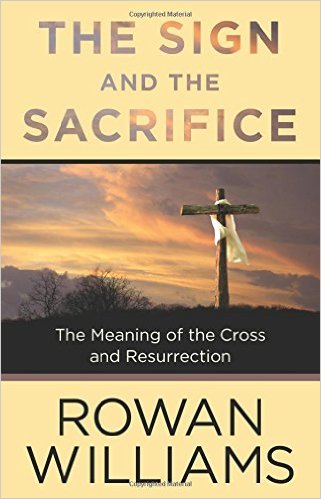 The Sign and the Sacrifice: The Meaning of the Cross and Resurrection Rowan Williams (WJK) $15.00 There is little doubt that the former Archbishop of Canterbury is one of the most fertile and widely respected minds within the global church; many in various quarters of the worldwide Body of Christ read his books eagerly. In recent years Williams (now a Master at Magdalene College in Cambridge) has done exceptionally weighty volumes on political philosophy and on linguistics and two lovely, brief books published by Eerdmans, one on becoming a Christian and another on being a disciple. Here in The Sign and the Sacrifice Rowan Williams brings his deep thoughtfulness and broad learning to bear in what is a fresh look at the very heart of the gospel.
The Sign and the Sacrifice: The Meaning of the Cross and Resurrection Rowan Williams (WJK) $15.00 There is little doubt that the former Archbishop of Canterbury is one of the most fertile and widely respected minds within the global church; many in various quarters of the worldwide Body of Christ read his books eagerly. In recent years Williams (now a Master at Magdalene College in Cambridge) has done exceptionally weighty volumes on political philosophy and on linguistics and two lovely, brief books published by Eerdmans, one on becoming a Christian and another on being a disciple. Here in The Sign and the Sacrifice Rowan Williams brings his deep thoughtfulness and broad learning to bear in what is a fresh look at the very heart of the gospel.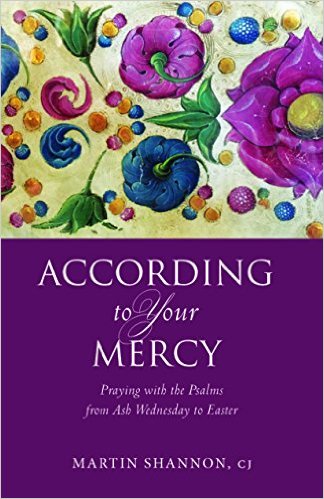 According to Your Mercy: Praying with the Psalms from Ash Wednesday to Easter Martin Shannon (Paraclete) $14.99 Father Shannon is an Episcopal priest who lives with the Community of Jesus on Cape Cod (home to Paraclete Press.) He holds a PhD in Liturgical Studies from the Catholic University of America and has written the lovely little book All God’s Angels. Don’t let the flowery cover fool you, this is not fluff.
According to Your Mercy: Praying with the Psalms from Ash Wednesday to Easter Martin Shannon (Paraclete) $14.99 Father Shannon is an Episcopal priest who lives with the Community of Jesus on Cape Cod (home to Paraclete Press.) He holds a PhD in Liturgical Studies from the Catholic University of America and has written the lovely little book All God’s Angels. Don’t let the flowery cover fool you, this is not fluff.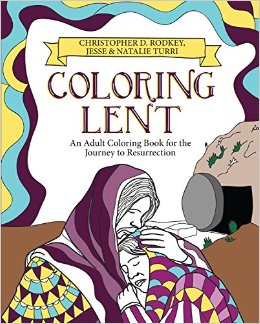 Coloring Lent: An Adult Coloring Book for the Journey to Resurrection by Christopher D. Rodkey & Jesse & Natalie Turri (Chalice Press) $12.99 Well, I hope you saw our long review of this in a previous BookNotes a few weeks ago. The text of this thoughtful devotional guide and adult coloring book is written by our friend and neighbor here in Dallastown, Chris Rodkey, a progressive UCC pastor who serves his church and our town well. This is such a rich and interesting concept — an ecumenical, adult coloring book that follows the key texts of the Revised Common Lectionary for Lent — that we are happy to promote it. In fact, Chris will lead us through a couple of these devotionals, telling us a bit about the interpretation he brings to the text and the Story at a coloring book party here at the shop (on March 21st — stay tuned!) You can
Coloring Lent: An Adult Coloring Book for the Journey to Resurrection by Christopher D. Rodkey & Jesse & Natalie Turri (Chalice Press) $12.99 Well, I hope you saw our long review of this in a previous BookNotes a few weeks ago. The text of this thoughtful devotional guide and adult coloring book is written by our friend and neighbor here in Dallastown, Chris Rodkey, a progressive UCC pastor who serves his church and our town well. This is such a rich and interesting concept — an ecumenical, adult coloring book that follows the key texts of the Revised Common Lectionary for Lent — that we are happy to promote it. In fact, Chris will lead us through a couple of these devotionals, telling us a bit about the interpretation he brings to the text and the Story at a coloring book party here at the shop (on March 21st — stay tuned!) You can 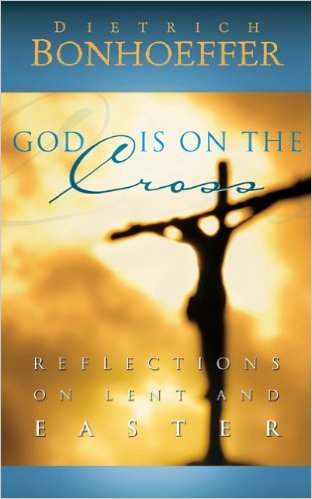 God Is on the Cross Reflections on Lent and Easter Dietrich Bonhoeffer (WJK) $14.00 Perhaps you have read (as many have) the compilation of Bonhoeffer excerpts, letters, prayers, and readings, turned into a powerful Advent devotional called God Is in the Manger.
God Is on the Cross Reflections on Lent and Easter Dietrich Bonhoeffer (WJK) $14.00 Perhaps you have read (as many have) the compilation of Bonhoeffer excerpts, letters, prayers, and readings, turned into a powerful Advent devotional called God Is in the Manger.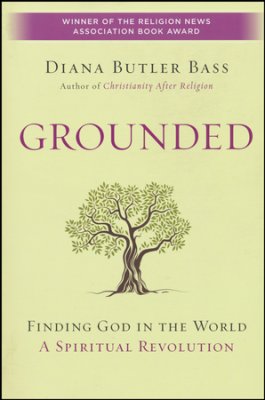 Grounded: Finding God in the World — A Spiritual Revolution Diana Butler Bass (HarperOne) $14.99 I’ve read this wonderfully written book twice, and parts even more often. I reviewed it (mostly) favorably when it came out in paperback (and I was honored to see a line lifted from my BookNotes column enhancing the pages of blurbs on the new paperback version that just came out.) I do not agree with everything Diana says, here, and wish she’d have given orthodox, historic evangelicalism a bit better spin, although much of her critique is not only valid, but vital.
Grounded: Finding God in the World — A Spiritual Revolution Diana Butler Bass (HarperOne) $14.99 I’ve read this wonderfully written book twice, and parts even more often. I reviewed it (mostly) favorably when it came out in paperback (and I was honored to see a line lifted from my BookNotes column enhancing the pages of blurbs on the new paperback version that just came out.) I do not agree with everything Diana says, here, and wish she’d have given orthodox, historic evangelicalism a bit better spin, although much of her critique is not only valid, but vital.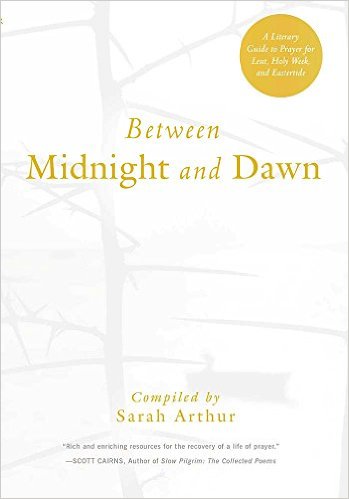 Between Midnight and Dawn compiled by Sarah Arthur (Paraclete) $18.99 We know many BookNotes readers have ordered Sarah Arthur’s similar prayer guides using good literature (the one for Advent was called Light Upon Light and the one for Ordinary Time is called At the Still Point.) This is ideal for the liturgical seasons of Lent, Holy Week and Eastertide, joined by a company of poets and novelists from across the centuries. Kathleen Norris calls is a “delight… so extraordinary a collection” and the late Phyllis Tickles called it “a thing of beauty.” By the way, Sarah Arthur is getting all sort of attention (as in our last BookNotes newsletter) for her recently released co-authored memoir cum guide to radical Christian discipleship called A Year of Small Things: Radical Faith for the Rest of Us.)
Between Midnight and Dawn compiled by Sarah Arthur (Paraclete) $18.99 We know many BookNotes readers have ordered Sarah Arthur’s similar prayer guides using good literature (the one for Advent was called Light Upon Light and the one for Ordinary Time is called At the Still Point.) This is ideal for the liturgical seasons of Lent, Holy Week and Eastertide, joined by a company of poets and novelists from across the centuries. Kathleen Norris calls is a “delight… so extraordinary a collection” and the late Phyllis Tickles called it “a thing of beauty.” By the way, Sarah Arthur is getting all sort of attention (as in our last BookNotes newsletter) for her recently released co-authored memoir cum guide to radical Christian discipleship called A Year of Small Things: Radical Faith for the Rest of Us.)  40 Days of Decrease: A Different Kind of Hunger. A Different Kind of Fast Alicia Britt Chole (Thomas Nelson) $14.99 This book came out last year and we’ve already had more people asking about it this month than last year. I think I’ll just copy here what I wrote last year:
40 Days of Decrease: A Different Kind of Hunger. A Different Kind of Fast Alicia Britt Chole (Thomas Nelson) $14.99 This book came out last year and we’ve already had more people asking about it this month than last year. I think I’ll just copy here what I wrote last year: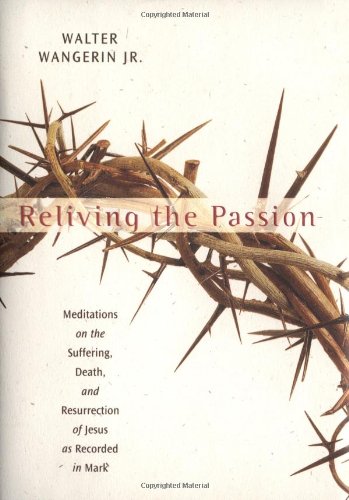 Reliving the Passion: Meditations on the Suffering, Death, and Resurrection of Jesus as Recorded in Mark Walter Wangerin, Jr (Zondervan) $14.99 I love hand-sized, compact hardbacks and so appreciate the fine, fine writing in this lovely little book. I suppose you know Wangerin who has garnered award after award for his fantasy novels, his memoirs, his Biblical work, his children’s books and more. As a poet and preacher and, formerly, at least, an inner city pastor, this passionate Lutheran leader reminds us through Scripture and storytelling that “we crucify and we are crucified, are condemned and redeemed.” Eugene Peterson, who says he is one of the “master storytellers of our generation” insists that Wangerin “is at his best, writing on and around the Master Story.” This isn’t new and we’ve described it other years here in BookNotes, but wanted to remind you of it again. Not to be missed.
Reliving the Passion: Meditations on the Suffering, Death, and Resurrection of Jesus as Recorded in Mark Walter Wangerin, Jr (Zondervan) $14.99 I love hand-sized, compact hardbacks and so appreciate the fine, fine writing in this lovely little book. I suppose you know Wangerin who has garnered award after award for his fantasy novels, his memoirs, his Biblical work, his children’s books and more. As a poet and preacher and, formerly, at least, an inner city pastor, this passionate Lutheran leader reminds us through Scripture and storytelling that “we crucify and we are crucified, are condemned and redeemed.” Eugene Peterson, who says he is one of the “master storytellers of our generation” insists that Wangerin “is at his best, writing on and around the Master Story.” This isn’t new and we’ve described it other years here in BookNotes, but wanted to remind you of it again. Not to be missed.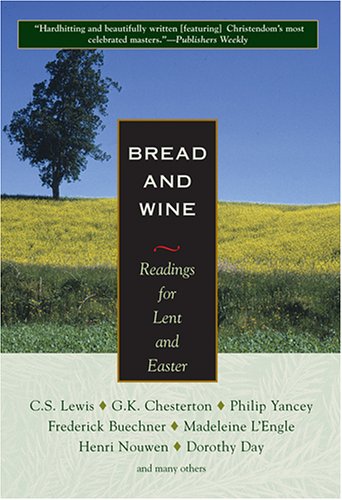 Bread and Wine: Readings for Lent and Easter (Plough Publishing) $24.00 This handsome hardback has brief readings from some of the world’s leading literary and spiritual writers, offering just enough meaty and aesthetically rich writing to please and challenge anyone who wants to dip in to a more mature sourcebook. Bread and Wine (like its companion Advent volume, Watch for the Light) draws wonder-full excerpts from C.S. Lewis, Augustine, Phil Yancey, Jane Kenyon; from Frederick Buechner, Dorothy Day, Wendell Berry, Watchman Nee. As you can see, this is really diverse, delightful, thoughtful. A wonderful devotional that you will keep for a lifetime, with each several- page excerpt linked to a brief Biblical text, this is a true gift from the tremendous thinkers and publishers at Plough Publishing.
Bread and Wine: Readings for Lent and Easter (Plough Publishing) $24.00 This handsome hardback has brief readings from some of the world’s leading literary and spiritual writers, offering just enough meaty and aesthetically rich writing to please and challenge anyone who wants to dip in to a more mature sourcebook. Bread and Wine (like its companion Advent volume, Watch for the Light) draws wonder-full excerpts from C.S. Lewis, Augustine, Phil Yancey, Jane Kenyon; from Frederick Buechner, Dorothy Day, Wendell Berry, Watchman Nee. As you can see, this is really diverse, delightful, thoughtful. A wonderful devotional that you will keep for a lifetime, with each several- page excerpt linked to a brief Biblical text, this is a true gift from the tremendous thinkers and publishers at Plough Publishing.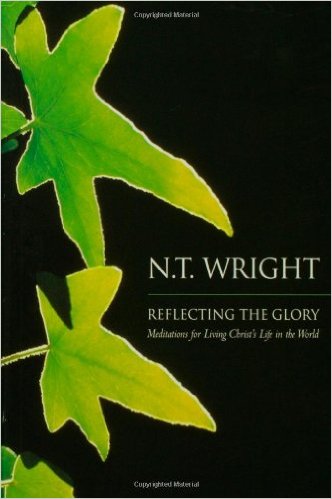 Reflecting the Glory: Meditation for Living Christ’s Life in the World N.T. Wright (Augsburg) $14.99 Although we’ve fretted about the small print, this is just brilliant, with N.T. Wright doing his exceptional New Testament reflections here on New Testament themes (much from Galatians, actually, and more, for Lent.) Solid and stimulating Biblical mediations, one for each day some have said this is the richest Biblical devotional they’ve ever read…
Reflecting the Glory: Meditation for Living Christ’s Life in the World N.T. Wright (Augsburg) $14.99 Although we’ve fretted about the small print, this is just brilliant, with N.T. Wright doing his exceptional New Testament reflections here on New Testament themes (much from Galatians, actually, and more, for Lent.) Solid and stimulating Biblical mediations, one for each day some have said this is the richest Biblical devotional they’ve ever read… 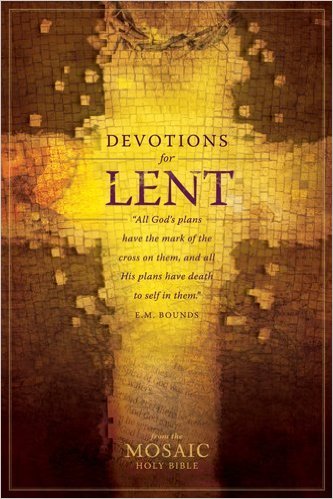 Devotions for Lent from the Mosaic Bible (Tyndale) $2.99 This is a very handsome, pocket sized booklet that has forty short readings, will full color art on creamy paper, with some Latin text, Celtic cross illumination, quotes from ancient saints, and liturgical prayers. The print is very small (but you will still appreciate the nicely crafted fonts and page design, tiny as it is.) We have promoted the wonderful Mosaic Bible which is an “ancient future” sort of product, in the contemporary New Living Translation, that has sacred art, iconography of sorts, and a prayerful, artful feel. This little pocket book is drawn from readings and devotions and prayers from that Bible edition. A treasure to carry around for praying throughout the day, to take to work or school, or to give away prodigally. Kudos to Tyndale for this unique offering.
Devotions for Lent from the Mosaic Bible (Tyndale) $2.99 This is a very handsome, pocket sized booklet that has forty short readings, will full color art on creamy paper, with some Latin text, Celtic cross illumination, quotes from ancient saints, and liturgical prayers. The print is very small (but you will still appreciate the nicely crafted fonts and page design, tiny as it is.) We have promoted the wonderful Mosaic Bible which is an “ancient future” sort of product, in the contemporary New Living Translation, that has sacred art, iconography of sorts, and a prayerful, artful feel. This little pocket book is drawn from readings and devotions and prayers from that Bible edition. A treasure to carry around for praying throughout the day, to take to work or school, or to give away prodigally. Kudos to Tyndale for this unique offering.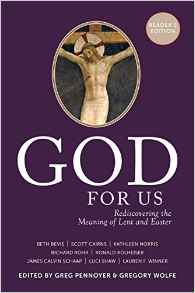 God For Us: Rediscovering the Meaning of Lent and Easter Reader’s Edition edited by Greg Pennoyer & Gregory Wolfe (Paraclete) $18.99 This was once, like its companion Advent book called God With Us, available in a handsome hardback laden with full color art produced on glossy paper. It was expensive and is now out of print. We sadly do not have any of those any more.
God For Us: Rediscovering the Meaning of Lent and Easter Reader’s Edition edited by Greg Pennoyer & Gregory Wolfe (Paraclete) $18.99 This was once, like its companion Advent book called God With Us, available in a handsome hardback laden with full color art produced on glossy paper. It was expensive and is now out of print. We sadly do not have any of those any more.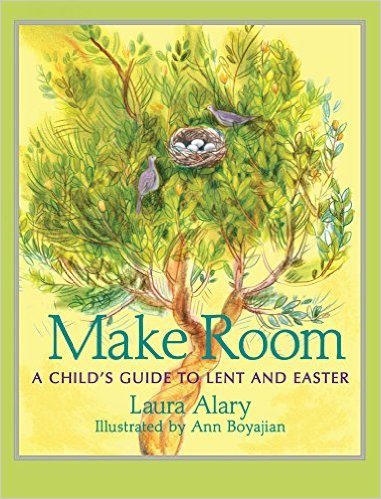 Make Room: A Child’s Guide to Lent and Easter Laura
Make Room: A Child’s Guide to Lent and Easter Laura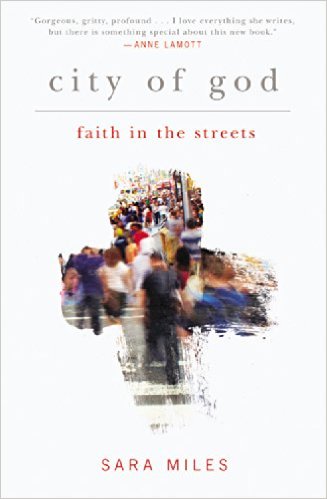 City of God: Faith in the Streets Sarah Miles (Jericho Books) $16.00 We love the extraordinary writing and remarkable storytelling of colorful Episcopalian convert and author and activist Sarah Miles. We recommend her stunning story in Take This Bread and the exceptionally moving, feisty, raw Jesus Freak. Her City of God (now out in paperback) is a further rumination on her life among the under-resourced in the Bay area of San Francisco, working out of the famously eccentric St. Gregory’s, framed by her experiences on Ash Wednesday, make this a memoir well suited as a Lenten reflection.
City of God: Faith in the Streets Sarah Miles (Jericho Books) $16.00 We love the extraordinary writing and remarkable storytelling of colorful Episcopalian convert and author and activist Sarah Miles. We recommend her stunning story in Take This Bread and the exceptionally moving, feisty, raw Jesus Freak. Her City of God (now out in paperback) is a further rumination on her life among the under-resourced in the Bay area of San Francisco, working out of the famously eccentric St. Gregory’s, framed by her experiences on Ash Wednesday, make this a memoir well suited as a Lenten reflection.


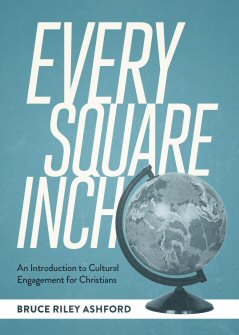 Every Square Inch: An Introduction to Cultural Engagement for Christians Bruce Riley Ashford (Lexham Press) $14.99 It is no secret that the “every square inch” tagline for Jubilee 2017 was drawn from a famous speech by Dutch public theologian and prime minister Abraham Kuyper. This little treasure of a book works out something like a modern Kuyperian vision for how faith impacts our everyday lives, how we should be involved with culture, and how to think through questions facing you and your church and community in these contentious times.
Every Square Inch: An Introduction to Cultural Engagement for Christians Bruce Riley Ashford (Lexham Press) $14.99 It is no secret that the “every square inch” tagline for Jubilee 2017 was drawn from a famous speech by Dutch public theologian and prime minister Abraham Kuyper. This little treasure of a book works out something like a modern Kuyperian vision for how faith impacts our everyday lives, how we should be involved with culture, and how to think through questions facing you and your church and community in these contentious times.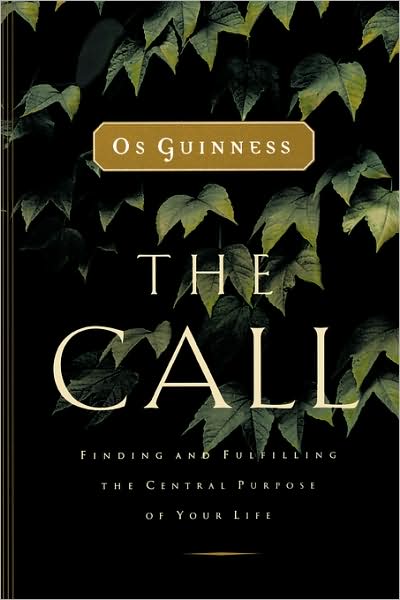 The Call: Finding and Fulfilling The Central Purpose of Your Life Os Guinness (Thomas Nelson) $17.99 Everywhere I go I meet remarkable people doing extraordinary work, leading conversations about faith and the marketplace, vocation and work, making a difference in big and small ways. Often, those who are the most articulate and passionate and admirable about their vocations almost always tell me, when we get around to talking about those “aha” moments that were most transforming and impactful for them, about their love for this book. It is essential, and we feature it every year at Jubilee, despite it being eloquent and mature in it’s literary style. You know I’ve talked about it before, and even wrote about it as my choice for a “must read” book in my chapter in the collection of book reviews called Besides the Bible: 100 Books… We are glad to offer it in this sale list now.
The Call: Finding and Fulfilling The Central Purpose of Your Life Os Guinness (Thomas Nelson) $17.99 Everywhere I go I meet remarkable people doing extraordinary work, leading conversations about faith and the marketplace, vocation and work, making a difference in big and small ways. Often, those who are the most articulate and passionate and admirable about their vocations almost always tell me, when we get around to talking about those “aha” moments that were most transforming and impactful for them, about their love for this book. It is essential, and we feature it every year at Jubilee, despite it being eloquent and mature in it’s literary style. You know I’ve talked about it before, and even wrote about it as my choice for a “must read” book in my chapter in the collection of book reviews called Besides the Bible: 100 Books… We are glad to offer it in this sale list now. 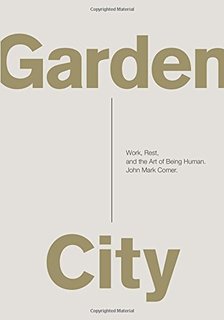 Garden City: Work, Rest, and the Art of Being Human. John Mark Comer (Zondervan) $19.99 In recent decades there has been an understandable emphasis in some quarters saying that it isn’t what you do that matters, but who you are. The mid-twentieth century commitment to materialism and corporate culture over-emphasized success, status, prestige, accomplishment, productivity, making us all cogs in the wheels of progress and modernity. So wise people (not least those in the counter-culture) pushed back against that – we need not find our worth in our jobs! Agreed.
Garden City: Work, Rest, and the Art of Being Human. John Mark Comer (Zondervan) $19.99 In recent decades there has been an understandable emphasis in some quarters saying that it isn’t what you do that matters, but who you are. The mid-twentieth century commitment to materialism and corporate culture over-emphasized success, status, prestige, accomplishment, productivity, making us all cogs in the wheels of progress and modernity. So wise people (not least those in the counter-culture) pushed back against that – we need not find our worth in our jobs! Agreed.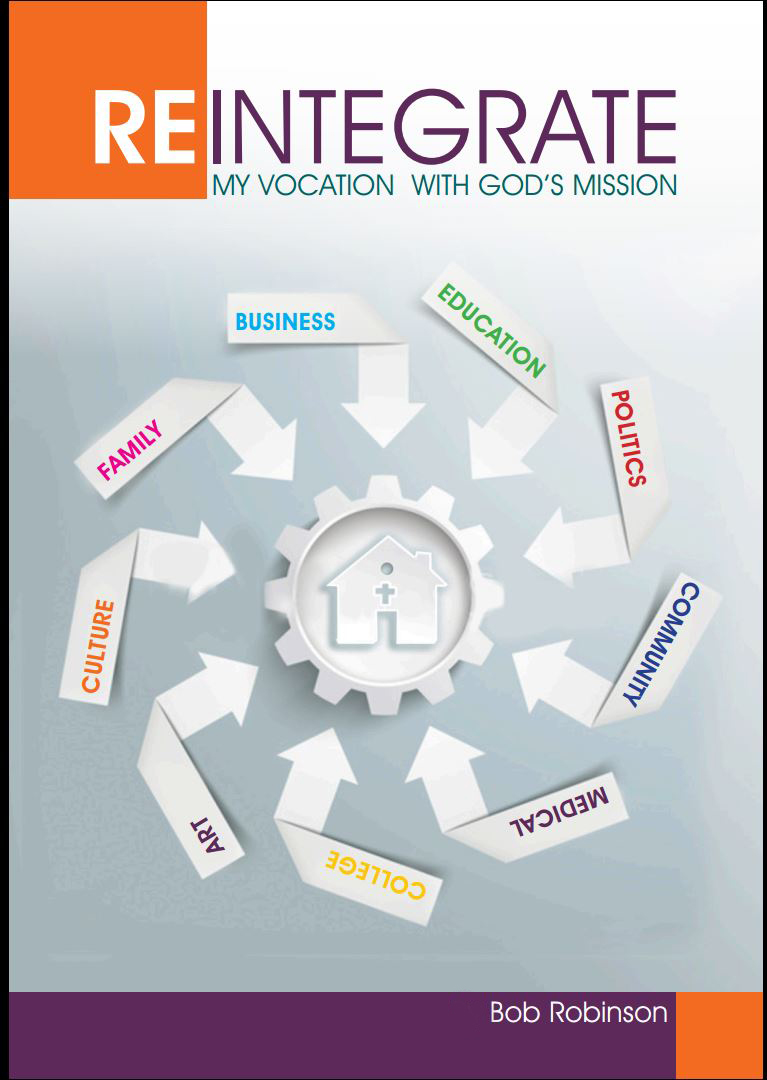 Reintegrate Your Vocation with God’s Mission Bob Robinson (Good Place Publishing) $12.00 This small group study guide is worth twice the price and is one of the brand new books I’m most excited about. I’ll tell you more about it later but for now know that Bob caught the Jubilee vision himself (after studying under some of the greatest theological writers of our time) by joining up with the CCO and learning more about the Biblical creation-fall-redemption-restoration narrative and its implications for vocation and work, callings and careers. This has some short chapters, tons of great pull-quotes and sidebars, and some good conversation starters or thought exercises for your own reflection and integration of this content. I am sure it will enhance your own spiritual formation as you learn how to deepend with your own sense of place and calling, work and purpose and, as he puts it, “re-integrate.” Blurbs on the back are from the best leaders in the faith/work conversation these days such as Tom Nelson (Work Matters: Connecting Sunday Worship to Monday Work), Steve Garber (Visions of Vocation: Common Grace for the Common God), Amy Sherman (Kingdom Calling: Vocational Stewardship for the Common Good), Hugh Whelchel (How Then Should We Work?) and, yes, a small town business guy named Byron Borger (editor of Serious Dreams: Bold Ideas for the Rest of Your Life.) Other rave reviews are by Lisa Slayton (of the Pittsburgh Leadership Foundation), Michael Wittmer (Heaven is a Place on Earth: Why Everything You Do Matters to God) and our good friend, Gideon Strauss, now teaching at the Institute for Christian Studies. This is a great resource and you should pick some up now while you can, on sale.
Reintegrate Your Vocation with God’s Mission Bob Robinson (Good Place Publishing) $12.00 This small group study guide is worth twice the price and is one of the brand new books I’m most excited about. I’ll tell you more about it later but for now know that Bob caught the Jubilee vision himself (after studying under some of the greatest theological writers of our time) by joining up with the CCO and learning more about the Biblical creation-fall-redemption-restoration narrative and its implications for vocation and work, callings and careers. This has some short chapters, tons of great pull-quotes and sidebars, and some good conversation starters or thought exercises for your own reflection and integration of this content. I am sure it will enhance your own spiritual formation as you learn how to deepend with your own sense of place and calling, work and purpose and, as he puts it, “re-integrate.” Blurbs on the back are from the best leaders in the faith/work conversation these days such as Tom Nelson (Work Matters: Connecting Sunday Worship to Monday Work), Steve Garber (Visions of Vocation: Common Grace for the Common God), Amy Sherman (Kingdom Calling: Vocational Stewardship for the Common Good), Hugh Whelchel (How Then Should We Work?) and, yes, a small town business guy named Byron Borger (editor of Serious Dreams: Bold Ideas for the Rest of Your Life.) Other rave reviews are by Lisa Slayton (of the Pittsburgh Leadership Foundation), Michael Wittmer (Heaven is a Place on Earth: Why Everything You Do Matters to God) and our good friend, Gideon Strauss, now teaching at the Institute for Christian Studies. This is a great resource and you should pick some up now while you can, on sale.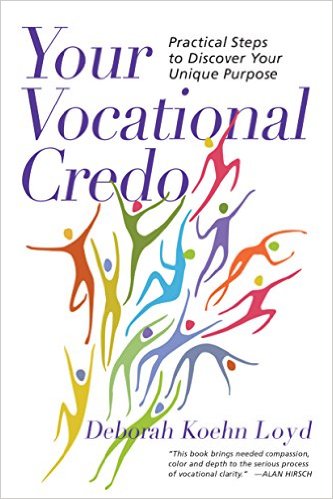 Your Vocational Credo: Practical Steps to Discover Your Unique Purpose Deborah Koehn Loyd (IVP) $16.00 This is one of my very favorite books to promote among younger adults seeking a wise resource to help them determine their own God-give purpose and vocation. This is fun, upbeat, practical, offering insights on everything from overcoming past pains to finding health and wholeness to understanding your own vocational skills and capacities — all of this so you can learn how to develop a unique plan for your own life’s work. One really does need a “vocational credo” and this helps guide you into it, with missional gusto. Nicely done.
Your Vocational Credo: Practical Steps to Discover Your Unique Purpose Deborah Koehn Loyd (IVP) $16.00 This is one of my very favorite books to promote among younger adults seeking a wise resource to help them determine their own God-give purpose and vocation. This is fun, upbeat, practical, offering insights on everything from overcoming past pains to finding health and wholeness to understanding your own vocational skills and capacities — all of this so you can learn how to develop a unique plan for your own life’s work. One really does need a “vocational credo” and this helps guide you into it, with missional gusto. Nicely done.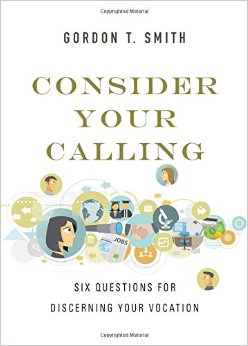 Consider Your Calling: Six Questions for Discerning Your Vocation Gordon T. Smith (IVP) $16.00 If the above listed one by Deborah Loyd is upbeat and fun, broad-thinking and a very readable guide, this one is similar but shorter, a bit more intense, and a bit more spiritually-minded. By which I mean that the author is a deep and wise writer of books about spiritual formation and an experienced spiritual director. Although most of his books are about a sacramental sort of prayerfulness and inner transformation (see his hefty and substantive Called to Be Saints: An Invitation to Christian Maturity) he has also written a wonderful book entitled Courage and Calling, that explores this stuff deeply.
Consider Your Calling: Six Questions for Discerning Your Vocation Gordon T. Smith (IVP) $16.00 If the above listed one by Deborah Loyd is upbeat and fun, broad-thinking and a very readable guide, this one is similar but shorter, a bit more intense, and a bit more spiritually-minded. By which I mean that the author is a deep and wise writer of books about spiritual formation and an experienced spiritual director. Although most of his books are about a sacramental sort of prayerfulness and inner transformation (see his hefty and substantive Called to Be Saints: An Invitation to Christian Maturity) he has also written a wonderful book entitled Courage and Calling, that explores this stuff deeply. 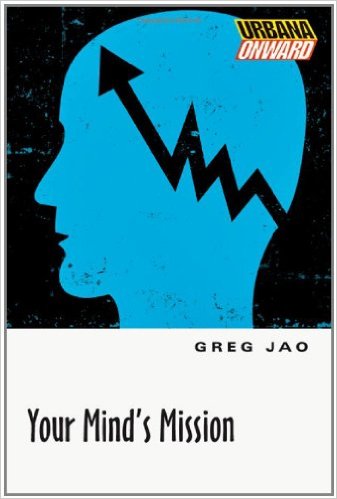 Your Mind’s Mission Greg Jao (IVP) $7.00 This little 30-page book is so potent I wish I could put it into the hands of every Christian person, and certainly of every Christian student. Jao nicely explains what a worldview is, how our lens to see and interpret life and learning is always shaped by presuppositions–including things like race and class and gender – and that we simply must be more self-aware about how we think. Further, he reminds us that the Bible calls us to a transforming vision, to see in ways that propel us to make connections between faith and life, integrating the life of the mind with mission and ministry. As it says on the back, “Discover how you can use your mind to extend the glory of God throughout the world” – and, for starters, at least, in your own life and work. If you believe that Jesus is Lord, you will be dazzled by the implications of this thoughtfully written booklet. Buy a few and give ’em out!
Your Mind’s Mission Greg Jao (IVP) $7.00 This little 30-page book is so potent I wish I could put it into the hands of every Christian person, and certainly of every Christian student. Jao nicely explains what a worldview is, how our lens to see and interpret life and learning is always shaped by presuppositions–including things like race and class and gender – and that we simply must be more self-aware about how we think. Further, he reminds us that the Bible calls us to a transforming vision, to see in ways that propel us to make connections between faith and life, integrating the life of the mind with mission and ministry. As it says on the back, “Discover how you can use your mind to extend the glory of God throughout the world” – and, for starters, at least, in your own life and work. If you believe that Jesus is Lord, you will be dazzled by the implications of this thoughtfully written booklet. Buy a few and give ’em out!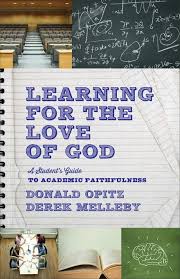 Learning for the Love of God: A Student’s Guide to Academic Faithfulness Donald Opitz & Derek Melleby (Brazos Press) $14.99 Okay, okay, I know that those who have read our BookNotes newsletter for a while know that I keep bringing this up from time to time. The book is dedicated to me, and I am so very deeply honored by that, that I truly want to let folks regularly know why it is so important.
Learning for the Love of God: A Student’s Guide to Academic Faithfulness Donald Opitz & Derek Melleby (Brazos Press) $14.99 Okay, okay, I know that those who have read our BookNotes newsletter for a while know that I keep bringing this up from time to time. The book is dedicated to me, and I am so very deeply honored by that, that I truly want to let folks regularly know why it is so important.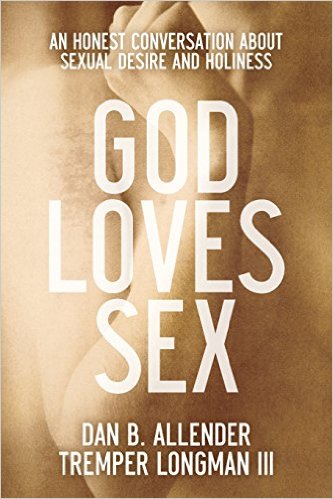 God Loves Sex: An Honest Conversation about Sexual Desire and Holiness Dan Allender & Tremper Longman (Baker) $16.99 Allender’s books on sexual abuse (Wounded Heart and Healing the Wounded Heart) sadly sell well at Jubilee. The many others Allender & Longman do together are also hits; it seems their Breaking the Idols of Your Heart: How to Navigate the Temptations of Life is always popular. This year, though, this open reflection on the good and the bad (and the ugly) of our sexuality which is treated so well in this thoughtful book was their most popular.
God Loves Sex: An Honest Conversation about Sexual Desire and Holiness Dan Allender & Tremper Longman (Baker) $16.99 Allender’s books on sexual abuse (Wounded Heart and Healing the Wounded Heart) sadly sell well at Jubilee. The many others Allender & Longman do together are also hits; it seems their Breaking the Idols of Your Heart: How to Navigate the Temptations of Life is always popular. This year, though, this open reflection on the good and the bad (and the ugly) of our sexuality which is treated so well in this thoughtful book was their most popular.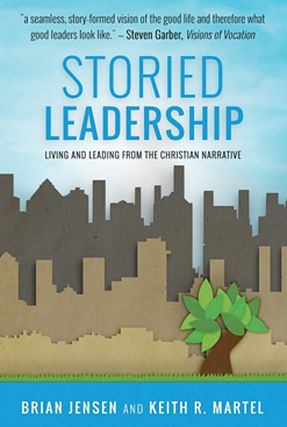
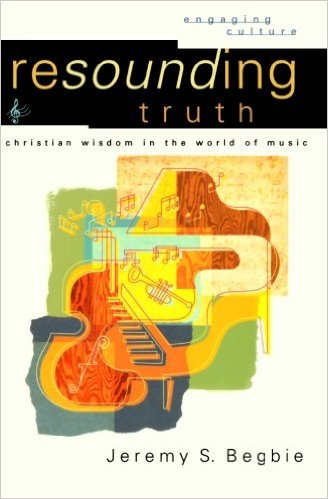 Resounding Truth: Christian Wisdom in the World of Music Jeremy S. Begbie (Baker Academic) $30.00 This year Jubilee seemed to have a lot of conversations about hip hop – with two electrifying rappers (Propaganda and Sho Baraka) performing and the Grammy nominated Lacrae (yes, the evangelical, Reformed, gospel-centered rapper banned from Lifeway) speaking, so we sold some books like the little Does God Listen to Rap Music and the substantial Gospel. But for those really serious about music or those who want a deeper study, this is simply magisterial, perhaps the best major work on Christian theory of music yet available. I’m fond of the Christian philosophy of aesthetics Calvin Seerveld, not to mention Nicholas Wolterstorff, and Mr. Begbie (formerly a classic composer in the UK) is in their league, with endorsements on the back from Rowan Williams, N.T. Wright, Nick Wolterstorff, John Witvliet, Roger Lundin. Breathtaking in scope and range, written with a mature integration of faith and scholarship.
Resounding Truth: Christian Wisdom in the World of Music Jeremy S. Begbie (Baker Academic) $30.00 This year Jubilee seemed to have a lot of conversations about hip hop – with two electrifying rappers (Propaganda and Sho Baraka) performing and the Grammy nominated Lacrae (yes, the evangelical, Reformed, gospel-centered rapper banned from Lifeway) speaking, so we sold some books like the little Does God Listen to Rap Music and the substantial Gospel. But for those really serious about music or those who want a deeper study, this is simply magisterial, perhaps the best major work on Christian theory of music yet available. I’m fond of the Christian philosophy of aesthetics Calvin Seerveld, not to mention Nicholas Wolterstorff, and Mr. Begbie (formerly a classic composer in the UK) is in their league, with endorsements on the back from Rowan Williams, N.T. Wright, Nick Wolterstorff, John Witvliet, Roger Lundin. Breathtaking in scope and range, written with a mature integration of faith and scholarship.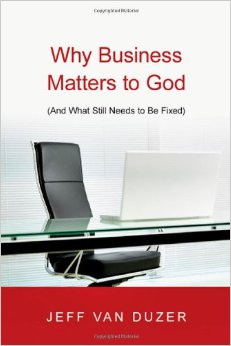 Why Business Matters to God (And What Still Needs to Be Fixed) Jeff Van Duzer (IVP Academic) $20.00 This really is my favorite book on a Christian view of business. It is thoughtful, inspiring, offering a helpful framework and the “creative dimensions of God’s purposes and meaning for business.” It is thought provoking and I think so good it should be read not only by those in business but for anyone who cares about our corporate culture, economics, or the common good. Very nicely done. Van Duzer, by the way, is the dean of the School of Business and Economics and Professor of business law and ethics at Seattle Pacific. Before that, interestingly, he practiced law in Seattle with an emphasis on finance and natural resources.
Why Business Matters to God (And What Still Needs to Be Fixed) Jeff Van Duzer (IVP Academic) $20.00 This really is my favorite book on a Christian view of business. It is thoughtful, inspiring, offering a helpful framework and the “creative dimensions of God’s purposes and meaning for business.” It is thought provoking and I think so good it should be read not only by those in business but for anyone who cares about our corporate culture, economics, or the common good. Very nicely done. Van Duzer, by the way, is the dean of the School of Business and Economics and Professor of business law and ethics at Seattle Pacific. Before that, interestingly, he practiced law in Seattle with an emphasis on finance and natural resources.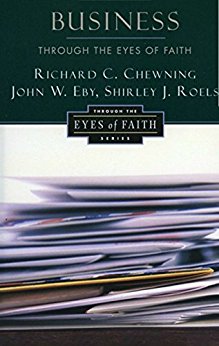 Business Through the Eyes of Faith Richard Chewning, John Eby, Shirley Roels (HarperOne) $15.99 We are very fond of this whole “…Through the Eyes of Faith” series, which includes college-level Christian texts on history, music, literature, psychology, biology, mathematics. I am especially fond of this one on business, and recommended it to every business major we could find. It is fascinating to me how few business people who are active in church haven’t read anything like this before, so we are glad for the opportunity to get CCO students at Jubilee who are business or accounting or management majors learning faith-based stuff early one. There are small sections on advertising, profits, marketing, management and more. This is so good, written by three scholars who themselves are from slightly different theological traditions (an Anabaptist, a Dutch Reformed neo-Calvinist, and a conservative evangelical.) Nice.
Business Through the Eyes of Faith Richard Chewning, John Eby, Shirley Roels (HarperOne) $15.99 We are very fond of this whole “…Through the Eyes of Faith” series, which includes college-level Christian texts on history, music, literature, psychology, biology, mathematics. I am especially fond of this one on business, and recommended it to every business major we could find. It is fascinating to me how few business people who are active in church haven’t read anything like this before, so we are glad for the opportunity to get CCO students at Jubilee who are business or accounting or management majors learning faith-based stuff early one. There are small sections on advertising, profits, marketing, management and more. This is so good, written by three scholars who themselves are from slightly different theological traditions (an Anabaptist, a Dutch Reformed neo-Calvinist, and a conservative evangelical.) Nice.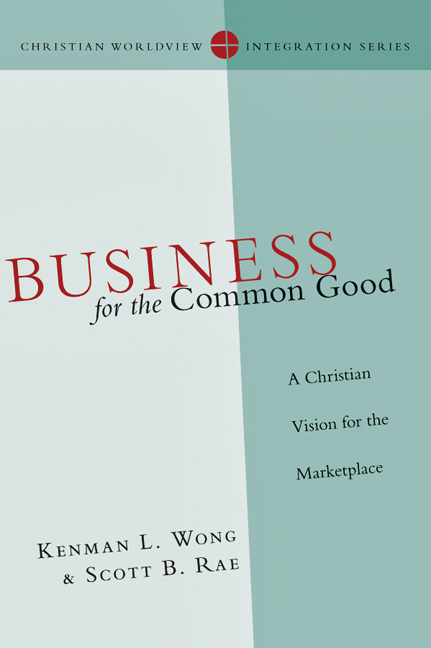 Business for the Common Good: A Christian Vision for the Marketplace Kenman Wong & Scott Rae (IVP Academic) $26.00 This one is another personal favorite and one I tried to sell to young business majors. It is, admittedly, a bit heavier than the other two mentioned above, has a less interesting cover (it is part of a heady series called “Christian Worldview Integration” which itself seems a bit dry and the covers don’t communicate energy and passion) and is a few dollars more expensive. So it’s a “next level” title, harder to sell, but certainly a must-read for professionals in the field. How many people have bad views of the business community, assuming it is all cut-throat and driven only by greed? (And how often, perhaps, is that the case?) This book is important for all of us. Brian Porter of Hope College, says, in fact, “If you read only one book on faith integration and business, Business for the Common Good should be it.” It is masterful and thorough.
Business for the Common Good: A Christian Vision for the Marketplace Kenman Wong & Scott Rae (IVP Academic) $26.00 This one is another personal favorite and one I tried to sell to young business majors. It is, admittedly, a bit heavier than the other two mentioned above, has a less interesting cover (it is part of a heady series called “Christian Worldview Integration” which itself seems a bit dry and the covers don’t communicate energy and passion) and is a few dollars more expensive. So it’s a “next level” title, harder to sell, but certainly a must-read for professionals in the field. How many people have bad views of the business community, assuming it is all cut-throat and driven only by greed? (And how often, perhaps, is that the case?) This book is important for all of us. Brian Porter of Hope College, says, in fact, “If you read only one book on faith integration and business, Business for the Common Good should be it.” It is masterful and thorough.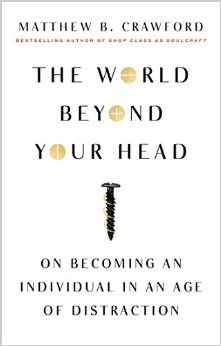 The World Beyond Your Head: On Becoming an Individual in an Age of Distraction Matthew B. Crawford (Farrar, Straus, and Giroux) $15.00 I do hope you recall our rave review of this when it came out in hardback a year ago, an eagerly-anticipated sequel to his must-read Shop Class as Soul Craft. Some years CCO has a workshop or two at the conference for those in trade schools on blue-collar work and this book has been useful in thinking about formative practices, resisting abstraction, and learning from the attention needed in “shop class”– all in pretty mature, philosophical ways. Maybe Jubilee didn’t have such a workshop this year and our extra orders of this standard work are sitting here, waiting for you to order them. Damon Linker of The Week says it is “The most cogent and incisive book of social criticism I’ve read in a long time. Reading it is like putting on a pair of perfectly suited prescription glasses after a long period of squinting one’s way through life.” Another pundit said The World Beyond Your Head could “easily lure any cultural pessimist into considerations that pass beyond the symptoms, deep into the causes of our present ills.” The core of the book, though, is simple: Crawford interviews a handful of workers who are really good at their craft and explores how they’ve paid attention to the details of their work and job.
The World Beyond Your Head: On Becoming an Individual in an Age of Distraction Matthew B. Crawford (Farrar, Straus, and Giroux) $15.00 I do hope you recall our rave review of this when it came out in hardback a year ago, an eagerly-anticipated sequel to his must-read Shop Class as Soul Craft. Some years CCO has a workshop or two at the conference for those in trade schools on blue-collar work and this book has been useful in thinking about formative practices, resisting abstraction, and learning from the attention needed in “shop class”– all in pretty mature, philosophical ways. Maybe Jubilee didn’t have such a workshop this year and our extra orders of this standard work are sitting here, waiting for you to order them. Damon Linker of The Week says it is “The most cogent and incisive book of social criticism I’ve read in a long time. Reading it is like putting on a pair of perfectly suited prescription glasses after a long period of squinting one’s way through life.” Another pundit said The World Beyond Your Head could “easily lure any cultural pessimist into considerations that pass beyond the symptoms, deep into the causes of our present ills.” The core of the book, though, is simple: Crawford interviews a handful of workers who are really good at their craft and explores how they’ve paid attention to the details of their work and job.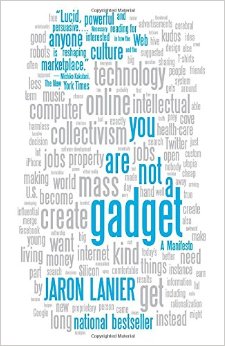 You Are Not A Gadget: A Manifesto Jaron Lanier (Vintage) $15.00 Last year students loved this book; Lanier was a pioneer of digital media, considered the father of virtual reality technology, now an ” apostate of the internet age” and yet still passionate about programming. Alas, foolishly, in our stress of setting out dozens of such books in the technology section, another book (with a similar cover – The Glass Cage by Nicholas Carr) got stacked on top of these and, alas, we didn’t sell a one. I kept wondering where it was, thinking it was lost or that somebody bought ’em all early on, and while tearing down late Sunday afternoon found this big stack. Drats. Our loss is your gain – this is, as the San Francisco Chronicle puts it, “Thrilling and thought-provoking, a necessary corrective in the echo chamber of technological debates.” The Washington Post says it is “mind bending, exuberant, brilliant.” Lanier is an important voice and I so wanted to get these into student’s hands. Check it out.
You Are Not A Gadget: A Manifesto Jaron Lanier (Vintage) $15.00 Last year students loved this book; Lanier was a pioneer of digital media, considered the father of virtual reality technology, now an ” apostate of the internet age” and yet still passionate about programming. Alas, foolishly, in our stress of setting out dozens of such books in the technology section, another book (with a similar cover – The Glass Cage by Nicholas Carr) got stacked on top of these and, alas, we didn’t sell a one. I kept wondering where it was, thinking it was lost or that somebody bought ’em all early on, and while tearing down late Sunday afternoon found this big stack. Drats. Our loss is your gain – this is, as the San Francisco Chronicle puts it, “Thrilling and thought-provoking, a necessary corrective in the echo chamber of technological debates.” The Washington Post says it is “mind bending, exuberant, brilliant.” Lanier is an important voice and I so wanted to get these into student’s hands. Check it out.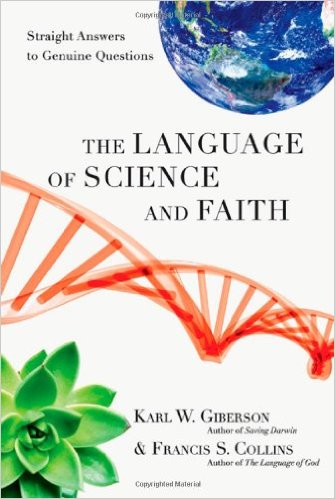 The Language of Science and Faith: Straight Answers to Genuine Questions Karl Giberson & Francis Collins (InterVarsity Press) $22.00 This book (apparently published in cooperation with the thoughtful BioLogos organization — who was at Jubilee with a great display booth, by the way) is one we so often suggest as a first step in relating faith and science and reminding readers that there need not by a conflict between faith and science. Here’s what the publisher says, briefly, about this fine work:
The Language of Science and Faith: Straight Answers to Genuine Questions Karl Giberson & Francis Collins (InterVarsity Press) $22.00 This book (apparently published in cooperation with the thoughtful BioLogos organization — who was at Jubilee with a great display booth, by the way) is one we so often suggest as a first step in relating faith and science and reminding readers that there need not by a conflict between faith and science. Here’s what the publisher says, briefly, about this fine work: 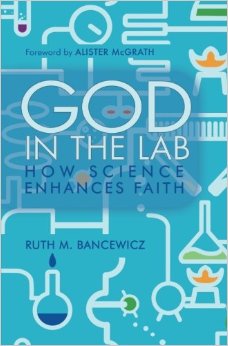 God in the Lab: How Science Enhances Faith Ruth Bancewicz (Monarch) $16.99 We think this is one of the best book for young thinkers, those just considering a career in the sciences. I like the title, and that is shows how real scientists of Christian conviction do their work. I appreciate the way it’s described by the British publisher. (Yep, we get this from a publisher in the US who distributes UK books — we think it is that good.)
God in the Lab: How Science Enhances Faith Ruth Bancewicz (Monarch) $16.99 We think this is one of the best book for young thinkers, those just considering a career in the sciences. I like the title, and that is shows how real scientists of Christian conviction do their work. I appreciate the way it’s described by the British publisher. (Yep, we get this from a publisher in the US who distributes UK books — we think it is that good.)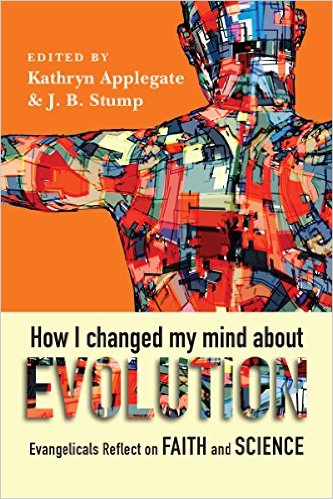
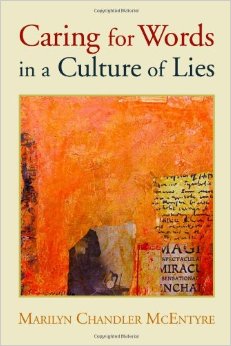 Caring for Words in a Culture of Lies Marilyn McEntyre (Eerdmans) $19.00 One of my all-time favorite books, I announced this from the main-stage as essential in this current political context. Not long ago I heard a Christian worship leader exhort a congregation saying ad lib that outside of Christ “it is all fake news” — which is patently stupid. No, it isn’t all “fake news” (much about the world as it is, the Bible tells us, declares the glory of God) and we must be shaped in the ways of Christ and the virtues of decency and critical thinking and kindness and honesty so we can do the hard work of discerning real from fake, wise from foolish, good from bad. If only that worship leader had listened to Jubilee speakers!
Caring for Words in a Culture of Lies Marilyn McEntyre (Eerdmans) $19.00 One of my all-time favorite books, I announced this from the main-stage as essential in this current political context. Not long ago I heard a Christian worship leader exhort a congregation saying ad lib that outside of Christ “it is all fake news” — which is patently stupid. No, it isn’t all “fake news” (much about the world as it is, the Bible tells us, declares the glory of God) and we must be shaped in the ways of Christ and the virtues of decency and critical thinking and kindness and honesty so we can do the hard work of discerning real from fake, wise from foolish, good from bad. If only that worship leader had listened to Jubilee speakers!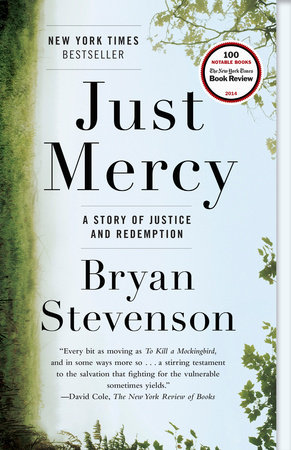 Just Mercy: A Story of Justice and Redemption Bryan Stevenson (Spiegel & Grau) $16.00 I have often said, and I still say, that Stevenson should get the Nobel Peace Prize, and very well might, for his extraordinary service for those poor and often minority folks wrongly incarcerated, for his advocacy for youth in prison, and, more recently, for his brave and diligent project documenting the vigilante terrorism known as lynching. We tell folks to read this before, or maybe after, The New Jim Crow, and to be prepared for one of the most riveting reads of your life. We have been one of the early supporters of this book, and certainly one of the handful within the world of Christian bookstores who have promoted it. We have a few extras after Jubilee and we’re happy to offer them in this sale now. The first time I heard of Stevenson, by the way, was from Tony Campolo, many years ago (Bryan was an undergrad at Eastern before going to at Harvard Law.) The first time I heard him speak was – you guessed it – in Pittsburgh at Jubilee before he wrote this acclaimed book and before he was famous. Students at Jubilee really are introduced to some of the most significant speakers and leaders in North America and we’re happy to sell these kinds of serious books to these eager young adults.
Just Mercy: A Story of Justice and Redemption Bryan Stevenson (Spiegel & Grau) $16.00 I have often said, and I still say, that Stevenson should get the Nobel Peace Prize, and very well might, for his extraordinary service for those poor and often minority folks wrongly incarcerated, for his advocacy for youth in prison, and, more recently, for his brave and diligent project documenting the vigilante terrorism known as lynching. We tell folks to read this before, or maybe after, The New Jim Crow, and to be prepared for one of the most riveting reads of your life. We have been one of the early supporters of this book, and certainly one of the handful within the world of Christian bookstores who have promoted it. We have a few extras after Jubilee and we’re happy to offer them in this sale now. The first time I heard of Stevenson, by the way, was from Tony Campolo, many years ago (Bryan was an undergrad at Eastern before going to at Harvard Law.) The first time I heard him speak was – you guessed it – in Pittsburgh at Jubilee before he wrote this acclaimed book and before he was famous. Students at Jubilee really are introduced to some of the most significant speakers and leaders in North America and we’re happy to sell these kinds of serious books to these eager young adults. 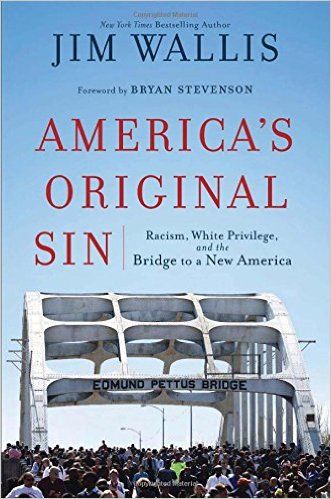 America’s Original Sin: Racism, White Privilege and the New Bridge to a New America Jim Wallis (Brazos Press) $17.99 CCO is passionate about multi-ethnic ministry and knows that the gospel insists upon both justice and reconciliation. They are theologically pretty conservative/mainstream evangelical but on this topic they see the Biblical and theological trajectory towards a multi-ethnic new creation and want to practice now that glorious reality of racial reconciliation. It not surprising that they had rapper activists like Propaganda speaking this year. We stocked a lot of books on racism and civil rights and ethnic diversity at Jubilee and there was almost too much for students to take in. (Ohhh, if only the workshop leaders who facilitate these conversations would have been able to browse more; some have said we have one of the best-curated sections of this kind of stuff in any bookstore they know of and some of the leaders themselves might have benefited from the books in our selection.) In any event, this one is a recent classic, now in paperback, one that is strong and sturdy and sure to generate discussion. Agree or not with all of Sojo or all of Wallis’s past books, I think this is simply a must-read book for anyone working on this topic. As one evangelical leader said it is useful to “rivet our attention and commitment to a different future. This is a sobering and motivating act of hope.” Glad it’s now out in paperback. Pick it up today.
America’s Original Sin: Racism, White Privilege and the New Bridge to a New America Jim Wallis (Brazos Press) $17.99 CCO is passionate about multi-ethnic ministry and knows that the gospel insists upon both justice and reconciliation. They are theologically pretty conservative/mainstream evangelical but on this topic they see the Biblical and theological trajectory towards a multi-ethnic new creation and want to practice now that glorious reality of racial reconciliation. It not surprising that they had rapper activists like Propaganda speaking this year. We stocked a lot of books on racism and civil rights and ethnic diversity at Jubilee and there was almost too much for students to take in. (Ohhh, if only the workshop leaders who facilitate these conversations would have been able to browse more; some have said we have one of the best-curated sections of this kind of stuff in any bookstore they know of and some of the leaders themselves might have benefited from the books in our selection.) In any event, this one is a recent classic, now in paperback, one that is strong and sturdy and sure to generate discussion. Agree or not with all of Sojo or all of Wallis’s past books, I think this is simply a must-read book for anyone working on this topic. As one evangelical leader said it is useful to “rivet our attention and commitment to a different future. This is a sobering and motivating act of hope.” Glad it’s now out in paperback. Pick it up today.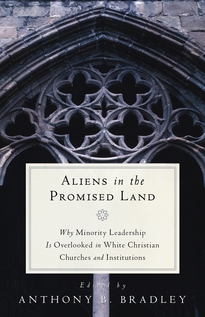 Aliens in the Promised Land: Why Minority Leadership Is Overlooked in White Christian Churches and Institutions edited by Anthony B. Bradley (P&R) $15.99 We carry most of the books by this outspoken, articulate Christian leader (and so appreciated his Sunday morning Jubilee main-stage talk about being ordinary, transforming culture full of the hope of God’s final restoration, less by dramatic gestures of brave innovation by being, well, salt.) We sold his collection of essays called Black and Tired: Essays on Race, Politics, Culture, and International Development evangelical, Reformed critique of James Cone and other black liberation theologians in Liberation Black Theology and the powerful collection he edited called Black Scholars in White Space and had on display his brand new Something Seems Strange: Critical Essays on Christianity, Public Policy, and Contemporary Culture. We even had a book he’s been telling everyone (on twitter) to read, Doctrine and Race: African American Evangelicals and Fundamentalism Between the Wars (by Mary Beth Swetnam Mathews on University of Alabama Press.) I think this Aliens in the Promised Land collection is as good as any, though, put together by Dr. Bradley, offering a fine array of evangelical voices (of differing minority groups) pondering this vital question.
Aliens in the Promised Land: Why Minority Leadership Is Overlooked in White Christian Churches and Institutions edited by Anthony B. Bradley (P&R) $15.99 We carry most of the books by this outspoken, articulate Christian leader (and so appreciated his Sunday morning Jubilee main-stage talk about being ordinary, transforming culture full of the hope of God’s final restoration, less by dramatic gestures of brave innovation by being, well, salt.) We sold his collection of essays called Black and Tired: Essays on Race, Politics, Culture, and International Development evangelical, Reformed critique of James Cone and other black liberation theologians in Liberation Black Theology and the powerful collection he edited called Black Scholars in White Space and had on display his brand new Something Seems Strange: Critical Essays on Christianity, Public Policy, and Contemporary Culture. We even had a book he’s been telling everyone (on twitter) to read, Doctrine and Race: African American Evangelicals and Fundamentalism Between the Wars (by Mary Beth Swetnam Mathews on University of Alabama Press.) I think this Aliens in the Promised Land collection is as good as any, though, put together by Dr. Bradley, offering a fine array of evangelical voices (of differing minority groups) pondering this vital question.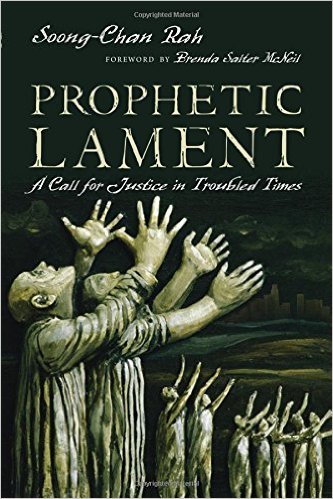 Prophetic Lament: A Call for Justice in Troubled Times Soong-Chan Rah (IVP) $17.00 Soong-Chan has spoken at Jubilee before and many of us respect him immensely. This is a fascinating resource that you may recall me touting before – it is, truly, a commentary on the book of Lamentations in the Bible, but with a very contemporary application. Rowdy and energetic as Jubilee is, Saturday morning we heard hard truths about injustice and racism and other consequences of “the fall” which form our world in dysfunctional, idolatrous, and very broken ways. The worship team led us in slow, evocative songs and prayers were prayed that lamented our personal and corporate pains. The American church – mainline, evangelical and others, I suppose – avoids lament. This is a nearly prophetic exposition of the book of Lamentations and will help us learn the role of lament, confession, and rejection of “success-centered triumphalism and hubris.” Powerful, necessary stuff.
Prophetic Lament: A Call for Justice in Troubled Times Soong-Chan Rah (IVP) $17.00 Soong-Chan has spoken at Jubilee before and many of us respect him immensely. This is a fascinating resource that you may recall me touting before – it is, truly, a commentary on the book of Lamentations in the Bible, but with a very contemporary application. Rowdy and energetic as Jubilee is, Saturday morning we heard hard truths about injustice and racism and other consequences of “the fall” which form our world in dysfunctional, idolatrous, and very broken ways. The worship team led us in slow, evocative songs and prayers were prayed that lamented our personal and corporate pains. The American church – mainline, evangelical and others, I suppose – avoids lament. This is a nearly prophetic exposition of the book of Lamentations and will help us learn the role of lament, confession, and rejection of “success-centered triumphalism and hubris.” Powerful, necessary stuff.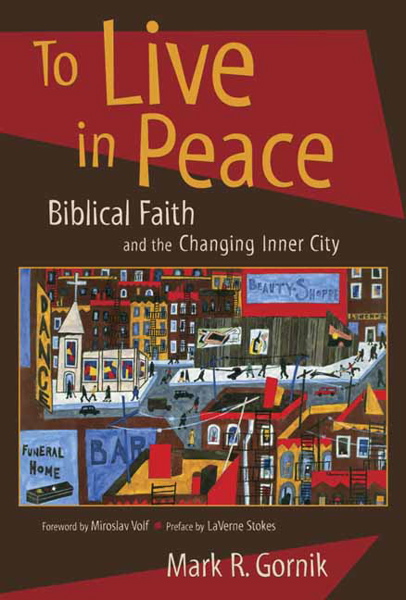 To Live in Peace: Biblical Faith and the Changing Inner City Mark R. Gornik (Eerdmans) $26.00 There is, happily, an increased interest in urban life, in cities and in a theology of geography, so to speak, especially as we desire to serve our neighbors by being involved in the systems and structures that make up our neighborhoods, commercial centers, and under-resources ghettos. There are bunches of books about urban ministry, about Christian community development, and if anybody wanted anything along those lines we had stuff there. (In a special bibliography we put together for the conference, displayed on the Jubilee conference app, by the way, I described the very serious Beyond Homelessness
To Live in Peace: Biblical Faith and the Changing Inner City Mark R. Gornik (Eerdmans) $26.00 There is, happily, an increased interest in urban life, in cities and in a theology of geography, so to speak, especially as we desire to serve our neighbors by being involved in the systems and structures that make up our neighborhoods, commercial centers, and under-resources ghettos. There are bunches of books about urban ministry, about Christian community development, and if anybody wanted anything along those lines we had stuff there. (In a special bibliography we put together for the conference, displayed on the Jubilee conference app, by the way, I described the very serious Beyond Homelessness 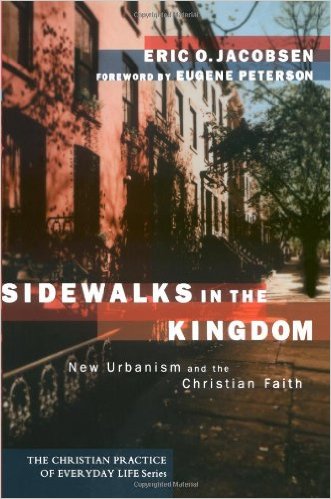 Sidewalks of the Kingdom: New Urbanism and the Christian Faith Eric O. Jacobsen (Brazos Press) $22.00 I’ve reviewed this extensively over the years, as I have Jacobsen’s brilliant sequel to this, The Space Between: A Christian Engagement with the Build Environment, which is more broadly on the built environment and one of our awarded Best Books of a few years ago.) I suppose there aren’t that many urban planning majors at Jubilee but many of us are concerned about the efficiency, aesthetics, justice, and charm of our sidewalks and commercial spaces and the wisdom of our zoning laws and policies that shape our towns and cities. This is a fine introduction for ordinary folks, written by a thoughtful, small town Presbyterian pastor, about how to take up the conversations propelled by the likes of the legendary Jane Jacobs, the feisty James Howard Kunstler (I hope you know his snarky, electrifying books like Home from Nowhere), or the anti-sprawl, new urbanists such as Andres Duany, Elizabeth Plater-Zyberk and Jeff Speck.
Sidewalks of the Kingdom: New Urbanism and the Christian Faith Eric O. Jacobsen (Brazos Press) $22.00 I’ve reviewed this extensively over the years, as I have Jacobsen’s brilliant sequel to this, The Space Between: A Christian Engagement with the Build Environment, which is more broadly on the built environment and one of our awarded Best Books of a few years ago.) I suppose there aren’t that many urban planning majors at Jubilee but many of us are concerned about the efficiency, aesthetics, justice, and charm of our sidewalks and commercial spaces and the wisdom of our zoning laws and policies that shape our towns and cities. This is a fine introduction for ordinary folks, written by a thoughtful, small town Presbyterian pastor, about how to take up the conversations propelled by the likes of the legendary Jane Jacobs, the feisty James Howard Kunstler (I hope you know his snarky, electrifying books like Home from Nowhere), or the anti-sprawl, new urbanists such as Andres Duany, Elizabeth Plater-Zyberk and Jeff Speck. 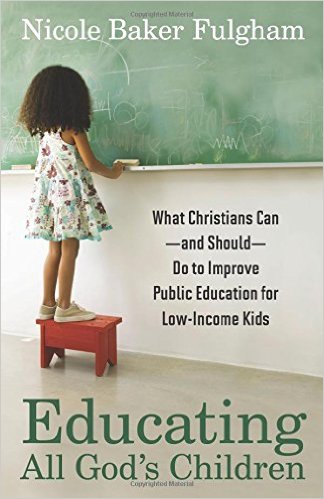 Educating All God’s Children: What Christians Can–And Should–Do to Improve Public Education for Low-Income Kids Nicole Baker Fulgham (Brazos Press) $20.00 One of Nicole Fulgham’s staff from her wonderful, important ministry called The Expectations Project spoke at Jubilee this year (as Nichole herself has many times.) This book is nearly a handbook for any citizen or church group who wants to become allies and advocates for all children, especially those that are in lo0w-income schools. With the recent cabinet appointment of the controversial Betsy DeVos – who I suspect isn’t as bad as some opponents suggest but who clearly is inexperienced in public school work – this book may be more important than ever. Whether you are a teacher who cares about educational policy (inspired in college by Jonathan Kozol, maybe, as I was) or a parent interested in making sure all schools in your area are treated fairly, or whether you are a citizen advocate for justice, this book is important and will be a fabulous and motivational read for you. Glad to have had The Expectation Project at Jubilee!
Educating All God’s Children: What Christians Can–And Should–Do to Improve Public Education for Low-Income Kids Nicole Baker Fulgham (Brazos Press) $20.00 One of Nicole Fulgham’s staff from her wonderful, important ministry called The Expectations Project spoke at Jubilee this year (as Nichole herself has many times.) This book is nearly a handbook for any citizen or church group who wants to become allies and advocates for all children, especially those that are in lo0w-income schools. With the recent cabinet appointment of the controversial Betsy DeVos – who I suspect isn’t as bad as some opponents suggest but who clearly is inexperienced in public school work – this book may be more important than ever. Whether you are a teacher who cares about educational policy (inspired in college by Jonathan Kozol, maybe, as I was) or a parent interested in making sure all schools in your area are treated fairly, or whether you are a citizen advocate for justice, this book is important and will be a fabulous and motivational read for you. Glad to have had The Expectation Project at Jubilee!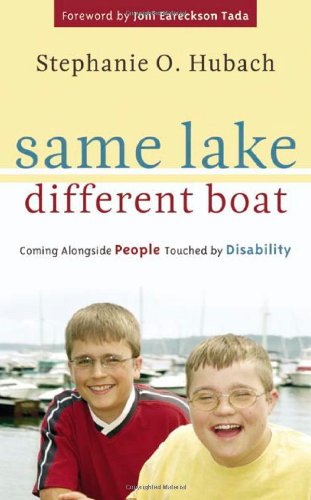 Same Lake Different Boat: Coming Alongside People Touched by Disability Stephanie O. Hubach (P & R) $14.99 Here in the store we have a good handful of books about disabilities, about how the church should be more aware of and inclusive of those with disabilities, and how we should all be more sensitive to the image of God in those with serious handicapping conditions. We like several books by Brett Webb-Mitchell, for instance, and of course the important books by Joni Earackson Tada.
Same Lake Different Boat: Coming Alongside People Touched by Disability Stephanie O. Hubach (P & R) $14.99 Here in the store we have a good handful of books about disabilities, about how the church should be more aware of and inclusive of those with disabilities, and how we should all be more sensitive to the image of God in those with serious handicapping conditions. We like several books by Brett Webb-Mitchell, for instance, and of course the important books by Joni Earackson Tada. 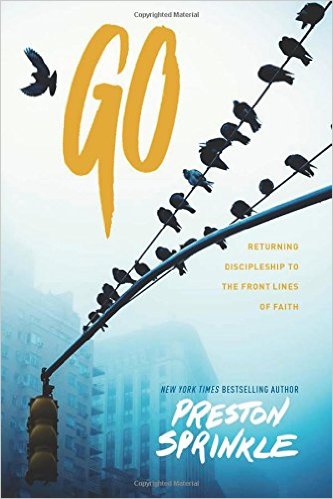 Go: Returning Discipleship to the Front Lines of Faith Preston Sprinkle (NavPress) $14.99 I pitched this in front of the crowd at Jubilee but in my short time up front perhaps didn’t explain it well enough. It really is a fabulous book that does two or three things well. Firstly, it reports on the fascinating survey commissioned by the Navigators that helps us understand what Christian people think about the word “discipleship.” Go offers sidebars and charts and info-graphics to explain this large-scale research on what is missing in the common understandings and attitudes about following Christ, making disciples, being salt and light and leaven in the world. Why is it that the church is often seen as weak, not very influential (even among its own members) and how many Christ-followers are drifting from a formerly robust, serious life of faith? How can we understand these deep concerns and how can we find solutions to chronic shallow faith and a privatized faith that doesn’t think much or engage the world well? Preston Sprinkle’s book can help.
Go: Returning Discipleship to the Front Lines of Faith Preston Sprinkle (NavPress) $14.99 I pitched this in front of the crowd at Jubilee but in my short time up front perhaps didn’t explain it well enough. It really is a fabulous book that does two or three things well. Firstly, it reports on the fascinating survey commissioned by the Navigators that helps us understand what Christian people think about the word “discipleship.” Go offers sidebars and charts and info-graphics to explain this large-scale research on what is missing in the common understandings and attitudes about following Christ, making disciples, being salt and light and leaven in the world. Why is it that the church is often seen as weak, not very influential (even among its own members) and how many Christ-followers are drifting from a formerly robust, serious life of faith? How can we understand these deep concerns and how can we find solutions to chronic shallow faith and a privatized faith that doesn’t think much or engage the world well? Preston Sprinkle’s book can help.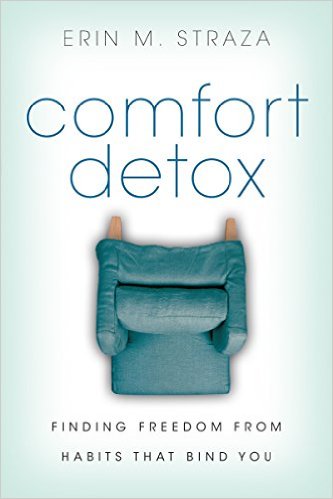 Comfort Detox: Finding Freedom From Habits That Bind You Erin M. Straza (IVP) $16.00 I am so glad that Erin Straza just released this wonderful book; she is a smart and good writer, the editor of “Christ and Pop Culture Magazine” and host of the Persuasion podcast. I’ve followed her for a bit as perhaps you have, and am sure she has a lot to offer in a crazy book like this.
Comfort Detox: Finding Freedom From Habits That Bind You Erin M. Straza (IVP) $16.00 I am so glad that Erin Straza just released this wonderful book; she is a smart and good writer, the editor of “Christ and Pop Culture Magazine” and host of the Persuasion podcast. I’ve followed her for a bit as perhaps you have, and am sure she has a lot to offer in a crazy book like this.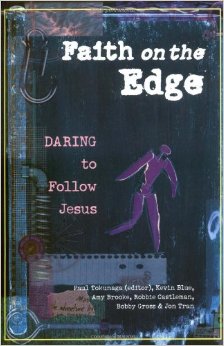 Faith on the Edge: Daring to Follow Jesus Paul Tokunaga et al (IVP) $16.00 I could hardly believe it but this great publisher, who lives and breathes to serve others with thoughtful resources for evangelical, Kingdom living, offered to keep this book in print in part because they know I promote it at Jubilee this year. It was listed and described in a special book list that was on the Jubilee phone app – so let’s be glad this gem of a book is still available. It is a book I love and hope you consider buying as it will meet needs for your own reading and learning, I am sure. Especially if you are mentoring others or need books that offer short pieces about various aspects of Christian living. Faith on the Edge is a gem.
Faith on the Edge: Daring to Follow Jesus Paul Tokunaga et al (IVP) $16.00 I could hardly believe it but this great publisher, who lives and breathes to serve others with thoughtful resources for evangelical, Kingdom living, offered to keep this book in print in part because they know I promote it at Jubilee this year. It was listed and described in a special book list that was on the Jubilee phone app – so let’s be glad this gem of a book is still available. It is a book I love and hope you consider buying as it will meet needs for your own reading and learning, I am sure. Especially if you are mentoring others or need books that offer short pieces about various aspects of Christian living. Faith on the Edge is a gem.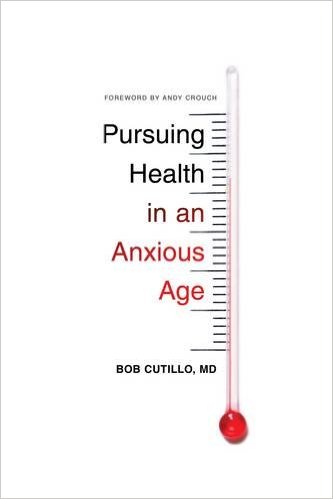 Pursuing Health in an Anxious Age Bob Cutillo (Crossway) $17.00 We have many books for those in health care fields – starting with Phil Yancey & Dr. Paul Brand’s Fearfully and Wonderfully Made, In His Image, and The Gift of Pain, through excellent books like Called to Care: A Christian Worldview for Nursing,
Pursuing Health in an Anxious Age Bob Cutillo (Crossway) $17.00 We have many books for those in health care fields – starting with Phil Yancey & Dr. Paul Brand’s Fearfully and Wonderfully Made, In His Image, and The Gift of Pain, through excellent books like Called to Care: A Christian Worldview for Nursing, 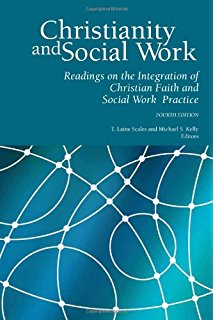 Christianity and Social Work: Readings on the Integration of Christian Faith and Social Work Practice (fourth edition) T. Laine Scales and Michael S. Kelly, editors (NACSW) $24.00 What is NACSW, you ask? It’s the North American Association of Christians in Social Work and this is the textbook type reader they produced for use in Christian colleges with social work majors or for any social worker wanting to think more faithfully about their calling into this line of work. Every major should have such a fine, expansive reader, connected to a faith-based professional association like this. We are one of the few stores in the country that carry this, and we are happy to offer it on sale, here, now.
Christianity and Social Work: Readings on the Integration of Christian Faith and Social Work Practice (fourth edition) T. Laine Scales and Michael S. Kelly, editors (NACSW) $24.00 What is NACSW, you ask? It’s the North American Association of Christians in Social Work and this is the textbook type reader they produced for use in Christian colleges with social work majors or for any social worker wanting to think more faithfully about their calling into this line of work. Every major should have such a fine, expansive reader, connected to a faith-based professional association like this. We are one of the few stores in the country that carry this, and we are happy to offer it on sale, here, now. 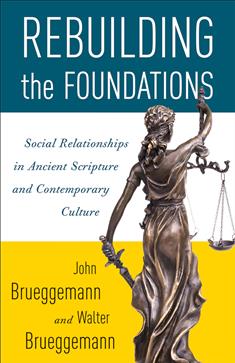 Rebuilding the Foundation: Social Relationships in Ancient Scripture and Contemporary Culture John Brueggemann & Walter Brueggemann (WJK) $20.00 In many of our off site book displays I suppose we’d display this with the famous Old Testament scholar’s other books of Biblical studies. However, note: the primary author of this is the son of Walt Brueggemann, John. And John is an esteemed sociologist in his own right. (In fact, professor John Brueggemann is the Department Chair of the Sociology Department at Skidmore and has published books such as Rich, Free, and Miserable: The Failure of Success in America and Inequality in the United States: A Reader.)
Rebuilding the Foundation: Social Relationships in Ancient Scripture and Contemporary Culture John Brueggemann & Walter Brueggemann (WJK) $20.00 In many of our off site book displays I suppose we’d display this with the famous Old Testament scholar’s other books of Biblical studies. However, note: the primary author of this is the son of Walt Brueggemann, John. And John is an esteemed sociologist in his own right. (In fact, professor John Brueggemann is the Department Chair of the Sociology Department at Skidmore and has published books such as Rich, Free, and Miserable: The Failure of Success in America and Inequality in the United States: A Reader.)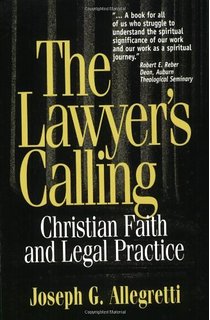 The Lawyers Calling: Christian Faith and Legal Practice Joseph G. Allegretti (Paulist Press) $12.95 This delightfully interesting book is our first choice for pre-law majors, law students, or attorneys just starting to integrate faith and their vocation in the field of law. The author is a Roman Catholic (who earned his J.D. from Harvard, cum laude) and an M.Div from Yale (summa cum laude, by the way) who, among other things, draws on Niebuhr. He is convinced that many lawyers are facing a crisis of meaning themselves, so need spiritual renewal and thoughtful theological insight about their calling. I like this because it is basic, relatively short, inexpensive.
The Lawyers Calling: Christian Faith and Legal Practice Joseph G. Allegretti (Paulist Press) $12.95 This delightfully interesting book is our first choice for pre-law majors, law students, or attorneys just starting to integrate faith and their vocation in the field of law. The author is a Roman Catholic (who earned his J.D. from Harvard, cum laude) and an M.Div from Yale (summa cum laude, by the way) who, among other things, draws on Niebuhr. He is convinced that many lawyers are facing a crisis of meaning themselves, so need spiritual renewal and thoughtful theological insight about their calling. I like this because it is basic, relatively short, inexpensive.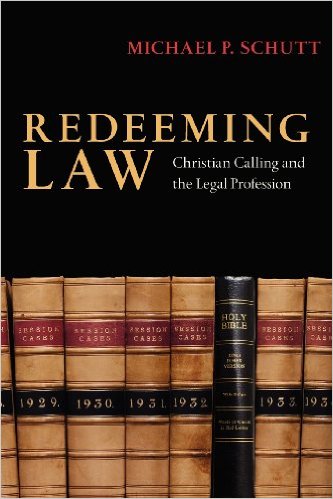 Redeeming Law: Christian Calling and the Legal Profession Michael Schutt (IVP) $27.00 This, I always say, everywhere we go, is the book for serious Christians thinking about law and legal theory from a Christian viewpoint. Mike is a very, very good friend and even if you don’t agree with every jot and tittle of this large work, you will enjoy the conversation, learn much, and be well on your way to developing an integrated Christian vision of your work and faith by reading Redeeming Law. He understands that God calls us into vocational arenas and wrote about that before the recent batch of books on this, and he then integrates a Biblical world-and-life view with a serious take on jurisprudence and the like. Kudos to Mike not only for writing this important book but for his upbeat work with law students through the Christian Legal Society.
Redeeming Law: Christian Calling and the Legal Profession Michael Schutt (IVP) $27.00 This, I always say, everywhere we go, is the book for serious Christians thinking about law and legal theory from a Christian viewpoint. Mike is a very, very good friend and even if you don’t agree with every jot and tittle of this large work, you will enjoy the conversation, learn much, and be well on your way to developing an integrated Christian vision of your work and faith by reading Redeeming Law. He understands that God calls us into vocational arenas and wrote about that before the recent batch of books on this, and he then integrates a Biblical world-and-life view with a serious take on jurisprudence and the like. Kudos to Mike not only for writing this important book but for his upbeat work with law students through the Christian Legal Society.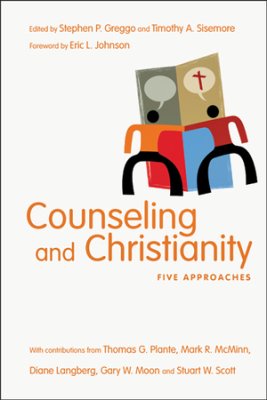 Counseling and Christianity: Five Approaches edited by Stephen Greggo (IVP) $25.00 I love these kinds of four views debates, with varying authors saying how they relate, in this case, faith to their counseling practices. After each position paper, the others offer their feedback, and so by the end you get not only four models of faith/counseling integration, but also the critiques others might make to the faithfulness and viability of the model. I was hoping psychology majors who so earnestly want to help people and want a Godly approach would be eager to struggle through these competing options. Well, we have a few too many on hand, now, so surely there’s some BookNotes readers who would find this helpful. There is another one that is a bit more scholarly/foundational called Faith and Psychology: Five Views and we have a lot of that one left over, too. Any takers?
Counseling and Christianity: Five Approaches edited by Stephen Greggo (IVP) $25.00 I love these kinds of four views debates, with varying authors saying how they relate, in this case, faith to their counseling practices. After each position paper, the others offer their feedback, and so by the end you get not only four models of faith/counseling integration, but also the critiques others might make to the faithfulness and viability of the model. I was hoping psychology majors who so earnestly want to help people and want a Godly approach would be eager to struggle through these competing options. Well, we have a few too many on hand, now, so surely there’s some BookNotes readers who would find this helpful. There is another one that is a bit more scholarly/foundational called Faith and Psychology: Five Views and we have a lot of that one left over, too. Any takers?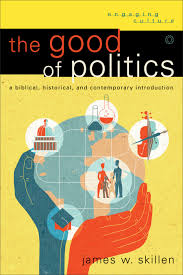 The Good of Politics: A Biblical, Historical, and Contemporary Introduction James Skillen (Baker Academic) $24.00 I did a major, long review of this when it first came out and I maintain it is one of the essentials for anyone serious about thinking about the quandary of working out a Christian view of public justice in a pluralistic culture. A lot of church history and theology, Skillen is masterful in examining how different assumptions about politics, culture, history, institutions, the fall, the nature of redemption, all conspire to shape (or, more likely, to mis-shape) our views of the task of the state. Neither big government democrat committed to “progress” (whatever that means) nor a small-government conservative, Skillen really does work out political theory in light of a Kuyperian insight about the Bible, redemption, and the role of government. BookNotes subscribers know I’ve developed several lists of the best books about a non-partisan; uniquely Christian view of political life and responsible citizenship and this book is always on those lists. Had I been with any poly sci majors I’d have pressed this into their hands. Glad to offer a few here, now, on sale.
The Good of Politics: A Biblical, Historical, and Contemporary Introduction James Skillen (Baker Academic) $24.00 I did a major, long review of this when it first came out and I maintain it is one of the essentials for anyone serious about thinking about the quandary of working out a Christian view of public justice in a pluralistic culture. A lot of church history and theology, Skillen is masterful in examining how different assumptions about politics, culture, history, institutions, the fall, the nature of redemption, all conspire to shape (or, more likely, to mis-shape) our views of the task of the state. Neither big government democrat committed to “progress” (whatever that means) nor a small-government conservative, Skillen really does work out political theory in light of a Kuyperian insight about the Bible, redemption, and the role of government. BookNotes subscribers know I’ve developed several lists of the best books about a non-partisan; uniquely Christian view of political life and responsible citizenship and this book is always on those lists. Had I been with any poly sci majors I’d have pressed this into their hands. Glad to offer a few here, now, on sale.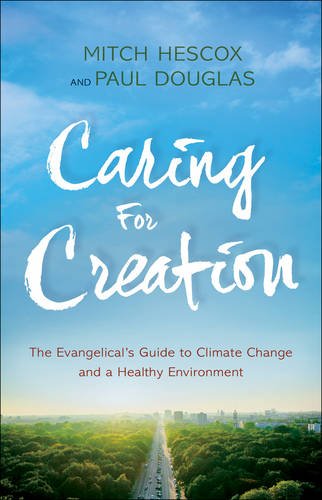 Caring for Creation: The Evangelical’s Guide to Climate Change and a Healthy Environment Mitch Hescox & Paul Douglas (Bethany) $14.99 I hope you recall that we’ve had this dynamic duo in the bookstore here in Dallastown and that we big fans of this easy to read study of climate change and responsible, non-partisan policy ideas. This is such an accessible, balanced, and Biblically-inspiring little book I wanted all the Jubilee participants to know about it. I described it briefly during the main-stage time Saturday morning when we were lamenting what Bible scholars call “the fall” which reminds us that things are “not the way they are supposed to be.” Romans 8 overtly teaches that the whole creation is groaning, that the Earth itself is weighed down, awaiting redemption-at the hands of the new Adams and Eves that, in the Second Adam, can bring healing and hope to the planet. There are more sophisticated books of eco-theology, more urgent books about push us towards climate change activism. This is a great start, though, and in this current political era, it is clear that the Trump administration isn’t going to be funding or enforcing anti-pollution legislation, so things are only going to get worse. This is simply a fact. As pollution increases the church is going to have to be prepared. Get this book now and read it as soon as possible.
Caring for Creation: The Evangelical’s Guide to Climate Change and a Healthy Environment Mitch Hescox & Paul Douglas (Bethany) $14.99 I hope you recall that we’ve had this dynamic duo in the bookstore here in Dallastown and that we big fans of this easy to read study of climate change and responsible, non-partisan policy ideas. This is such an accessible, balanced, and Biblically-inspiring little book I wanted all the Jubilee participants to know about it. I described it briefly during the main-stage time Saturday morning when we were lamenting what Bible scholars call “the fall” which reminds us that things are “not the way they are supposed to be.” Romans 8 overtly teaches that the whole creation is groaning, that the Earth itself is weighed down, awaiting redemption-at the hands of the new Adams and Eves that, in the Second Adam, can bring healing and hope to the planet. There are more sophisticated books of eco-theology, more urgent books about push us towards climate change activism. This is a great start, though, and in this current political era, it is clear that the Trump administration isn’t going to be funding or enforcing anti-pollution legislation, so things are only going to get worse. This is simply a fact. As pollution increases the church is going to have to be prepared. Get this book now and read it as soon as possible. 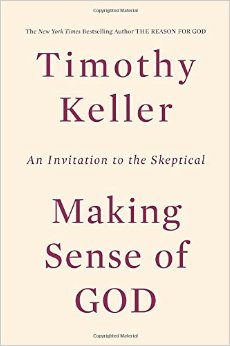 Making Sense of God: An Invitation to the Skeptical Timothy Keller (Viking) $27.00 Many, many young adults love Keller’s astute sermons, listen to him on line and admire his fairly conventional worship and preaching at Redeemer Presbyterian in Manhattan. Keller knows that the gospel is for all of life and has hosted conversations at his PCA church on everything from civility to the arts, bringing in folks as diverse as Pulitzer Prize literary figure Marilyn Robinson and poet Christian Wyman and social justice advocate Bryan Stevenson. His gospel-centered call to “seek the peace of the city” encourages many towards civic engagement (and, to be honest, learned some of this perspective years and years ago through figures in the early 1970s who were also seminal in influencing the CCO and Jubilee; Keller himself has spoken for CCO staff.)
Making Sense of God: An Invitation to the Skeptical Timothy Keller (Viking) $27.00 Many, many young adults love Keller’s astute sermons, listen to him on line and admire his fairly conventional worship and preaching at Redeemer Presbyterian in Manhattan. Keller knows that the gospel is for all of life and has hosted conversations at his PCA church on everything from civility to the arts, bringing in folks as diverse as Pulitzer Prize literary figure Marilyn Robinson and poet Christian Wyman and social justice advocate Bryan Stevenson. His gospel-centered call to “seek the peace of the city” encourages many towards civic engagement (and, to be honest, learned some of this perspective years and years ago through figures in the early 1970s who were also seminal in influencing the CCO and Jubilee; Keller himself has spoken for CCO staff.)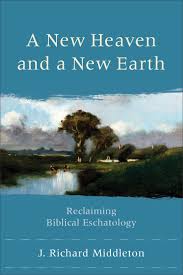 A New Heaven and a New Earth: Reclaiming Biblical Eschatology J. Richard Middleton (Baker Academic) $26.99 Our friend Richard Middleton helped do some CCO staff training decades ago (back when he was writing with Brian Walsh, doing extraordinary – and still relevant! – books such as The Transforming Vision and Truth Is Stranger Than It Used to Be.) Beth and I got to supply the books for a book release event launching A New Heaven and a New Earth into the world, hosted by Redeemer Presbyterian in New York a few years ago. Some of us were tickled pink when we heard Richard was doing the Sunday morning message at Jubilee that year and ever since we’ve carried a b it stack of this hefty volume. Granted, it is more than most want to know about the restoration of creation and even if most Jubilee kids appreciated the “salvation is creation healed” view of the end, this is a through (not to say tedious) study. Blurbs on the back range from Walter Brueggemann (who had nearly said about his book The Liberating Image that is was the best book on the imago dei in all of church history) to Jamie Smith (who says this book, if widely read would “transform North American Christianity”) to Lutheran Hebrew Scriptures scholar Terence Fretheim, to Biblical scholar and thermaculture farmer Sylvia Keesmaat to Creation Regained worldview author Al Wolters… This is a fabulous contribution and a must-read. The last chapter explores living Jubilee a la Luke 4, by the way, and is nearly worth the price of the book just for that.
A New Heaven and a New Earth: Reclaiming Biblical Eschatology J. Richard Middleton (Baker Academic) $26.99 Our friend Richard Middleton helped do some CCO staff training decades ago (back when he was writing with Brian Walsh, doing extraordinary – and still relevant! – books such as The Transforming Vision and Truth Is Stranger Than It Used to Be.) Beth and I got to supply the books for a book release event launching A New Heaven and a New Earth into the world, hosted by Redeemer Presbyterian in New York a few years ago. Some of us were tickled pink when we heard Richard was doing the Sunday morning message at Jubilee that year and ever since we’ve carried a b it stack of this hefty volume. Granted, it is more than most want to know about the restoration of creation and even if most Jubilee kids appreciated the “salvation is creation healed” view of the end, this is a through (not to say tedious) study. Blurbs on the back range from Walter Brueggemann (who had nearly said about his book The Liberating Image that is was the best book on the imago dei in all of church history) to Jamie Smith (who says this book, if widely read would “transform North American Christianity”) to Lutheran Hebrew Scriptures scholar Terence Fretheim, to Biblical scholar and thermaculture farmer Sylvia Keesmaat to Creation Regained worldview author Al Wolters… This is a fabulous contribution and a must-read. The last chapter explores living Jubilee a la Luke 4, by the way, and is nearly worth the price of the book just for that.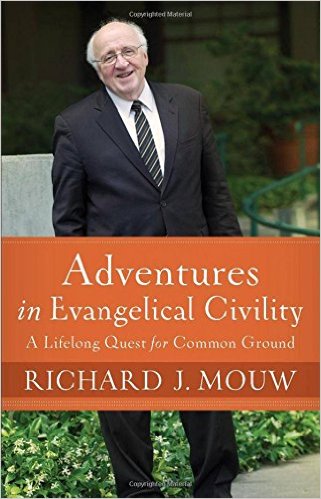 Adventures of Evangelical Civility: A Lifelong Quest for Common Ground Richard Mouw (Brazos Press) $24.99 Mouw’s wonderful little book of social wisdom called Uncommon Decency: Christian Civility in an Uncivil World is certainly a much-needed book these days, but I wanted to remind you of this more recent one – it seemed so germane at Jubilee for young scholars and faculty and others who grapple with intellectual and theological and social issues. This is more or less a memoir by the former Calvin College political philosophy professor whose early books so influenced those of us creating the Jubilee conference in the late 1970s who ended up the President of Fuller Theological Seminary.
Adventures of Evangelical Civility: A Lifelong Quest for Common Ground Richard Mouw (Brazos Press) $24.99 Mouw’s wonderful little book of social wisdom called Uncommon Decency: Christian Civility in an Uncivil World is certainly a much-needed book these days, but I wanted to remind you of this more recent one – it seemed so germane at Jubilee for young scholars and faculty and others who grapple with intellectual and theological and social issues. This is more or less a memoir by the former Calvin College political philosophy professor whose early books so influenced those of us creating the Jubilee conference in the late 1970s who ended up the President of Fuller Theological Seminary. Recovering Classic Evangelicalism: Applying the Wisdom and Vision of Carl F. H. Henry Gregory Alan Thornberry (Crossway) $17.99 I’ve heard quite a bit about this bow-tie rocking New York President of The Kings College who ends up in The New Yorker or the Wall Street Journal, making a case for culturally relevant, thoughtful, distinctively Christian ideals, worked out in the real world by energetic, thoughtful young adults.
Recovering Classic Evangelicalism: Applying the Wisdom and Vision of Carl F. H. Henry Gregory Alan Thornberry (Crossway) $17.99 I’ve heard quite a bit about this bow-tie rocking New York President of The Kings College who ends up in The New Yorker or the Wall Street Journal, making a case for culturally relevant, thoughtful, distinctively Christian ideals, worked out in the real world by energetic, thoughtful young adults. ethical or insightful writers) of engineering to film studies, from health care to mathematics, from urban planning to politics. Of course we take lots of basic sorts of Christian resources for living into discipleship and spiritual formation. I know many of you have read our regular columns the week after Jubilee each year and have expressed appreciation for the good work of the CCO and our role in promoting reading and books to these earnest young adults.
ethical or insightful writers) of engineering to film studies, from health care to mathematics, from urban planning to politics. Of course we take lots of basic sorts of Christian resources for living into discipleship and spiritual formation. I know many of you have read our regular columns the week after Jubilee each year and have expressed appreciation for the good work of the CCO and our role in promoting reading and books to these earnest young adults. This Jubilee conference — this year using the motto “every square inch” drawn from Abraham Kuyper, whose early 1900s Dutch legacy of an all-of-life-redeemed worldview is always hovering around the edges of this event — is about Christ redeeming all things. The CCO’s main motto, by the way, is “transforming college students to transform the world.” That would be every square inch of the world, since Christ loves and died for and is redeeming it all.
This Jubilee conference — this year using the motto “every square inch” drawn from Abraham Kuyper, whose early 1900s Dutch legacy of an all-of-life-redeemed worldview is always hovering around the edges of this event — is about Christ redeeming all things. The CCO’s main motto, by the way, is “transforming college students to transform the world.” That would be every square inch of the world, since Christ loves and died for and is redeeming it all. 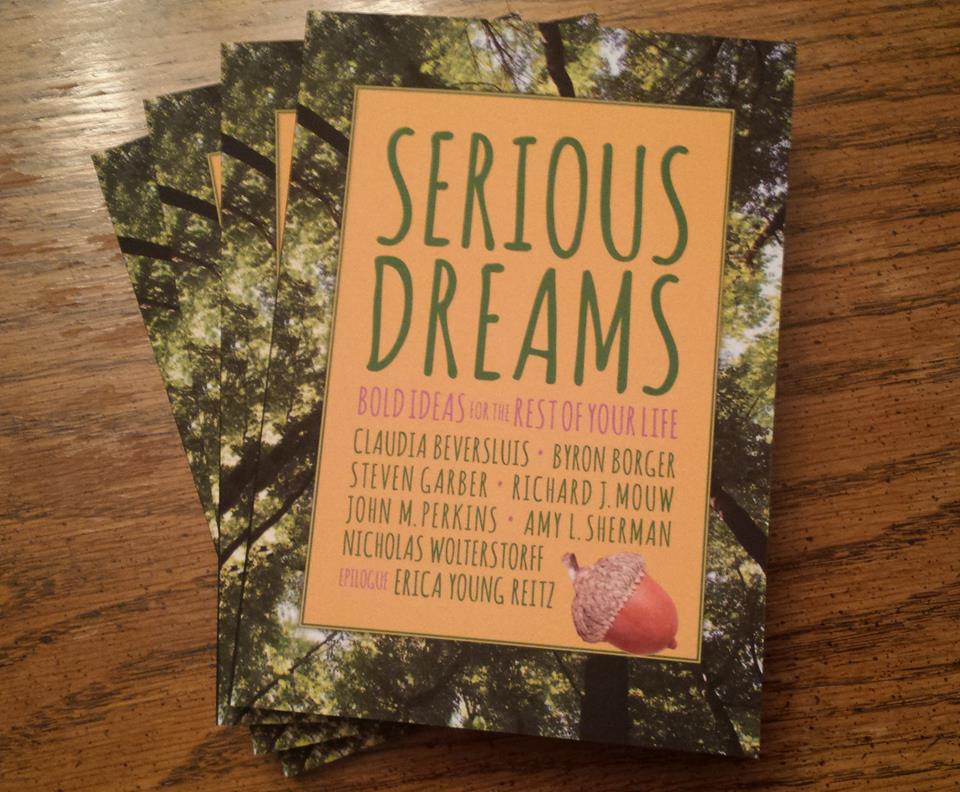 It is inspiring to know that conversations about this kind of stuff — about work and culture and taking faith missionally into the neighborhoods and “every square inch” of creation — going on all over the country and we feel truly blessed by God to have been involved in some of this kind of work, on and off, for 40 years.
It is inspiring to know that conversations about this kind of stuff — about work and culture and taking faith missionally into the neighborhoods and “every square inch” of creation — going on all over the country and we feel truly blessed by God to have been involved in some of this kind of work, on and off, for 40 years.
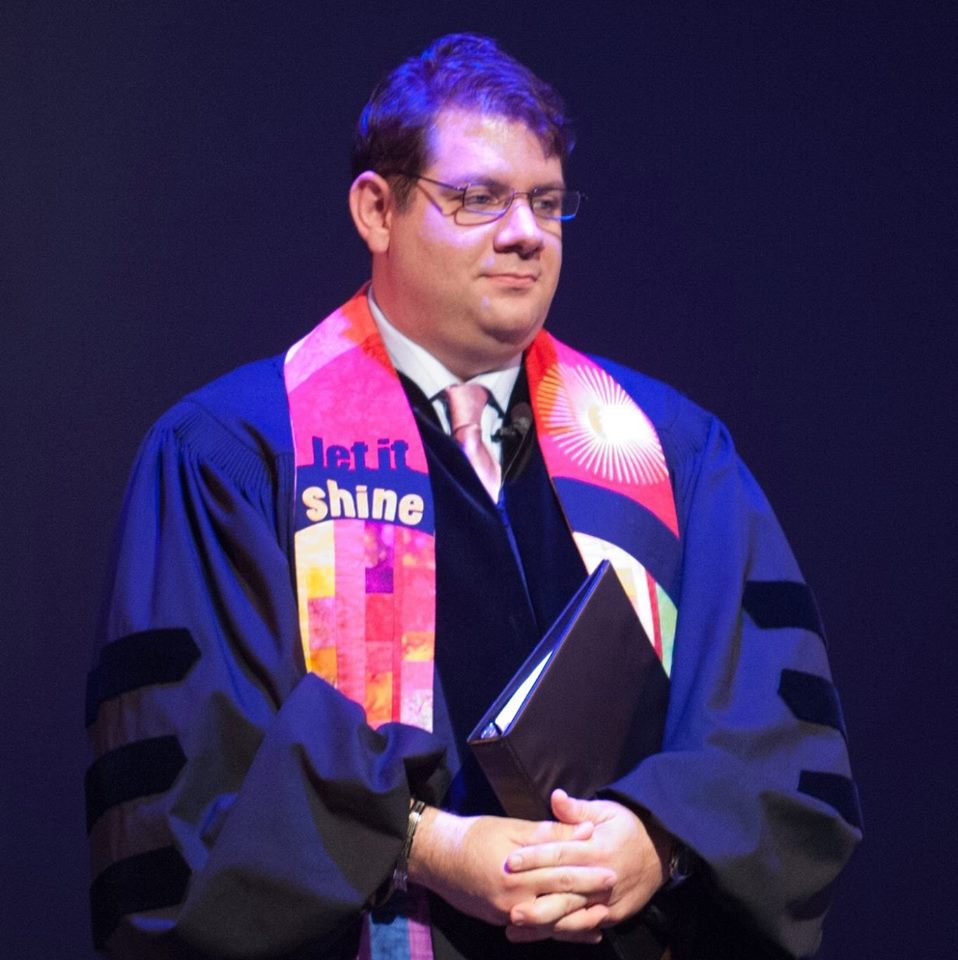
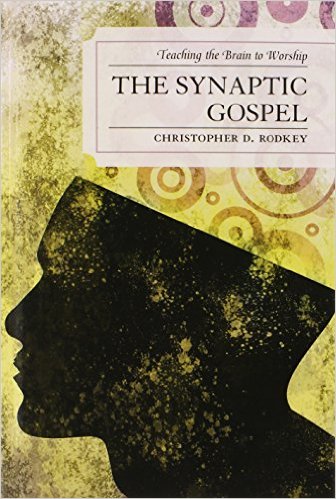
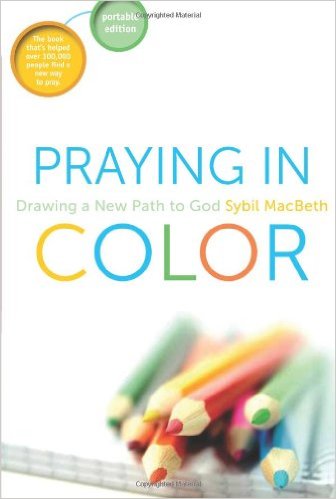
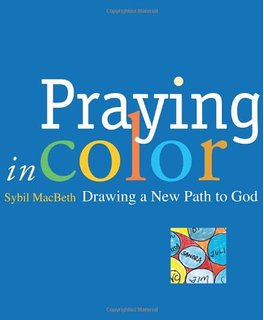 Some of this trend, by the way, was anticipated years earlier when our friends at Paraclete Press published an important book, loved by many, called Praying in Color: Drawing a New Path to God by Sybil Macbeth. There is a slightly larger size ($17.99) and a smaller, “portable” version ($15.99) and they remain popular, even though they are about ways to organize one’s prayer life. They even did one for those less likely to take up this DIY process called Praying in Black and White: A Hands-On Practice for Men ($15.00.)
Some of this trend, by the way, was anticipated years earlier when our friends at Paraclete Press published an important book, loved by many, called Praying in Color: Drawing a New Path to God by Sybil Macbeth. There is a slightly larger size ($17.99) and a smaller, “portable” version ($15.99) and they remain popular, even though they are about ways to organize one’s prayer life. They even did one for those less likely to take up this DIY process called Praying in Black and White: A Hands-On Practice for Men ($15.00.)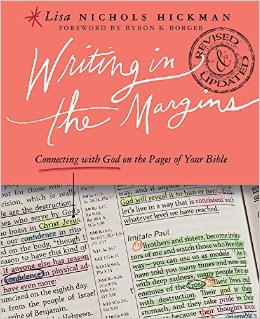
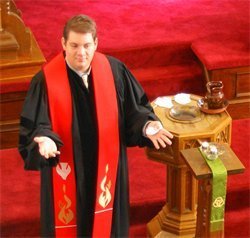
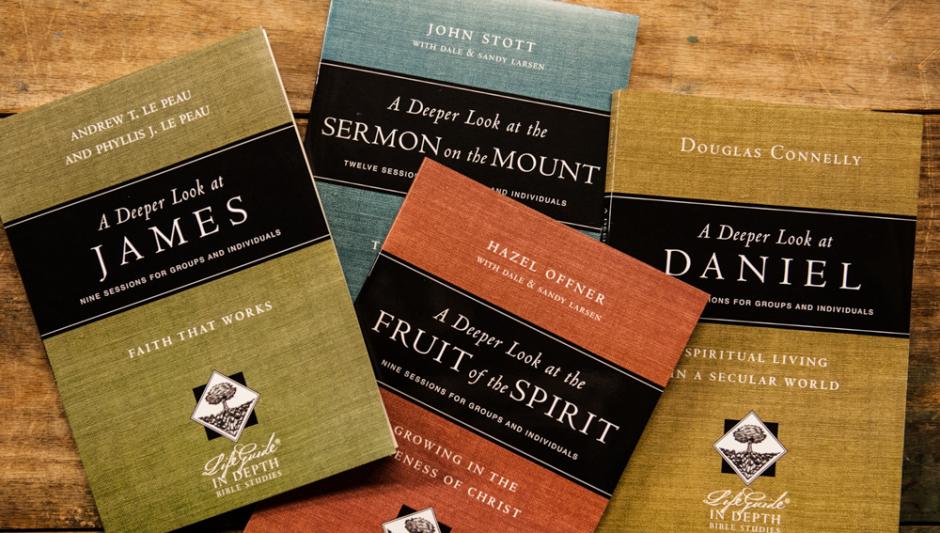
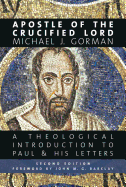
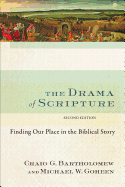
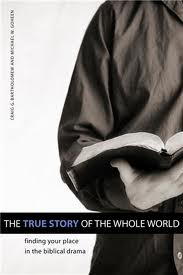
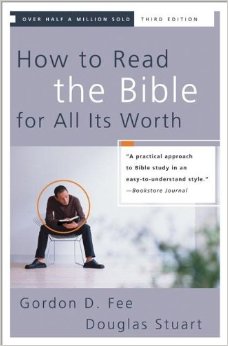 (Zondervan; $19.99) which shows how to read properly a historical narrative, the prophets, the Psalms, Gospels, Letters, Wisdom Literature and more. Every church library or resource center should have a couple of those around, and its sequel, How the Read the Bible Book by Book: A Guided Tour (Zondervan; $19.99.) I hope you know them and pass ’em out to those seeking to learn to read the Bible well.
(Zondervan; $19.99) which shows how to read properly a historical narrative, the prophets, the Psalms, Gospels, Letters, Wisdom Literature and more. Every church library or resource center should have a couple of those around, and its sequel, How the Read the Bible Book by Book: A Guided Tour (Zondervan; $19.99.) I hope you know them and pass ’em out to those seeking to learn to read the Bible well.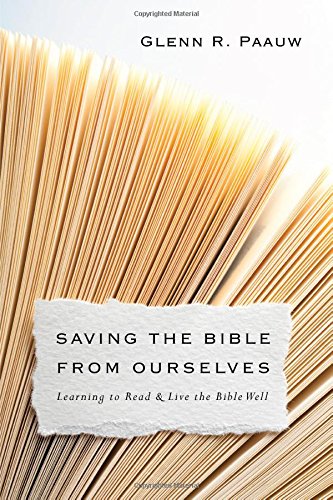
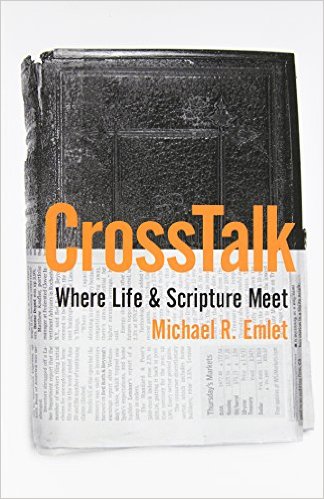
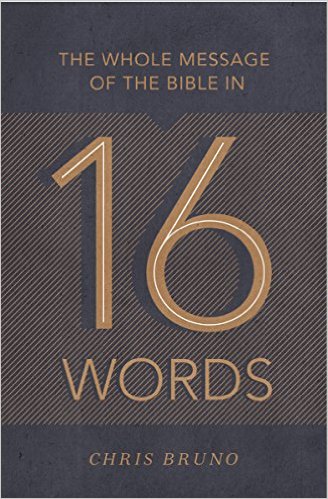 Whole Story of the Bible in 16 Verses (Crossway; $10.99.) Perhaps I can review it more carefully later, but for now, now that I’m really pleased with it’s theology and vision. If last year’s book (explaining the Bible story in 16 verses) was about the plot or storyline of the Bible, this is the structure, the superstructure, if you will, the key teaching of it all, using the metaphor of a building. The chapters include an opening part “The Foundation” which, curiously has, as chapter one “The End” and chapter two, “God.” The next major portion includes three chapters as “The Frame” (which are creation, covenant, kingdom.) The next big part is called “The Superstructure” and includes words such as temple, messiah, Israel, land, idols, judgement, exodus, wisdom, law, Spirit, mission.
Whole Story of the Bible in 16 Verses (Crossway; $10.99.) Perhaps I can review it more carefully later, but for now, now that I’m really pleased with it’s theology and vision. If last year’s book (explaining the Bible story in 16 verses) was about the plot or storyline of the Bible, this is the structure, the superstructure, if you will, the key teaching of it all, using the metaphor of a building. The chapters include an opening part “The Foundation” which, curiously has, as chapter one “The End” and chapter two, “God.” The next major portion includes three chapters as “The Frame” (which are creation, covenant, kingdom.) The next big part is called “The Superstructure” and includes words such as temple, messiah, Israel, land, idols, judgement, exodus, wisdom, law, Spirit, mission. 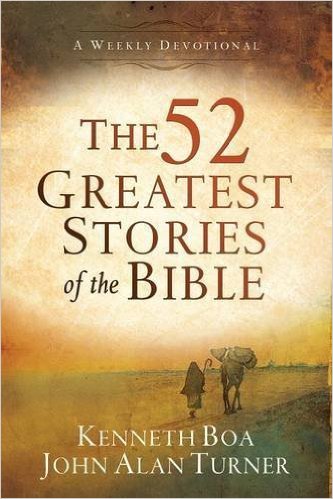

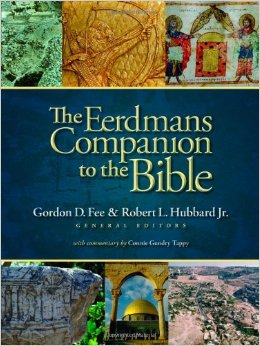
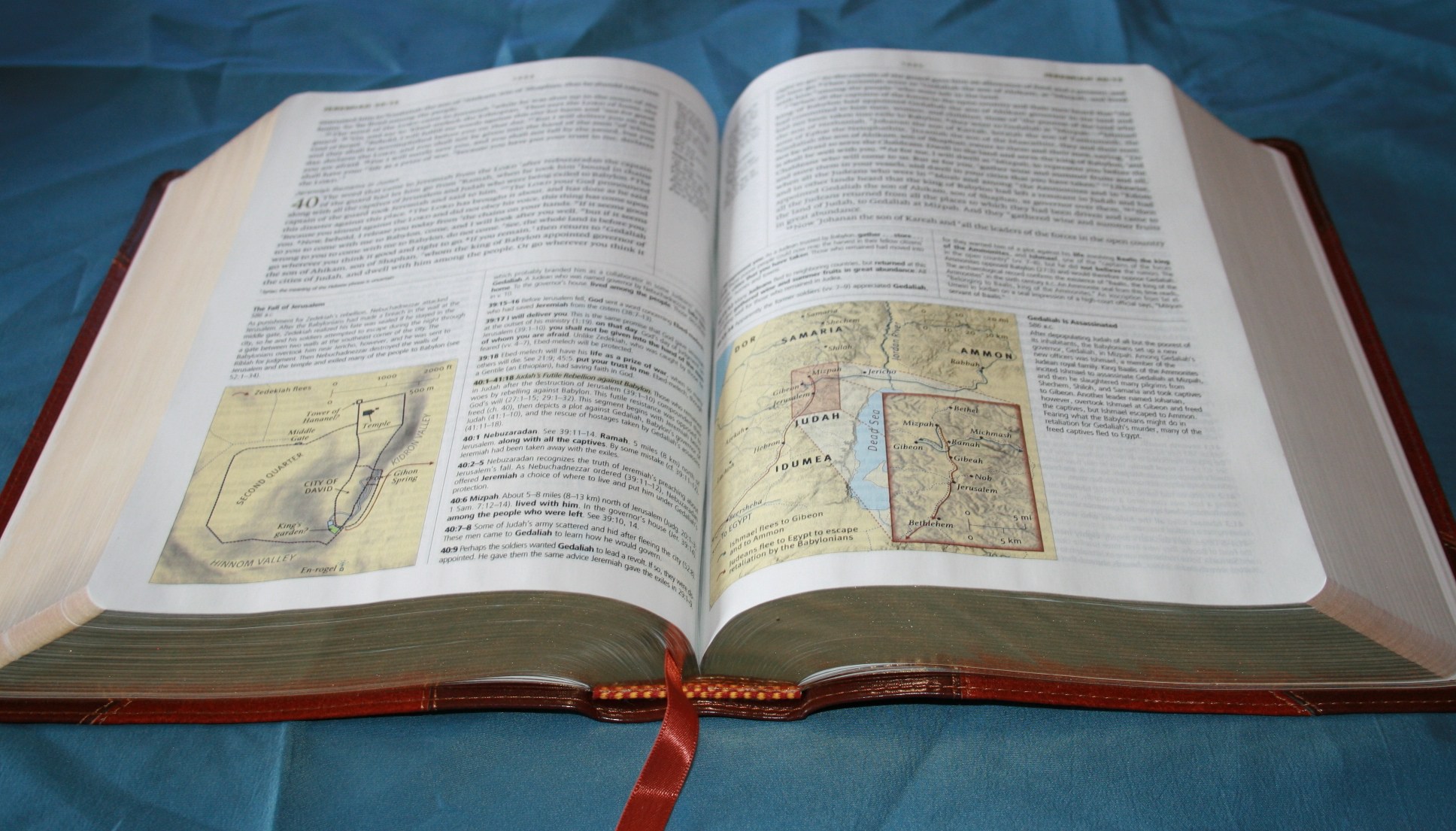 Scriptures at that point. Of course there are other features, standard in any good study edition – sidebars that offer extra little background articles or meditations, character studies, timelines, maps, and introductions to each book of the Bible. The large concordances in these big volumes make buying a separate concordance unnecessary for most of us; the cross-references give you plenty of recommended verse to look up to supplement whatever you are studying. The background data and facts and insights about the culture and theology of the ancient world in any good study Bible are worth their weight in gold.
Scriptures at that point. Of course there are other features, standard in any good study edition – sidebars that offer extra little background articles or meditations, character studies, timelines, maps, and introductions to each book of the Bible. The large concordances in these big volumes make buying a separate concordance unnecessary for most of us; the cross-references give you plenty of recommended verse to look up to supplement whatever you are studying. The background data and facts and insights about the culture and theology of the ancient world in any good study Bible are worth their weight in gold. 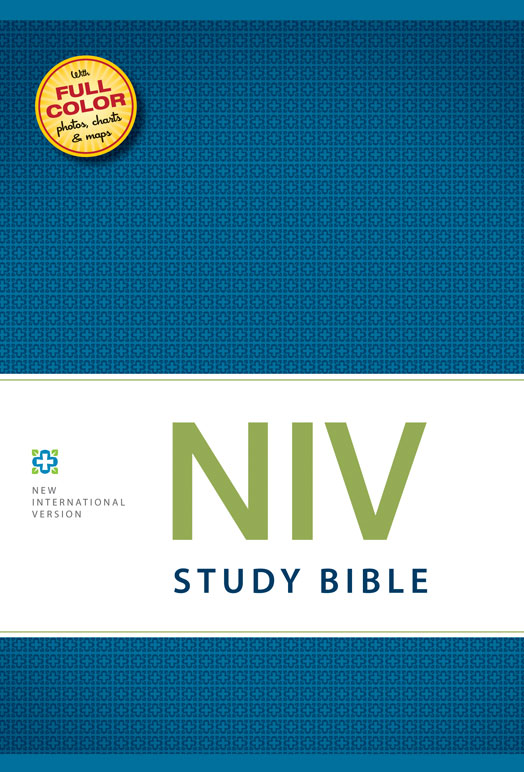
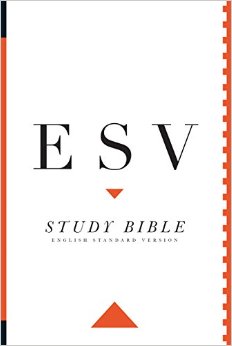
 NIV Study Bible
NIV Study Bible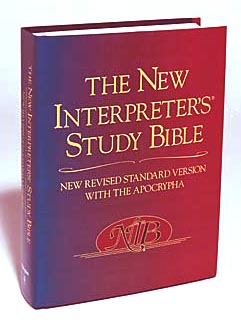
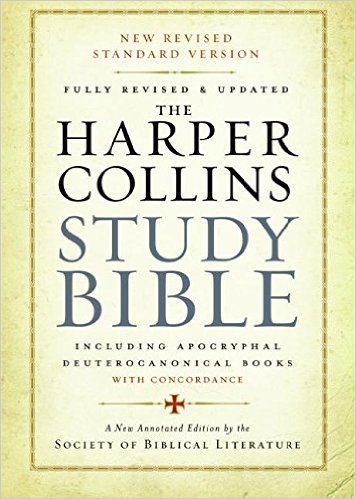
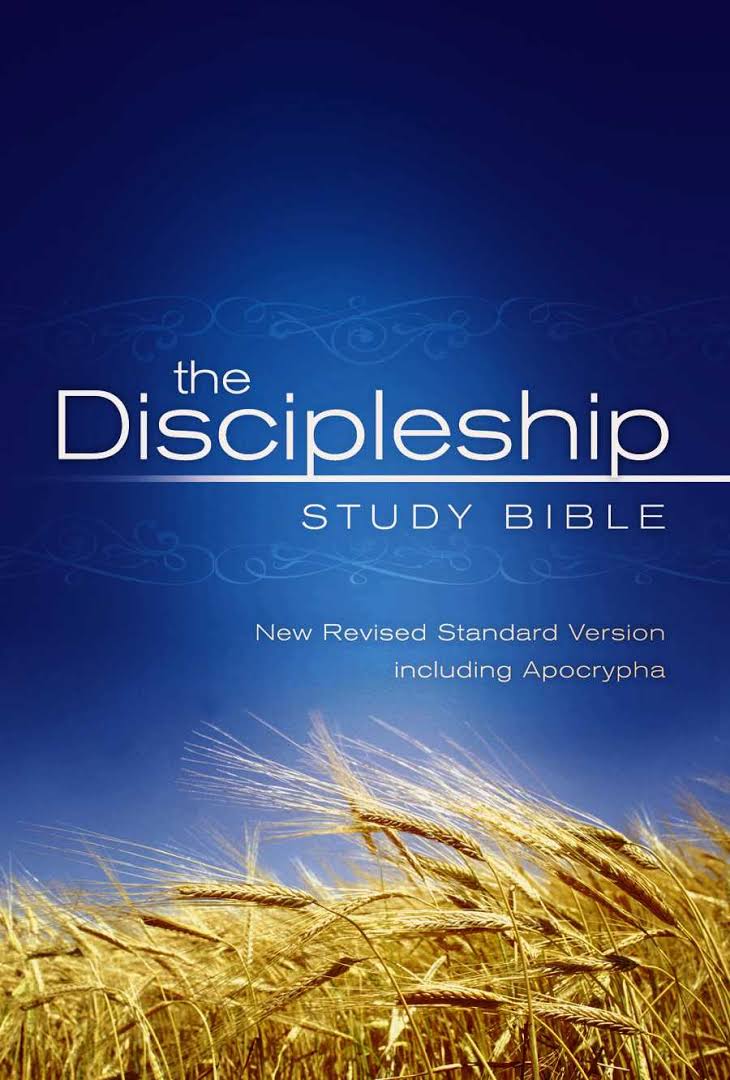 The Discipleship Study Bible (Westminster John Knox; $40.00) This was created almost a decade ago with the editorial direction of Bruce Birch, Brian Blount, Thomas Long, and Gail O’Day, all serious scholars with great commitment to the mainline churches. I like what the publisher said about it:
The Discipleship Study Bible (Westminster John Knox; $40.00) This was created almost a decade ago with the editorial direction of Bruce Birch, Brian Blount, Thomas Long, and Gail O’Day, all serious scholars with great commitment to the mainline churches. I like what the publisher said about it:

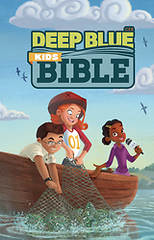
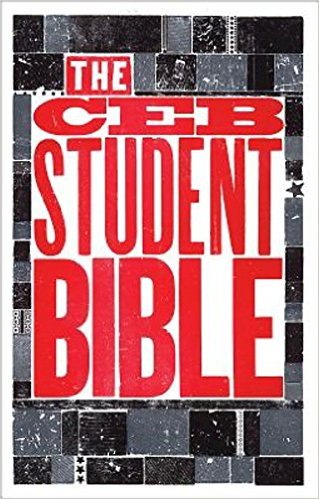 back on the hearing of it, in nursing homes and college campuses, in big churches and small ones, among varies ethnic churches and in different parts of the country.) The CEB is a really interesting rendition and I wish it were better known. Their children’s study Bible (The Deep Blue Kids Bible) is mostly really great and their teen edition (The CEB Student Bible) is very good, too. Each come in a variety of styles and we stock them all. We’d love to talk more about this if you have any questions…
back on the hearing of it, in nursing homes and college campuses, in big churches and small ones, among varies ethnic churches and in different parts of the country.) The CEB is a really interesting rendition and I wish it were better known. Their children’s study Bible (The Deep Blue Kids Bible) is mostly really great and their teen edition (The CEB Student Bible) is very good, too. Each come in a variety of styles and we stock them all. We’d love to talk more about this if you have any questions…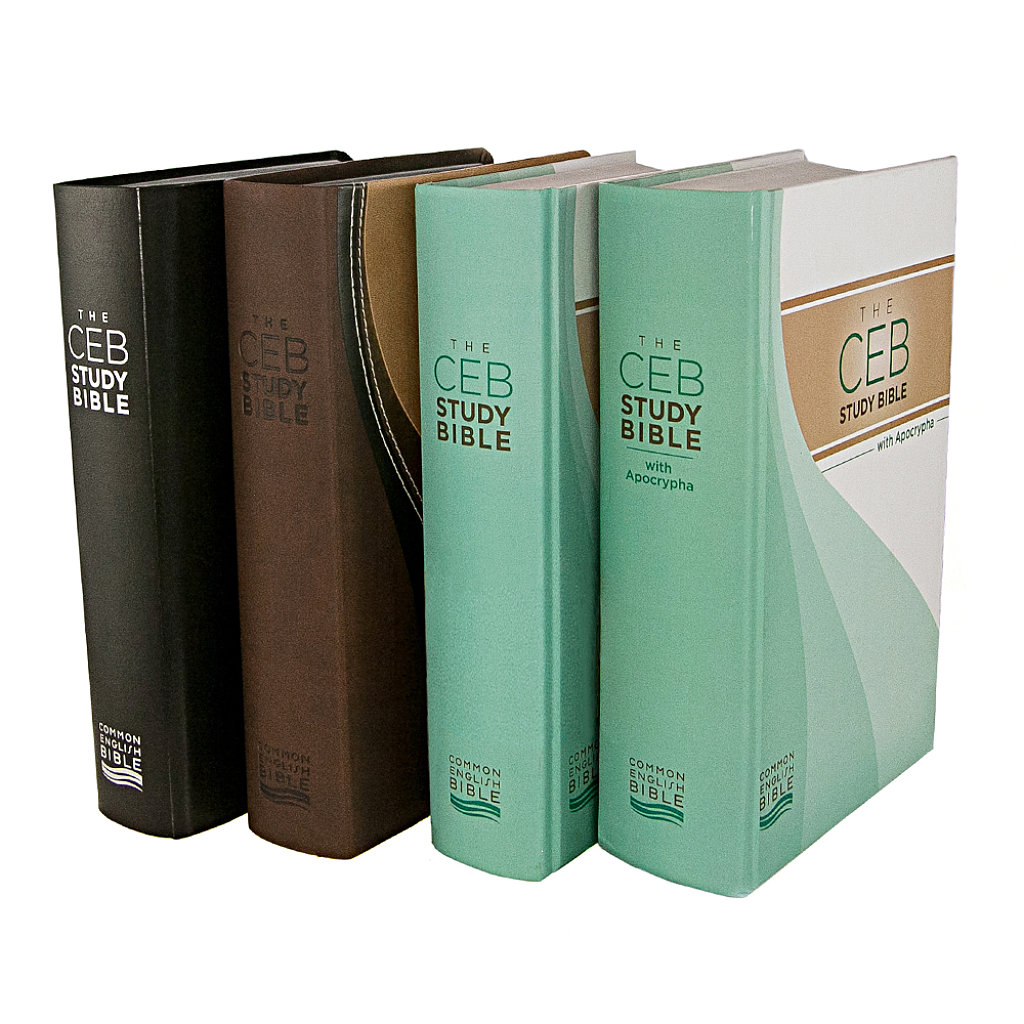

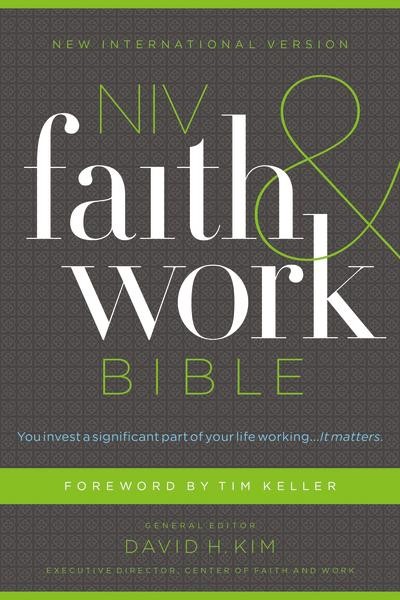 The NIV Faith & Work Study Bible senior editor David Kim (Zondervan) $44.99 in hardback; $74.99 in black/gray faux leather
The NIV Faith & Work Study Bible senior editor David Kim (Zondervan) $44.99 in hardback; $74.99 in black/gray faux leather 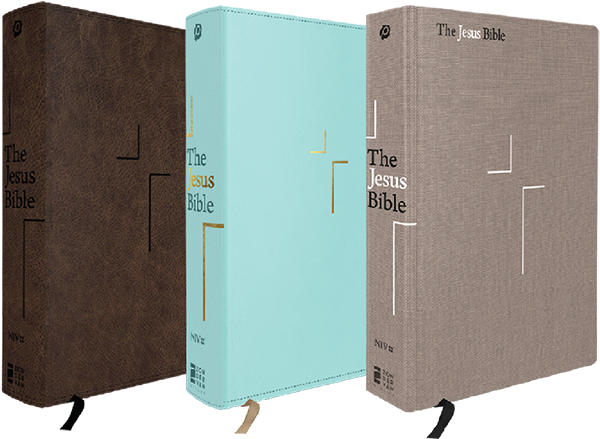 The Jesus Bible: Sixty-Six Books. One Story. All About One Name edited by Louis Giglio, Max Lucado, John Piper, Ravi Zacharias, Randy Alcorn and others (Passion Publishing/Zondervan) $44.99 in sturdy linen hardback; $69.99 in Brown Leathersoft or a Robin’s Egg pale blue Leathersoft All have a 8.7 font size.
The Jesus Bible: Sixty-Six Books. One Story. All About One Name edited by Louis Giglio, Max Lucado, John Piper, Ravi Zacharias, Randy Alcorn and others (Passion Publishing/Zondervan) $44.99 in sturdy linen hardback; $69.99 in Brown Leathersoft or a Robin’s Egg pale blue Leathersoft All have a 8.7 font size.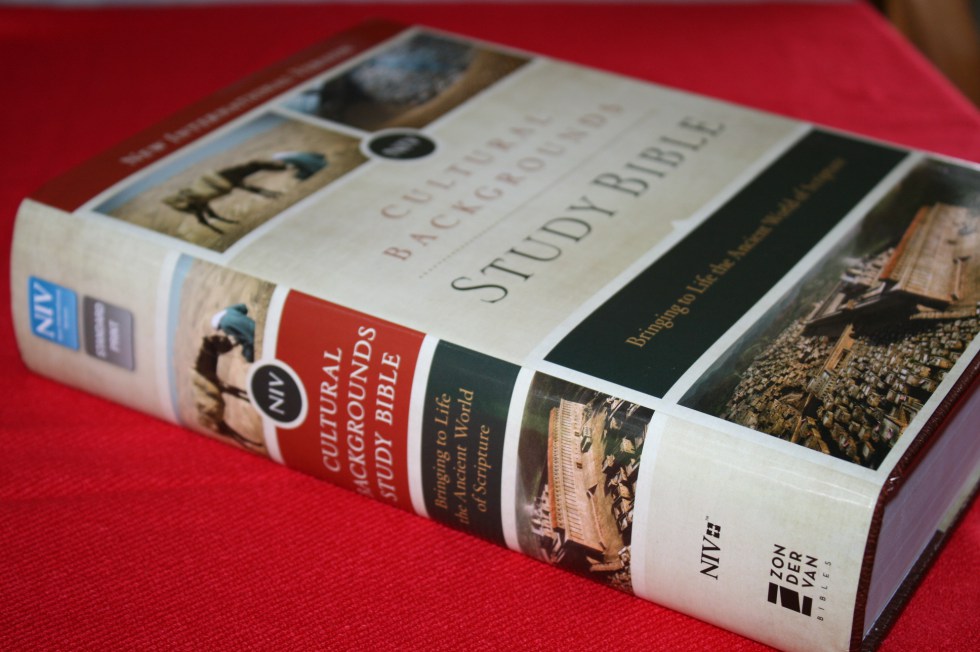 The NIV Cultural Backgrounds Study Bible: Bringing to Life the Ancient World of Scripture Senior Editor, Craig Kenner & John Walton (Zondervan) $49.99, hardcover; Tan/Brown imitation leather, $79.99; “Context changes everything” it shouts on the back cover of this very handsome, very colorful, new study Bible. This edition brings behind-the-scenes background information to the fore so you can see what is really going on–in context, all guided by one of the world’s leading experts on this exact matter, the
The NIV Cultural Backgrounds Study Bible: Bringing to Life the Ancient World of Scripture Senior Editor, Craig Kenner & John Walton (Zondervan) $49.99, hardcover; Tan/Brown imitation leather, $79.99; “Context changes everything” it shouts on the back cover of this very handsome, very colorful, new study Bible. This edition brings behind-the-scenes background information to the fore so you can see what is really going on–in context, all guided by one of the world’s leading experts on this exact matter, the 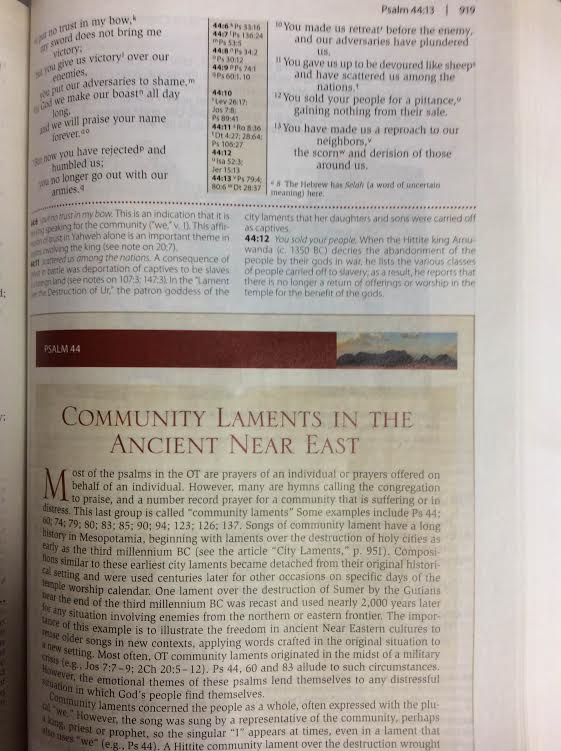 remarkable Craig Keener and John Walton. There is so much rich meaning to be found when you learn just a bit about the historical setting, the archeological evidences, the word meanings or the cultural customs that are in and around any given passage. I am sure you recall a time when a pastor or Bible teacher said “back in those days what this saying meant was…” or “if you only knew what buildings or statues or walls were in that town as Jesus spoke, you’d realize – ” and the like. This gives targeted book introductions that explain the context in which each book of the Bible was written. It has verse-by-verse study notes, of course, but the notes feature new dimensions of insights to even familiar passages by explaining cultural context stuff.
remarkable Craig Keener and John Walton. There is so much rich meaning to be found when you learn just a bit about the historical setting, the archeological evidences, the word meanings or the cultural customs that are in and around any given passage. I am sure you recall a time when a pastor or Bible teacher said “back in those days what this saying meant was…” or “if you only knew what buildings or statues or walls were in that town as Jesus spoke, you’d realize – ” and the like. This gives targeted book introductions that explain the context in which each book of the Bible was written. It has verse-by-verse study notes, of course, but the notes feature new dimensions of insights to even familiar passages by explaining cultural context stuff.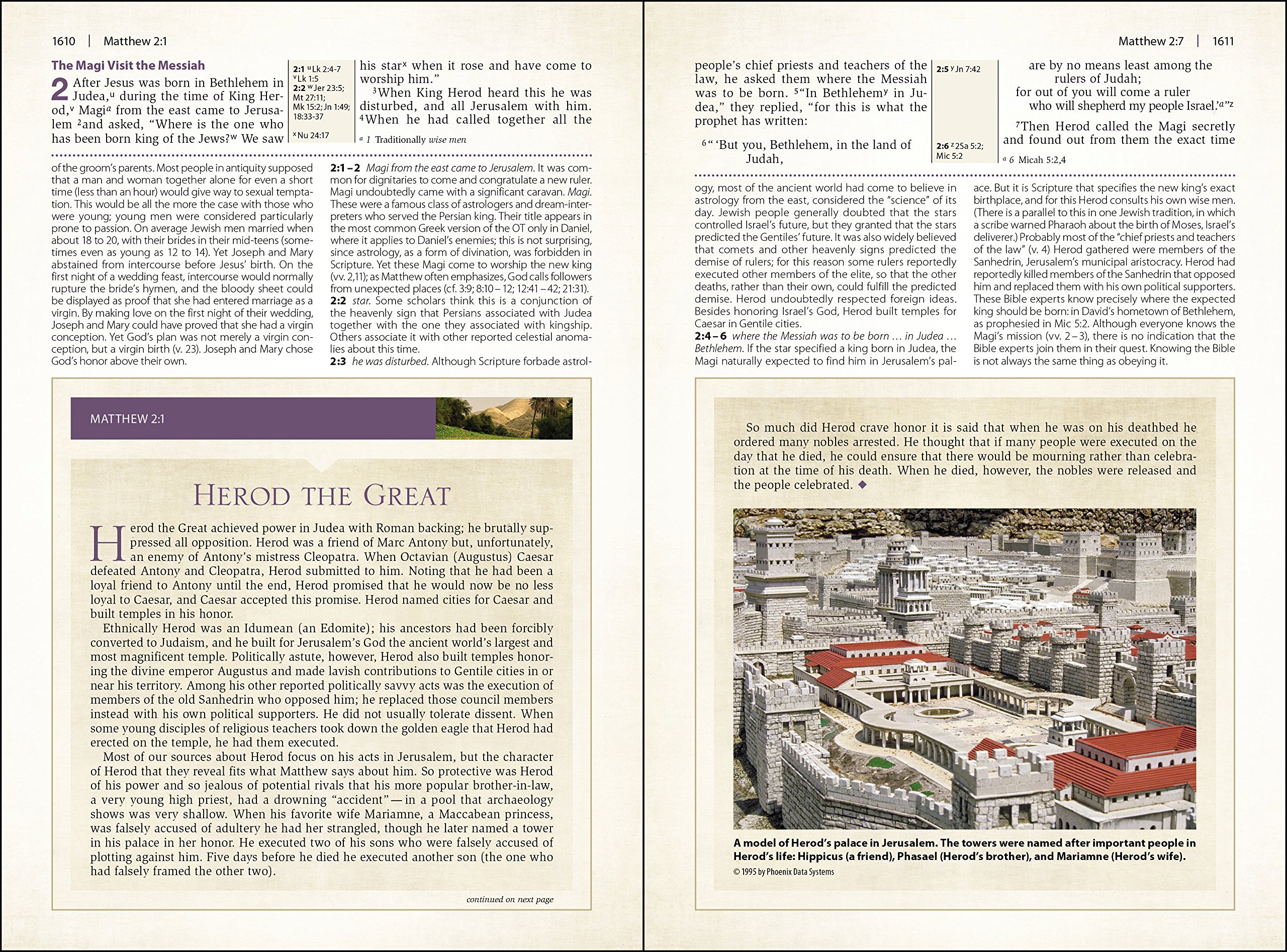
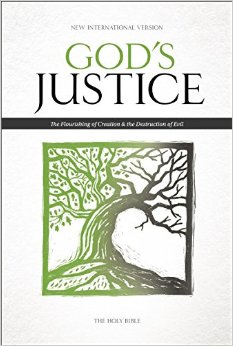 God’s Justice Study Bible: The Flourishing of Creation and the Destruction of Evil Senior Editor, Tim Stafford (Zondervan) $39.99 I reviewed this when it first came out and exclaimed how great it was – some nice sidebars and articles, some graphic touches that show the overarching plan of God to bring healing and reconciliation and restoration to the broken creation. (I like the single column layout on the page, too.) What is exceptional about this sturdy, useful, edition is that is uses scholars from around the world, and, further, that they are tuned in to the often-missed themes of justice and public righteousness that are evident in any careful reading of these texts. If you are interested – or, maybe, if your not interested – in social justice, this Bible is a must. If you want to learn the meaning of texts from dozens of well-informed, reliable third world Bible scholars, men and women from every continent, then this will bring a somewhat fresh take.
God’s Justice Study Bible: The Flourishing of Creation and the Destruction of Evil Senior Editor, Tim Stafford (Zondervan) $39.99 I reviewed this when it first came out and exclaimed how great it was – some nice sidebars and articles, some graphic touches that show the overarching plan of God to bring healing and reconciliation and restoration to the broken creation. (I like the single column layout on the page, too.) What is exceptional about this sturdy, useful, edition is that is uses scholars from around the world, and, further, that they are tuned in to the often-missed themes of justice and public righteousness that are evident in any careful reading of these texts. If you are interested – or, maybe, if your not interested – in social justice, this Bible is a must. If you want to learn the meaning of texts from dozens of well-informed, reliable third world Bible scholars, men and women from every continent, then this will bring a somewhat fresh take.
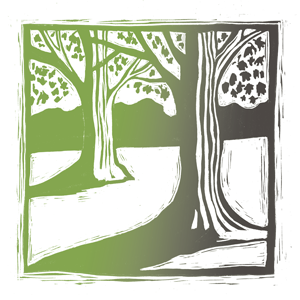 useful and reliable study edition. The introductions to each book are very, very good, interesting and informative, well worth reading themselves! But, realize, these texts about justice, about God’s desire for flourishing and public justice and about evil and our role in promoting God’s reign in Christ, are really there and those who can help us see and understand and respond well are allies in our discipleship; perhaps they will help us see a bigger picture of God’s unfolding plan than we saw before. I think this particular
useful and reliable study edition. The introductions to each book are very, very good, interesting and informative, well worth reading themselves! But, realize, these texts about justice, about God’s desire for flourishing and public justice and about evil and our role in promoting God’s reign in Christ, are really there and those who can help us see and understand and respond well are allies in our discipleship; perhaps they will help us see a bigger picture of God’s unfolding plan than we saw before. I think this particular  study Bible is a tremendous resource and I highly, highly recommend it; whether you love the NIV or not, this is such a great study Bible you should seriously consider it.
study Bible is a tremendous resource and I highly, highly recommend it; whether you love the NIV or not, this is such a great study Bible you should seriously consider it. 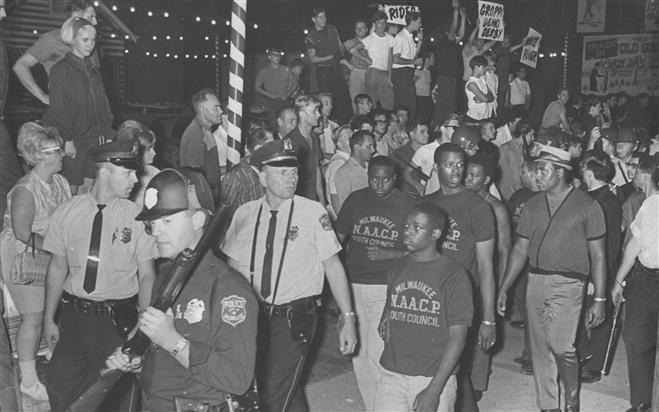 the most racially segregated cities in America, more than 10,000 whites pushed them back in a scene perhaps reminiscent of the bloody day at the famous Edmund Pettus Bridge in Selma a few years earlier. For 200 more days the dedicated black and white marchers protested, pushing on to symbolically insist on fair treatment and desegregation. For 200 more days they were abused, pushed back, shot at with sniper fire, their NAACP headquarters burned, their clergy leaders arrested. Two hundred persistent days in a row!
the most racially segregated cities in America, more than 10,000 whites pushed them back in a scene perhaps reminiscent of the bloody day at the famous Edmund Pettus Bridge in Selma a few years earlier. For 200 more days the dedicated black and white marchers protested, pushing on to symbolically insist on fair treatment and desegregation. For 200 more days they were abused, pushed back, shot at with sniper fire, their NAACP headquarters burned, their clergy leaders arrested. Two hundred persistent days in a row! 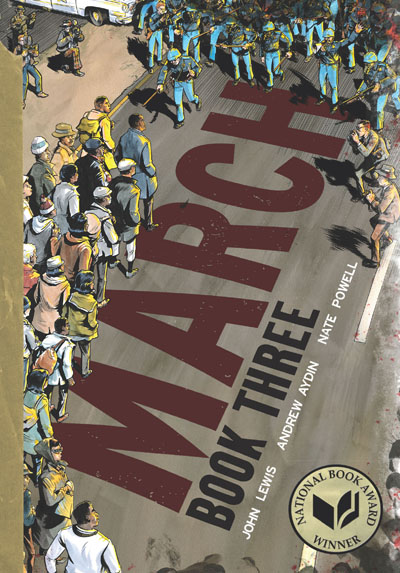 March Book Three John Lewis, Andrew Aydin, Nate Powell (Top Shelf Productions) $19.99 This third and final installment of the award-wining graphic novel trilogy was released late last year and has garnered award after prestigious award.
March Book Three John Lewis, Andrew Aydin, Nate Powell (Top Shelf Productions) $19.99 This third and final installment of the award-wining graphic novel trilogy was released late last year and has garnered award after prestigious award. 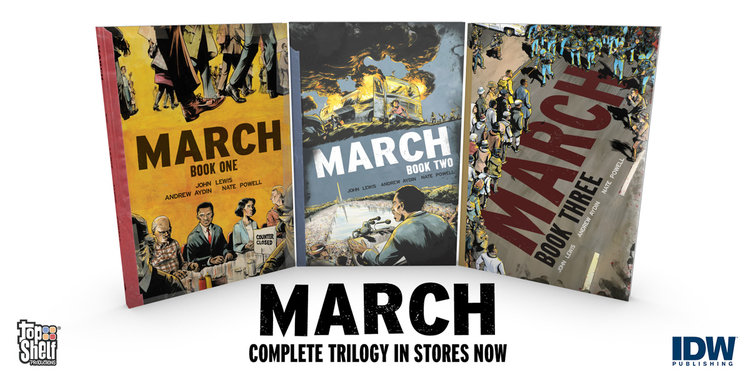
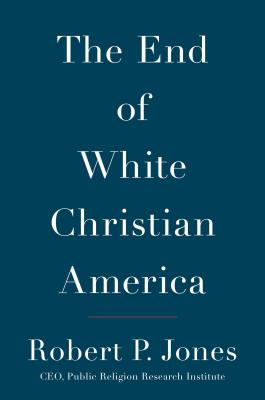 The End of White Christian America Robert P. Jones (Simon & Schuster) $28.00 This powerful and significant book is not brand new but it was released in the late summer of the 2016. It is a major work, provocative and fascinating, “clarifying and useful” as one white pastor noted. It has been called “brilliant” and “eloquent” and the author himself has been called “intelligent and fair-minded.” I cannot give a full accounting of it but I can assure you it is one of the important books to help us put into context much of the anxiety and fear pervasive in our culture these days. It is an argument many have alluded to — I’ve heard Walter Brueggemann and Leonard Sweet and Tom Sine and Marva Dawn give their variations of this general critique decades ago. There is simply no doubt that a certain sort of hegemony has eroded in the last generation or so and there is also no doubt that it has caused resentment in some quarters and anxiety nearly everywhere. (It is to this anxiety that David Gushee addressed his helpful, recent book, A Letter to My Anxious Christian Friends, suggesting that for people of faith it isn’t so bad since we have Biblical and spiritual resources to cope, and it is to this situation that Rod Dreher offers his important, dire proposal in the soon-to-be-released The Benedict Option: A Strategy for Christians in a Post-Christian Nation. PRE-ORDER that from us if you’d like; we’ll have it March 14, 2017.)
The End of White Christian America Robert P. Jones (Simon & Schuster) $28.00 This powerful and significant book is not brand new but it was released in the late summer of the 2016. It is a major work, provocative and fascinating, “clarifying and useful” as one white pastor noted. It has been called “brilliant” and “eloquent” and the author himself has been called “intelligent and fair-minded.” I cannot give a full accounting of it but I can assure you it is one of the important books to help us put into context much of the anxiety and fear pervasive in our culture these days. It is an argument many have alluded to — I’ve heard Walter Brueggemann and Leonard Sweet and Tom Sine and Marva Dawn give their variations of this general critique decades ago. There is simply no doubt that a certain sort of hegemony has eroded in the last generation or so and there is also no doubt that it has caused resentment in some quarters and anxiety nearly everywhere. (It is to this anxiety that David Gushee addressed his helpful, recent book, A Letter to My Anxious Christian Friends, suggesting that for people of faith it isn’t so bad since we have Biblical and spiritual resources to cope, and it is to this situation that Rod Dreher offers his important, dire proposal in the soon-to-be-released The Benedict Option: A Strategy for Christians in a Post-Christian Nation. PRE-ORDER that from us if you’d like; we’ll have it March 14, 2017.)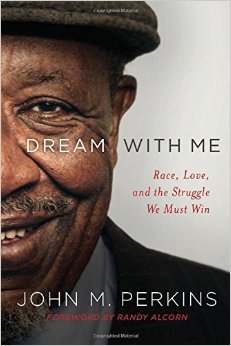 Dream With Me: Race, Love, and the Struggle We Must Win John M. Perkins (Baker Books) $19.99 There is hardly anyone I esteem more within the broader evangelical Christian community that John Perkins. When I was doing my own little book, a collection of inspirational speeches turned into essays for young adults, I said quite simply that I had to have a chapter by John Perkins. I had a number of pretty famous contributors but John’s role was a deal-breaker for me. Graciously he and his staff gave us a tape to transcribe and we happily put it in Serious Dreams: Bold Ideas for the Rest of Your Life. I say this to assure you that I’m not blowing smoke here: you should read Dr. Perkins’s books and this brand new one looks tremendous. It came two days ago so is brand, brand new.
Dream With Me: Race, Love, and the Struggle We Must Win John M. Perkins (Baker Books) $19.99 There is hardly anyone I esteem more within the broader evangelical Christian community that John Perkins. When I was doing my own little book, a collection of inspirational speeches turned into essays for young adults, I said quite simply that I had to have a chapter by John Perkins. I had a number of pretty famous contributors but John’s role was a deal-breaker for me. Graciously he and his staff gave us a tape to transcribe and we happily put it in Serious Dreams: Bold Ideas for the Rest of Your Life. I say this to assure you that I’m not blowing smoke here: you should read Dr. Perkins’s books and this brand new one looks tremendous. It came two days ago so is brand, brand new.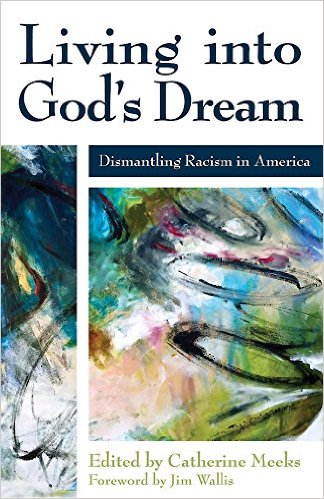 Living into God’s Dream: Dismantling Racism in America edited by Catherine Meeks (Morehouse Publishing) $18.00 I was thrilled to see this book, published by the Episcopalian publishing house, put together by this strong black woman who I was first introduced to, I believe, by John Perkins. Meeks now serves the Diocese of Atlanta as the chair of their Commission for Dismantling Racism, called “The Beloved Community.” Before that, she was a Distinguished Professor of Socio-Cultural Studies at Wesleyan College. She wrote a previous book we’ve stocked called Standing on Their Shoulders: A Celebration of African American Women.
Living into God’s Dream: Dismantling Racism in America edited by Catherine Meeks (Morehouse Publishing) $18.00 I was thrilled to see this book, published by the Episcopalian publishing house, put together by this strong black woman who I was first introduced to, I believe, by John Perkins. Meeks now serves the Diocese of Atlanta as the chair of their Commission for Dismantling Racism, called “The Beloved Community.” Before that, she was a Distinguished Professor of Socio-Cultural Studies at Wesleyan College. She wrote a previous book we’ve stocked called Standing on Their Shoulders: A Celebration of African American Women.
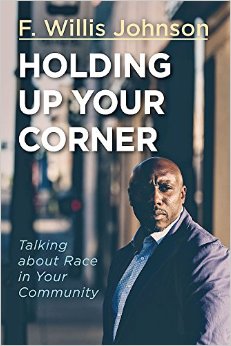 Holding Up Your Corner: Talking About Race In Your Community F. Willis Johnson (Abingdon Press) $15.99 This book came out in the middle of the holiday selling season a few weeks ago and I just didn’t have time to study it. Now, after a few weeks of flipping around through it, I’ve concluded I really do need to work with this. And some of you do, too. It is for Christian leaders (pastor’s mostly, I gather) inviting and equipping them to “respond with confidence when crises occur, lower their own inhibitions about addressing the topic of race, and reclaim their authority as prophetic witnesses and leaders in order to transform their communities.” This book promises practical and foundational sorts of guidance, empowering leaders to:
Holding Up Your Corner: Talking About Race In Your Community F. Willis Johnson (Abingdon Press) $15.99 This book came out in the middle of the holiday selling season a few weeks ago and I just didn’t have time to study it. Now, after a few weeks of flipping around through it, I’ve concluded I really do need to work with this. And some of you do, too. It is for Christian leaders (pastor’s mostly, I gather) inviting and equipping them to “respond with confidence when crises occur, lower their own inhibitions about addressing the topic of race, and reclaim their authority as prophetic witnesses and leaders in order to transform their communities.” This book promises practical and foundational sorts of guidance, empowering leaders to: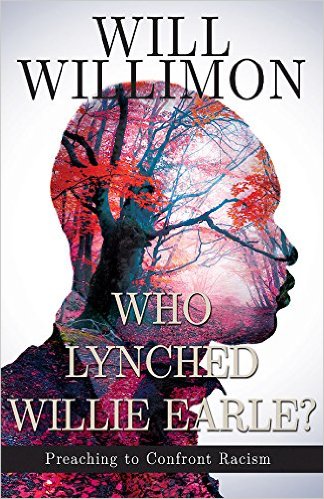 Who Lynched Willie Earle: Preaching to Confront Racism Will Willimon (Abingdon) $17.99 This brand new book came last week and I am thrilled to recommend it. Willimon, you surely know, was Dean of the Chapel at Duke and then a United Methodist Bishop in Alabama. He’s known as an elegant writer and eloquent speaker, even when he’s blunt and insistent on being faithful to the ways of Jesus. (He has pondered about this kind of stuff for years: the classic book written with Stan Hauerwas, Resident Aliens, was re-issued a year or so ago in an anniversary edition and last year he released Fear of the Other, a small but potent book on why we fear “the other” and how to Christianly attend to xenophobias of various sorts.)
Who Lynched Willie Earle: Preaching to Confront Racism Will Willimon (Abingdon) $17.99 This brand new book came last week and I am thrilled to recommend it. Willimon, you surely know, was Dean of the Chapel at Duke and then a United Methodist Bishop in Alabama. He’s known as an elegant writer and eloquent speaker, even when he’s blunt and insistent on being faithful to the ways of Jesus. (He has pondered about this kind of stuff for years: the classic book written with Stan Hauerwas, Resident Aliens, was re-issued a year or so ago in an anniversary edition and last year he released Fear of the Other, a small but potent book on why we fear “the other” and how to Christianly attend to xenophobias of various sorts.) 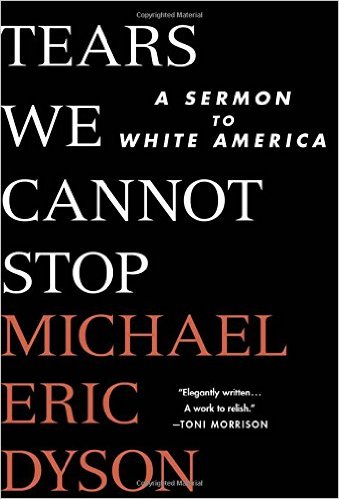 Tears We Cannot Stop: A Sermon To White America Michael Eric Dyson (St. Martin’s Press) $24.99 Well, if conventional, evangelical sermonizing taught by the likes of seminary prof Will Willimon isn’t your literary cup of tea, then perhaps this master of passionate, bold, literary prose who is a sociology prof (at Georgetown) will grab your heart and imagination. Dyson, an old Philly guy, as I recall, is known for writing fun and informative stuff on a wide variety of topics. He’s written about race and power and religion but often gets at that by way of pop culture, sports and music and more. I loved his old book on Tupac (Holler If You Hear Me) and we used to carry his one on Marvin Gaye. Between God and Gangster Rap was a pivotal resource. He’s written bunches of other work – hardly any other black public intellectual has been so prolific – including well received books about Malcolm X and about King and, in 2016, an important work on Obama called The Black Presidency: Barak Obama and the Politics of Race in America. The former President, himself (who read widely as we know) has said, “Anyone who speaks after Michael Eric Dyson pales in comparison.”)
Tears We Cannot Stop: A Sermon To White America Michael Eric Dyson (St. Martin’s Press) $24.99 Well, if conventional, evangelical sermonizing taught by the likes of seminary prof Will Willimon isn’t your literary cup of tea, then perhaps this master of passionate, bold, literary prose who is a sociology prof (at Georgetown) will grab your heart and imagination. Dyson, an old Philly guy, as I recall, is known for writing fun and informative stuff on a wide variety of topics. He’s written about race and power and religion but often gets at that by way of pop culture, sports and music and more. I loved his old book on Tupac (Holler If You Hear Me) and we used to carry his one on Marvin Gaye. Between God and Gangster Rap was a pivotal resource. He’s written bunches of other work – hardly any other black public intellectual has been so prolific – including well received books about Malcolm X and about King and, in 2016, an important work on Obama called The Black Presidency: Barak Obama and the Politics of Race in America. The former President, himself (who read widely as we know) has said, “Anyone who speaks after Michael Eric Dyson pales in comparison.”) 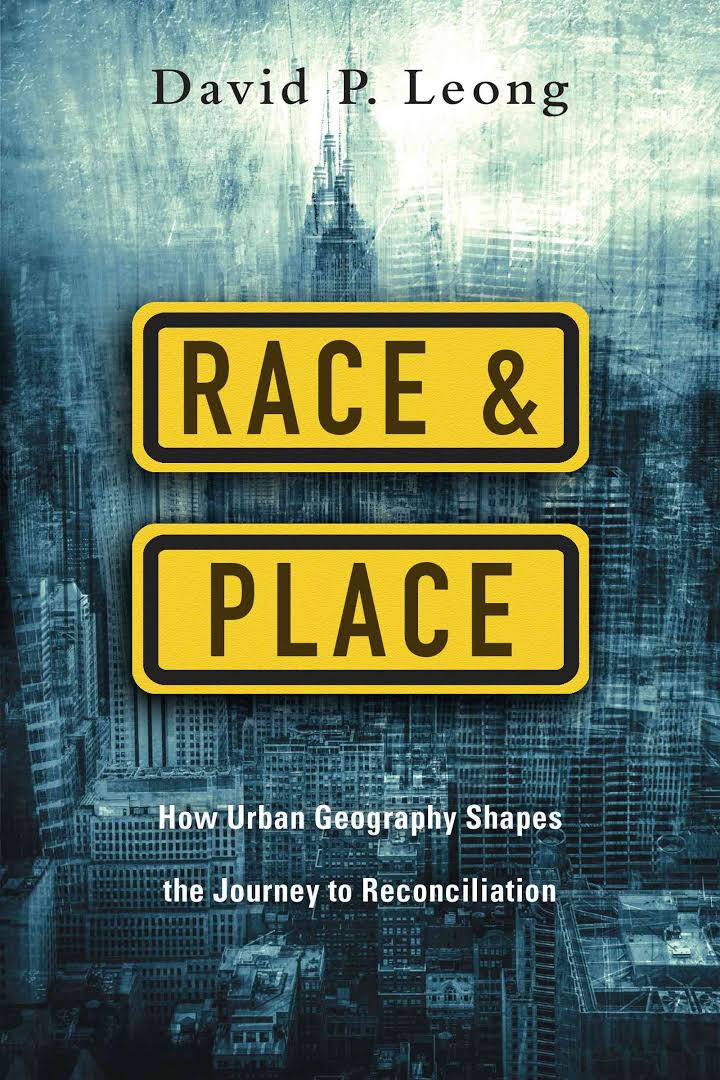 Race and Place: How Urban Geography Shapes the Journey to Reconciliation David P. Leong (IVP) $16.00 IVP can always be counted on to offer some of the most astute, insightful, and useful books on racial justice, multi-ethnic ministry, and authentic visions of reconciliation. They keep offering new ones, with new angles, fresh authors, important aspects of this big call to embody diversity and be effective in evangelical ministry in a culturally a racially diverse culture. So I trust them. A lot.
Race and Place: How Urban Geography Shapes the Journey to Reconciliation David P. Leong (IVP) $16.00 IVP can always be counted on to offer some of the most astute, insightful, and useful books on racial justice, multi-ethnic ministry, and authentic visions of reconciliation. They keep offering new ones, with new angles, fresh authors, important aspects of this big call to embody diversity and be effective in evangelical ministry in a culturally a racially diverse culture. So I trust them. A lot.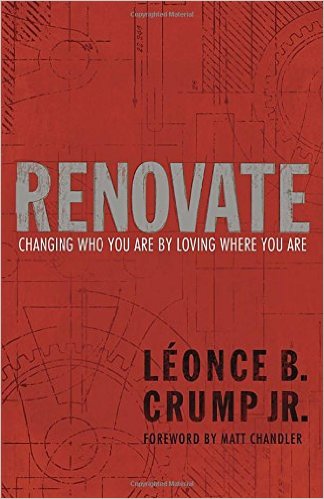 By the way, I have to insert here that there is an African American pastor and writer who cites both King and Wendell Berry named Leonce Crump, whose book Renovate: Changing Who You Are By Loving Where You Are [Multnomah Press; $14.95] is spectacularly interesting and immensely helpful. I reviewed it less than a year ago at BookNotes and am thrilled to share that he is speaking from the main stage at
By the way, I have to insert here that there is an African American pastor and writer who cites both King and Wendell Berry named Leonce Crump, whose book Renovate: Changing Who You Are By Loving Where You Are [Multnomah Press; $14.95] is spectacularly interesting and immensely helpful. I reviewed it less than a year ago at BookNotes and am thrilled to share that he is speaking from the main stage at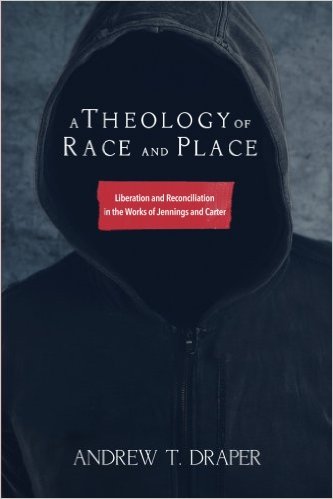 A Theology of Race and Place: Liberation and Reconciliation in the Work of Jennings and Carter Andrew T. Draper (Pickwick Publications) $40.00 I suppose I don’t have to say it, but this is a scholarly work, emerging from Andrew’s doctoral dissertation. Draper is a Visiting Professor of Theology at Taylor University (where he also directs the Honor’s Guild.) He is the founding senior pastor of Urban Light Community Church in Muncie Indiana, a Church of God congregation.
A Theology of Race and Place: Liberation and Reconciliation in the Work of Jennings and Carter Andrew T. Draper (Pickwick Publications) $40.00 I suppose I don’t have to say it, but this is a scholarly work, emerging from Andrew’s doctoral dissertation. Draper is a Visiting Professor of Theology at Taylor University (where he also directs the Honor’s Guild.) He is the founding senior pastor of Urban Light Community Church in Muncie Indiana, a Church of God congregation. 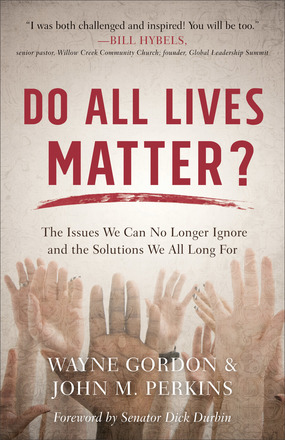 PRE-ORDER: Do All Lives Matter?: The Issues We Can No Longer Ignore and the Solutions We All Long For Wayne Gordon & John M. Perkins (Baker Books) $12.99 This title not yet released – due February 14, 201. Who hasn’t wanted to agree with the slogan and hashtag Black Lives Matter. After the long list of often unarmed black men shot, sometimes even in the back, by police, our hearts go out, our voices rise, insisting that this can’t be right. Made in God’s image, Black lives matter! And who among us wouldn’t say that Blue lives matter; of course. Police, as such, are not all at fault, and we want to affirm their bravery and service; especially after the sniper shooting of police in Dallas last summer. Of course.
PRE-ORDER: Do All Lives Matter?: The Issues We Can No Longer Ignore and the Solutions We All Long For Wayne Gordon & John M. Perkins (Baker Books) $12.99 This title not yet released – due February 14, 201. Who hasn’t wanted to agree with the slogan and hashtag Black Lives Matter. After the long list of often unarmed black men shot, sometimes even in the back, by police, our hearts go out, our voices rise, insisting that this can’t be right. Made in God’s image, Black lives matter! And who among us wouldn’t say that Blue lives matter; of course. Police, as such, are not all at fault, and we want to affirm their bravery and service; especially after the sniper shooting of police in Dallas last summer. Of course.